

91 Top Spanish Travel Phrases & Words for Travelers
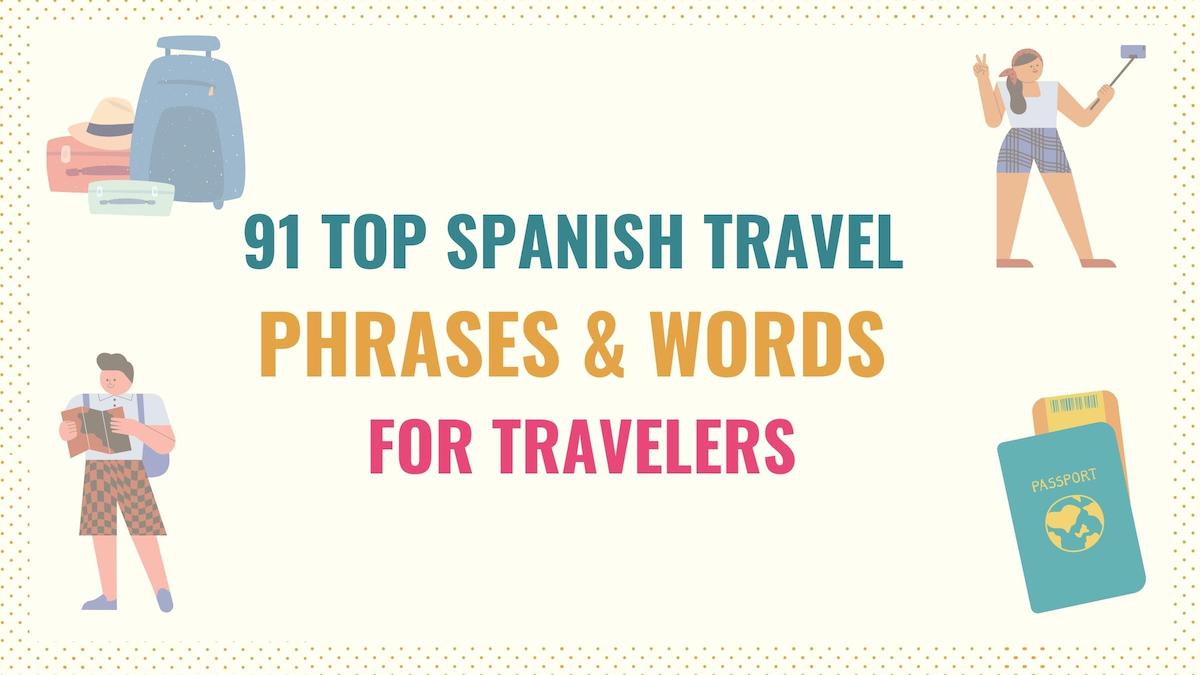
Are you planning a well-deserved vacation? Is your destination a Spanish-speaking country? If so, you may want to take the time to learn some essential Spanish travel phrases that can help you communicate.
There’s no doubt that English is a widely spoken language . But if you travel to a Spanish-speaking country, your chances of randomly finding someone who speaks enough English to help you aren’t that high. Trust me, I have seen enough confused tourists to know.
To avoid any communication issues, I’ve built a list of 91 crucial Spanish travel phrases that will help you get by on your vacation. Are you wondering how on earth you are supposed to pronounce them if you don’t speak Spanish? Fear not! I’ve also included the audio recordings to help you overcome this issue.
Here is a quick overview of the situations we’ll cover and the resources you’ll find in this guide:
- Common verbs for travel
- Phrases & Vocabulary for the Airport
- Phrases to Use in a Restaurant
- Phrases & Words to Ask for Directions
- Phrases to Use at a Hotel
- Downloadable PDF
Basic Spanish Travel Phrases, Questions & Words
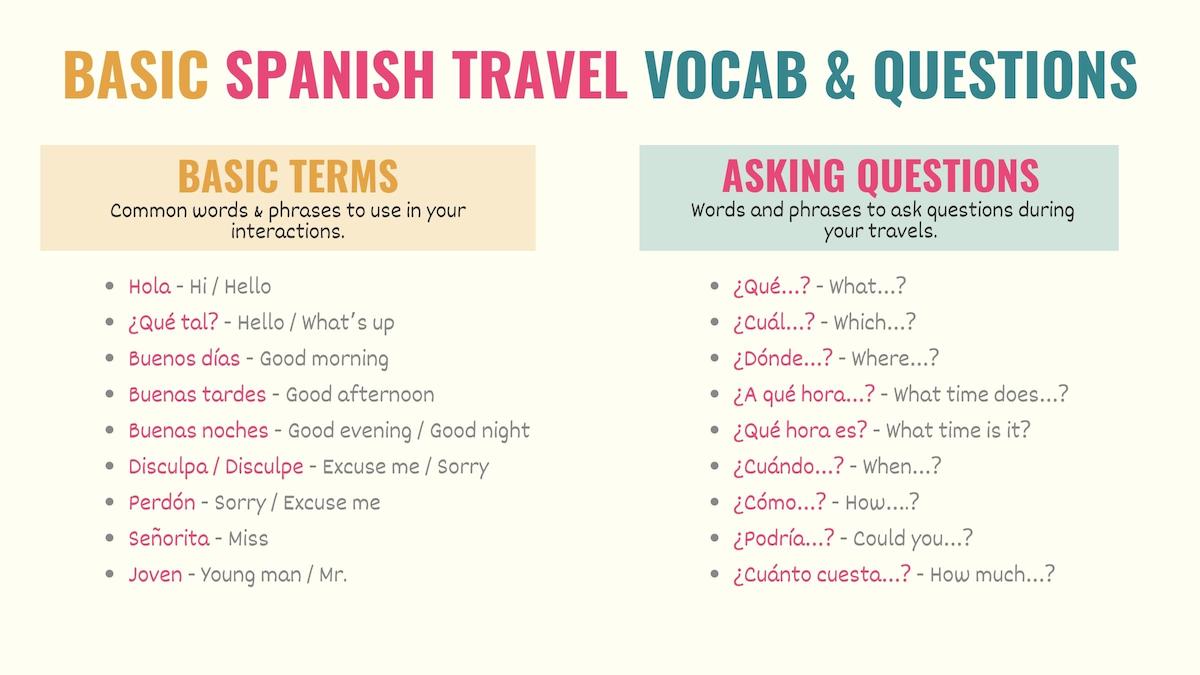
When it comes to Spanish vocabulary for travelers, there are some essential words that you’ll use more frequently or that can help you sound more polite when addressing a native speaker. Let’s start with some greetings and expressions to catch a person’s attention.
As you’ll see in the examples I’ve provided, these words are usually placed at the beginning of the sentence.
- Hola – Hi / Hello
- ¿Qué tal? – Hello / What’s up
- Buenos días – Good morning
- Buenas tardes – Good afternoon
- Buenas noches – Good evening / Good night
- Disculpa / Disculpe – Excuse me / Sorry
- Perdón – Sorry / Excuse me
- Señorita – Miss
- Joven – Young man / Mr.
The following question words and expressions can also be useful when you travel:
- ¿Qué…? – What…?
- ¿ Cuál …? – Which…?
- ¿Dónde…? – Where…?
- ¿ A qué hora …? – What time does…?
- ¿Qué hora es? – What time is it?
- ¿Cuándo…? – When…?
- ¿Cómo…? – How….?
- ¿Podría…? – Could you…?
- ¿Cuánto cuesta…? – How much…?
Hola , ¿ cuánto cuesta el llavero? Hi , how much is the keychain?
Disculpe , ¿ dónde está la catedral? Excuse me , where is the cathedral?
Señorita, ¿ podría darme otro formulario? Miss, could you give me another form?
Buenos días , ¿ a qué hora abre el museo? Good morning, what time does the museum open?
Basic Spanish verbs for traveling
Many simple Spanish travel phrases are built with the verbs querer , gustar and poder , which we use to make requests. These are the most common forms that you’ll need:
- Quiero … – I want…
- Quisiera … – I would like…
- Me gustaría … I would like…
- ¿Puede…? – Can you…?
- Tiene / Tengo … – Has / Have
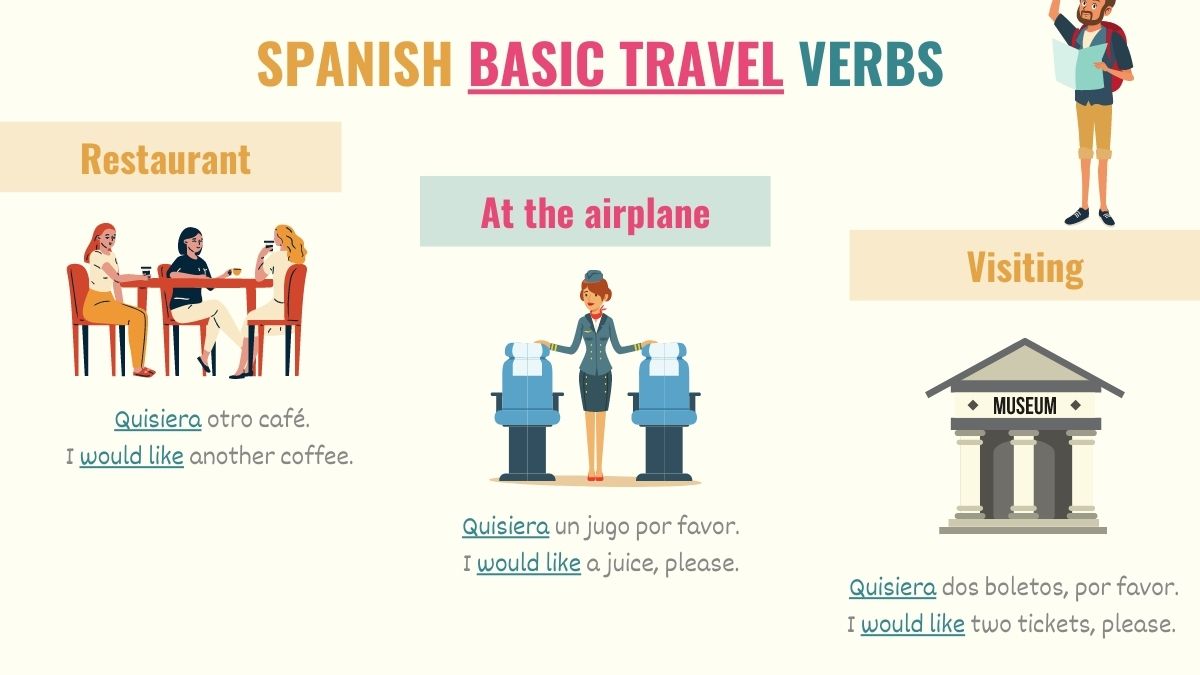
As you can imagine, these expressions are very versatile because they can be combined with different words for tourists:
Quiero dos boletos. I want two tickets.
No tengo cambio. I don’t have change.
Me gustaría una habitación con vistas al mar. I would like a room with an ocean view.
Quisiera visitar el museo de artes. I would like to visit the art museum.
¿ Puede decirme dónde está la parada? Can you tell me where the bus stop is?
Disculpe, ¿ podría ayudarme? Excuse me, could you help me?
Travel Phrases & Spanish Vocabulary for the Airport
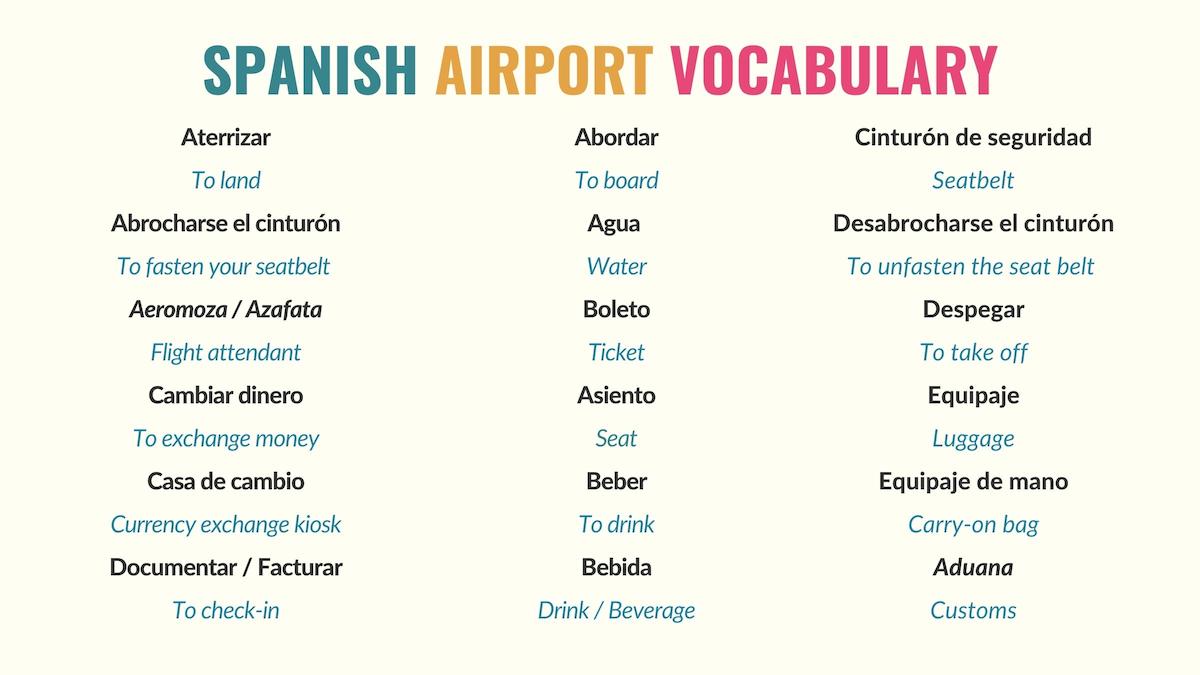
You’re likely to find more than one person who speaks English at the airport. However, this is an excellent opportunity to start practicing your Spanish. Here are some common phrases that you’re probably going to encounter or use while at the airport:
- ¿Va a documentar su maleta? – Are you going to check your bag?
- ¿Me permite su pasaporte? – Can I have your passport?
- Por favor, abroche su cinturón – Please, fasten your seatbelt
- ¿Desea algo de beber? – Would you like something to drink?
- Por favor, regrese a su asiento – Please, go back to your seat
- Llene este formulario, por favor – Please, fill in this form
- ¿Cuál es el motivo de su visita? – What’s the reason for your visit?
- ¿Dónde puedo cambiar dinero? – Where can I exchange money?
- ¿Dónde están los baños? – Where are the restrooms?
In addition to these phrases, here are some words that may be useful in this situation. Remember that you can combine the words below with the expressions and questions you learned in the previous section.
[Basic Spanish expression] + [airport vocabulary]
Quisiera un asiento en el pasillo . I would like an aisle seat .
Disculpe, ¿a qué hora aterrizamos ? Excuse me, what time do we land ?
¿Podría ayudarme? Mi equipaje está perdido . Could you help me? My luggage is missing .
¿Cuántas maletas va a documentar ? How many bags are you going to check ?
Buenos días, ¿tiene café ? Good morning, do you have coffee ?
Spanish Phrases for Tourists in a Restaurant
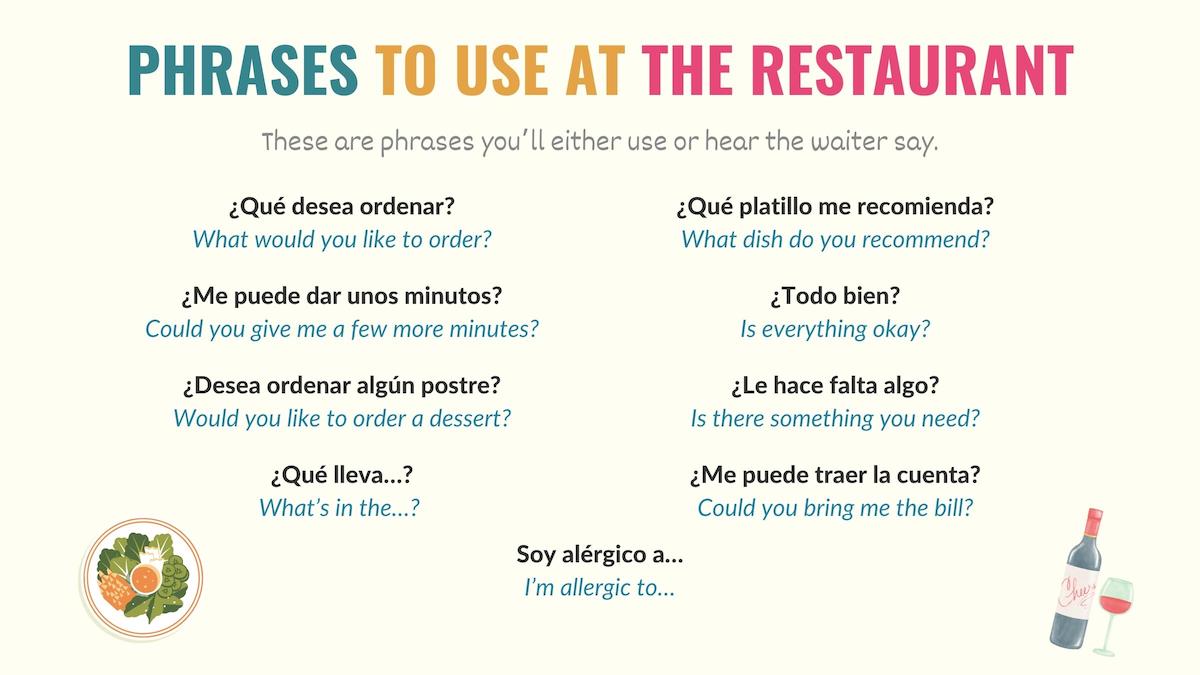
As a tourist, you’re probably going to spend some time trying different foods at restaurants. Here are some common phrases you can use and are likely to hear at a restaurant.
- ¿Qué desea ordenar? – What would you like to order?
- ¿Me puede dar unos minutos? – Could you give me a few more minutes?
- ¿Desea ordenar algún postre? – Would you like to order a dessert?
- ¿Qué lleva…? – What’s in the…?
- ¿Qué platillo me recomienda? – What dish do you recommend?
- ¿Todo bien? – Is everything okay?
- ¿Le hace falta algo? – Is there something you need?
- ¿Me puede traer la cuenta? – Could you bring me the bill?
- Soy alérgico a … – I’m allergic to…
Here are other terms that can be useful in this type of situations:
Joven, ¿cuál es la especialidad de la casa? Young man, what’s the specialty of the house?
Quisiera ordenar dos postres, por favor. I would like to order two desserts, please.
Disculpe, ¿qué platillo me recomienda? Excuse me, what dish would you recommend to me?
¿Me podría traer un cuchillo y un vaso de agua? Could you bring me a knife and a glass of water?
Take Note: If you want to learn more about this topic, I recommend you check this guide on ordering food in Spanish .
Spanish for Visiting the City & Asking for Directions
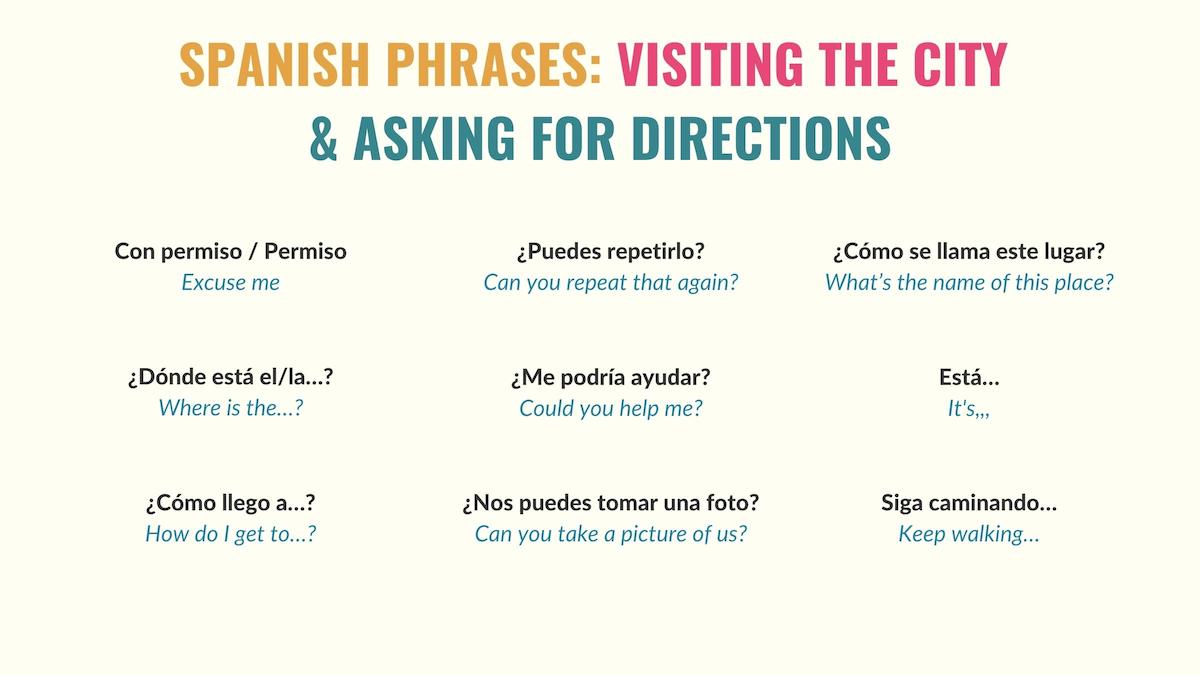
One of the biggest challenges you may face is communicating with native speakers when visiting the city or a tourist attraction. Here are some of the most common Spanish phrases for travel that you may need in this situation:
- Con permiso / Permiso – Excuse me
- ¿Dónde está el/la…? – Where is the…?
- ¿Cómo llego a…? – How do I get to…?
- Estoy buscando… – I’m looking for
- No hablo mucho español – I don’t speak Spanish very well
- ¿Hay algún/alguna… por aquí? – Is there…around here?
- ¿Hablas inglés? – Do you speak English?
- ¿ Puedes repetirlo? – Can you repeat that again?
- ¿Me podría ayudar? – Could you help me?
- ¿ Nos puedes tomar una foto? – Can you take a picture of us?
- ¿ Nos puedes tomar otra ? – Can you take another one of us?
- ¿ Dónde puedo tomar…? – Where can I take…?
- ¿Por aquí pasa el camión…? – Is this place on the bus route? / Does the bus come by here?
- ¿ Cómo se llama este lugar? – What’s the name of this place?
Take Note: Con permiso is a polite way to ask people to let you through. So, we use this phrase in crowded places or when walking on the street.
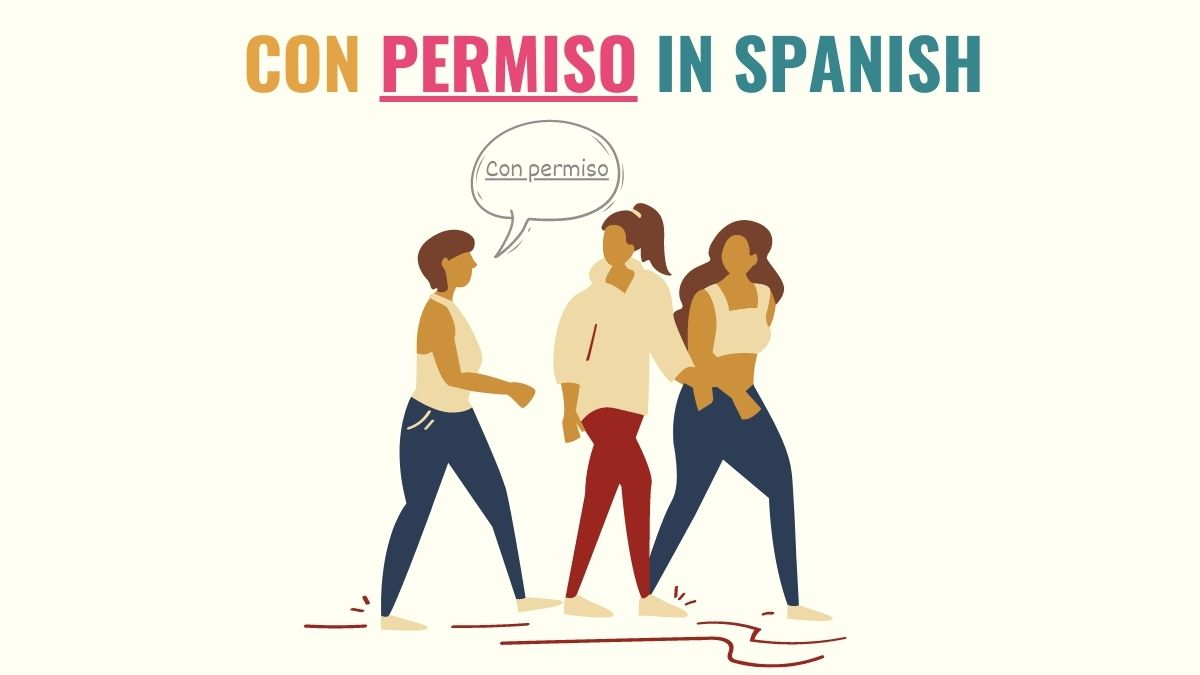
On the other hand, people are likely to give you the following answers:
- Está… – It’s…
- Siga caminando …- Keep walking…
- De vuelta a/en – Turn…
- Siga derecho – Go straight…
- Camine – Walk…
Additionally, here are some basic words that you can use or might hear when visiting the city:
Here are some examples of how to use these Spanish words and expressions:
Disculpe, ¿ dónde está la estación de tren? Excuse me, where is the train station?
Buenas tardes, estoy buscando el museo. Good afternoon, I’m looking for the museum.
Camine dos cuadras y dé vuelta a la izquierda. Walk two blocks and turn left.
Perdón, ¿ hay algún restaurante por aquí? Excuse me, is there a restaurant around here?
Hola, ¿ me podría ayudar ? Quiero ir al museo. Hi, could you help me ? I want to go to the museum.
Spanish Phrases for Hotels & Accommodations
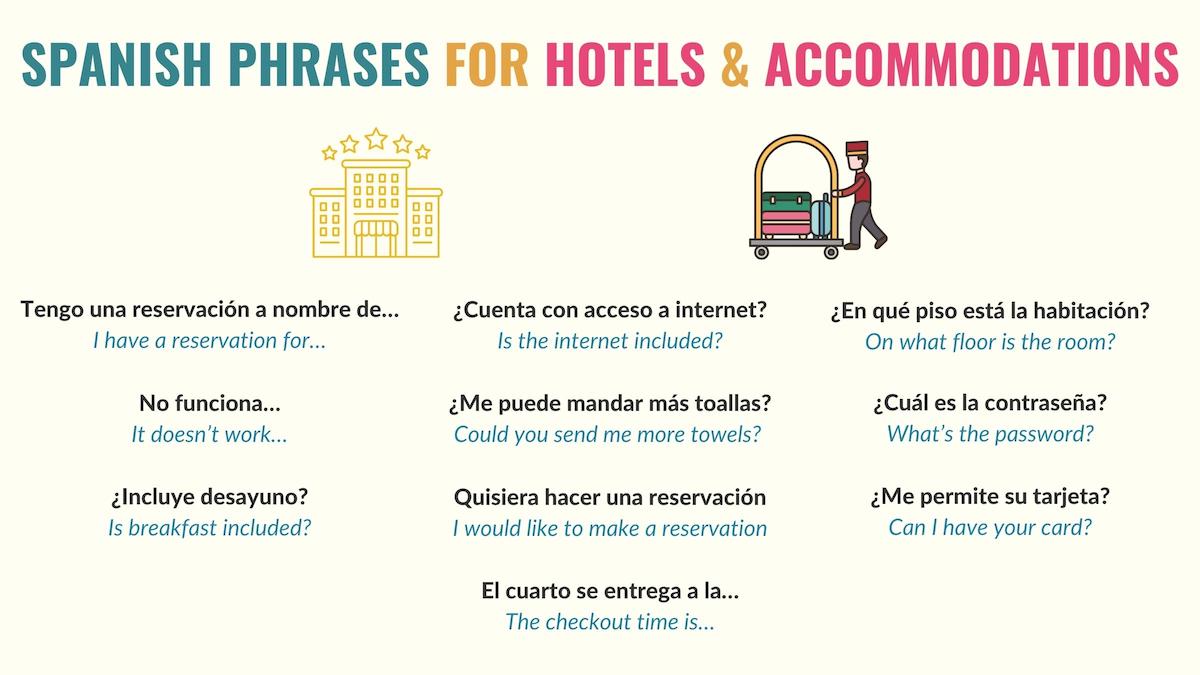
Although nowadays it’s easier to make reservations before your trip, there may be some situations where you need to speak Spanish to communicate with staff and others in your hotel. Here are some essential phrases applicable to this context:
- Tengo una reservación a nombre de … – I have a reservation for…
- Quisiera hacer una reservación – I would like to make a reservation.
- No funciona … – It doesn’t work…
- ¿Me puede mandar más toallas? – Could you send me more towels?
- ¿Incluye desayuno? – Is breakfast included?
- ¿ Cuenta con acceso a internet? – Is the internet included?
- ¿Cuál es la contraseña? – What’s the password?
- ¿En qué piso está la habitación? – On what floor is the room?
- ¿Me permite su tarjeta? – Can I have your card?
- El cuarto se entrega a la … – The checkout time is…
As for vocabulary, these are some of the words that you may want to keep in mind:
Señorita, ¿dónde está el elevador ? Miss, where is the elevator ?
Buenos días, la regadera no funciona . Good morning, the shower doesn’t work .
¿A qué hora termina el servicio a la habitación ? What time does room service end?
Spanish Expressions for Souvenir Shopping
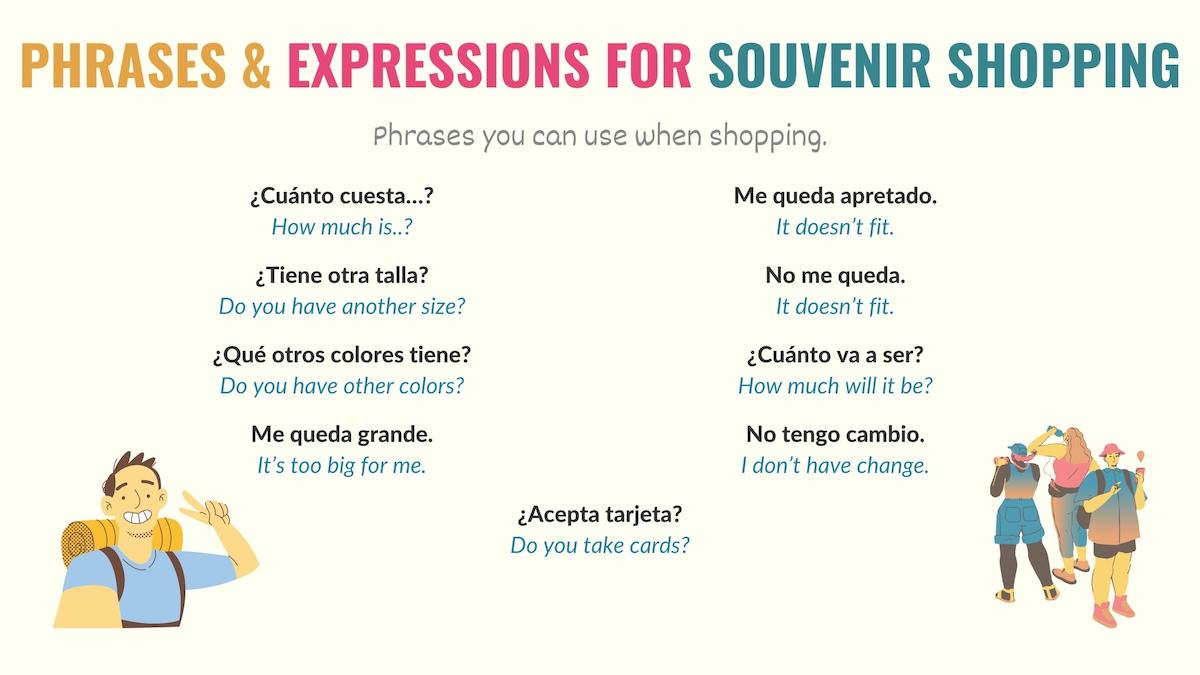
Even if you’re not a big spender, it’s likely that at some point you may want to do some shopping. These are the key expressions that you need in this situation:
- ¿Cuánto cuesta…? – How much is..?
- ¿ Tiene otra talla? – Do you have another size?
- ¿Qué otros colores tiene? – Do you have other colors?
- Me queda grande – It’s too big for me.
- Me queda apretado – It doesn’t fit.
- No me queda – It doesn’t fit.
- ¿Cuánto va a ser? – How much will it be?
- No tengo cambio – I don’t have change.
- ¿Acepta tarjeta? – Do you take cards?
On the other hand, these are some of the expressions that the clerk may use with you:
- ¿En qué le puedo ayudar? – How can I help you?
- Pregunte/Vea sin compromiso – You can ask/see, without any obligation.
- ¿Buscaba algo en especial? – Are you looking for anything in particular?
- ¿En qué talla? – What size?
- ¿Cómo le quedó? – How does it fit?
- ¿Buscaba algún color en especial? – Were you looking for a particular color?
- ¿Quiere que le muestre algo? – Would you like me to show you something?
- Es el último que me queda – It’s the last one.
- ¿Tiene un billete más pequeño? – Do you have a smaller bill?
- ¿Qué tamaño buscaba? – What size were you looking for?
- Aquí tiene – Here you go.
As for vocabulary, here are some common objects that you may find during your trip:

Check the examples below. Notice that you can combine this specific vocabulary with the basic words and questions you learned at the beginning of this article.
¿Tiene dulces típicos ? Do you have traditional candies ?
¿Podría darme tres llaveros ? Can you give me three keychains ?
Final Points: Spanish for Travelers
Many tourists visiting Spanish-speaking countries face communication difficulties. Let’s face it, there might be some people that speak English and will be able to help you. But chances are that, at some point, you’ll need to use some Spanish. When in Rome, do as the Romans do, right?
To help you with this, I’ve prepared this guide for tourists with basic expressions, questions and words that you’ll use in most traveling situations. Just remember that:
- Many of these travel phrases are built with ‘ querer’, ‘gustar’, ‘poder’ and ‘tener’ .
- Questioning words can take you pretty far if you combine them with the appropriate vocabulary.
- You use greetings and words to address people to sound more polite.
Hopefully, this guide will help you keep basic conversations. ¡Buena suerte and (disfruta) enjoy your vacation!
Spanish Resources for Tourists & Travelers
To make your trip as enjoyable as possible and get the most out of speaking Spanish, I recommend checking out the free resources below. Here’s my pro tip: Quickly read them and write down a “script” of the most common Spanish phrases, words and expression you’ll need to use while you travel.
Download the PDF with Spanish Phrases & Vocabulary for Traveling
Learning Spanish can be an incredible experience. But it can also be challenging at times, especially when you’re visiting a new place. I’ve created a free PDF for this guide which you can download with the key Spanish phrases, expressions and words you need to start speaking the language while still enjoying your vacation.
Related Guides & Spanish Vocabulary
If you’re traveling to Mexico or another Latin American, Spanish-speaking country then this guide will show you all the vocabulary and phrases you need to interact and order your food at a restaurant .
One of the best ways to get ready for a day of speaking a foreign language is by achieving an easy win as soon as possible at the start of the day. Here are different expressions that native speakers use to say ‘good morning’ in Spanish , which is easy to incorporate into your conversations as well as common Spanish greetings and farewells .
How to Ask for & Reserve a Hotel Room in Spanish : In this article you’ll find different questions and phrases that you and the hotel staff are likely to use when booking a hotel room.
Daniela Sanchez
¡Hola! Soy Daniela Sanchez, I've been studying Spanish professionally as well as teaching it in Mexico and online for over 10 years. I’ve taught Spanish to a wide array of foreigners from many backgrounds. Over the years, I've made it my mission to work hard on refining many challenging to understand grammar topics to make my students' learning experiences easier, faster and more enjoyable. Read More About Me
Recent Posts
Cuál vs Qué: Key Differences You Need to Know
Cuál vs qué is a topic that often confuses Spanish learners. Qué inquires about definitions, time, explanations, or identifies something. It’s the direct translation of ‘what’. Cuál means...
Salir vs Dejar vs Irse: Key Usage Differences
Salir vs dejar vs irse confuse learners because they all mean ‘to leave’, but aren’t interchangeable. Irse conveys and emphasizes that someone is leaving a place. Dejar expresses that someone...
Pin It on Pinterest
You are using an outdated browser. Please upgrade your browser or activate Google Chrome Frame to improve your experience.
Important Spanish Travel Phrases (with Downloadable PDF)
Have you been dreaming about your upcoming vacation to Spain?
Eagerly awaiting your backpacking trek through South America?
Whatever the case, your trip to any Spanish-speaking country will be so much more fun and meaningful if you can communicate with locals .
But what kind of Spanish travel phrases do you even need to know?
Below are the essentials— the most common Spanish phrases for travel to help you upgrade your trip from “goodw” to “great.”
1. Basic Spanish Greetings and Phrases
2. basic spanish phrases for everyday use, 3. asking for directions in spanish, 4. spanish travel phrases for the hotel, 5. spanish travel phrases for the restaurant, 6. spanish phrases for the airport and ticket offices, 7. medical emergencies in spanish, 8. spanish phrases for having a bit of fun, and one more thing….
Download: This blog post is available as a convenient and portable PDF that you can take anywhere. Click here to get a copy. (Download)

Spanish-speaking countries are generally very polite and you must always be courteous and say “hello” and “how are you?”
Don’t worry about making mistakes. Most people will try their utmost to understand you and to make sure you understand them. Try your best and they will be happy to reciprocate!
- Buenos días — Good morning
- Buenas tardes — Good afternoon
- Buenas noches — Good evening
- ¿Cómo te llamas? — What’s your name? (informal)
- ¿Cómo se llama? — What’s your name? (formal)
- Me llamo… — My name is…
- Mucho gusto — Nice to meet you
- ¿Cómo estás? — How are you? (informal)
- ¿Cómo está? — How are you? (formal)
- Bien, gracias — Good, thank you
- Por favor — Please
- Gracias — Thank you
- Perdón — S orry
- ¿Habla inglés? — Do you speak English?
- No hablo español — I don’t speak Spanish
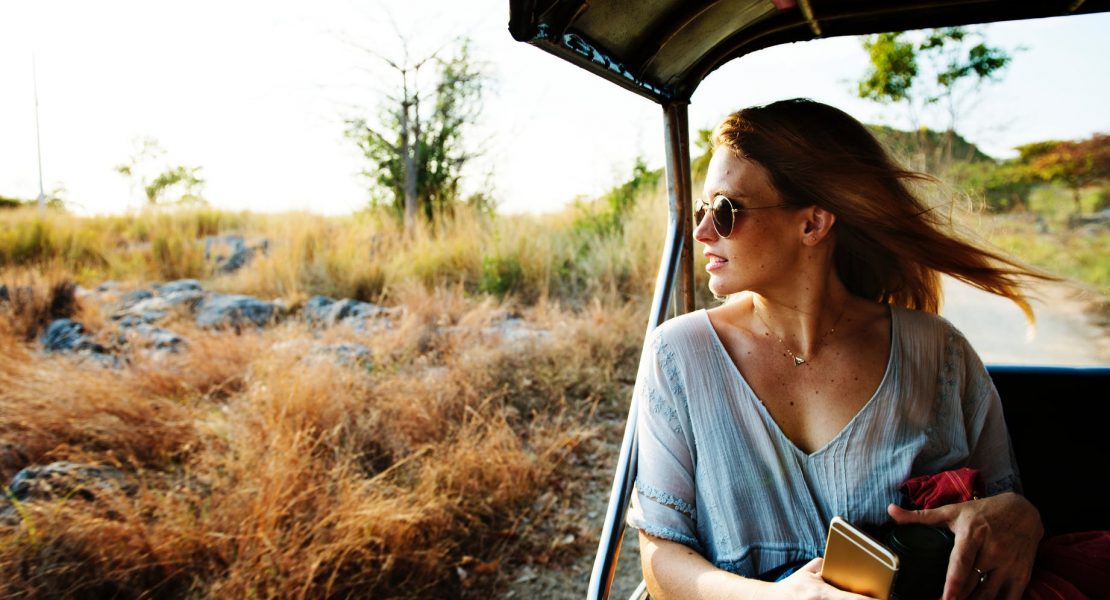
You can go far with some very easy-to-remember travel phrases and words.
You’ll likely use “I want,” “I like” and “Do you have…?” quite often. If you don’t know the noun, you can simply point at the object or show a photo.
You can also say a lot of things with very simple verbs we’re about to introduce. It may not be the sophisticated way you speak in English, but you will be understood.
- Quiero / No quiero — I want / I don’t want
- Me gustaría ; Quisiera — I would like (more polite)
- ¿Dónde está…? — Where is…? Since dónde ends in e and está starts with one, these two words flow into each other, almost like they were a single word.
- ¿Cuánto cuesta? — How much does it cost?
- ¿Qué hora es? — What time is it?
- ¿Tiene…? — Do you have…?
- Tengo / No tengo — I have / I don’t have
- Entiendo / No entiendo — I understand / I don’t understand
- ¿Entiende? — Do you understand?
- Quiero un boleto — I want a ticket
…un hotel — …a hotel
…un taxi — …a taxi
- No funciona — It doesn’t work
That last one is an all-purpose word . You can use this for a million circumstances! Just point at the shower or whatever and say “ ¡No funciona!”
What we’ve seen so far is basic survival Spanish, so even if you can only remember these words and phrases, they’ll still help a great deal.
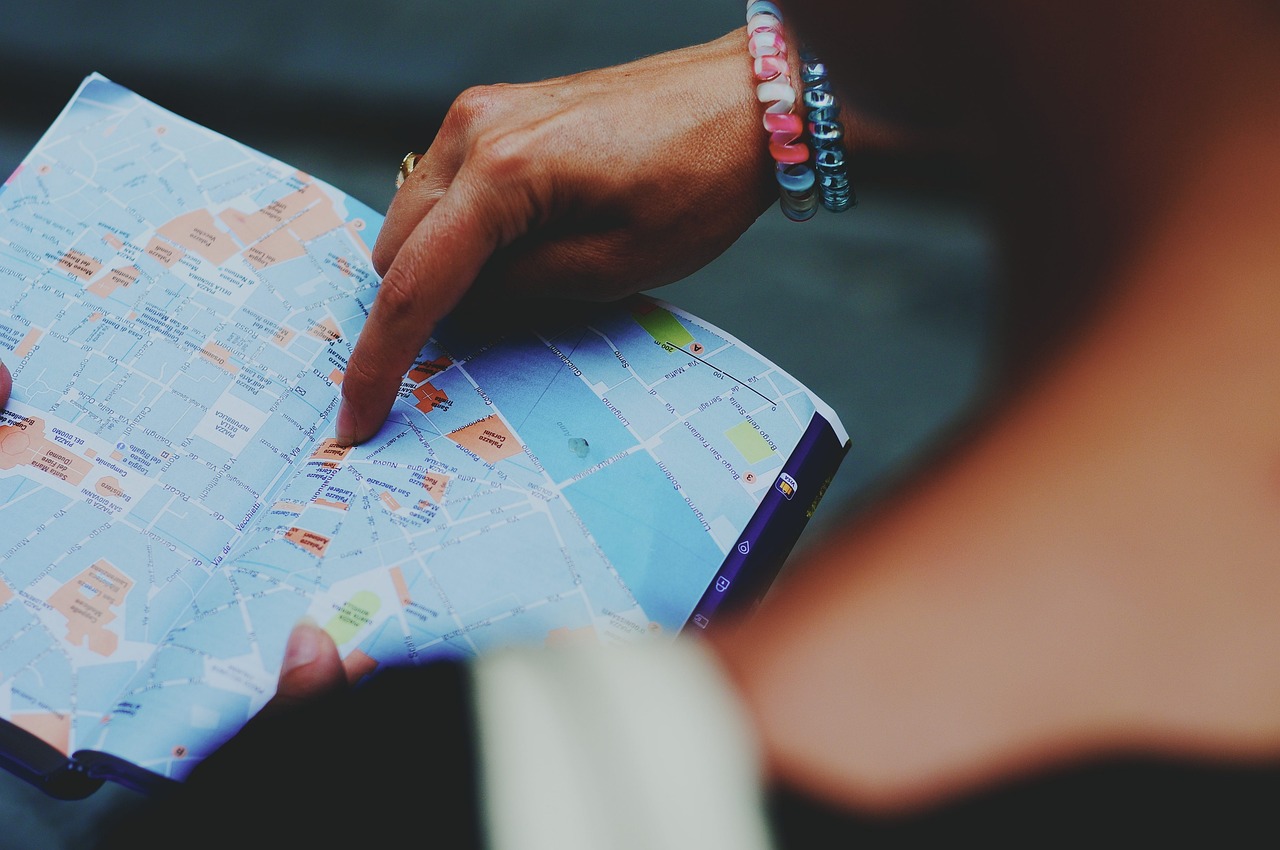
If you get a bit lost or unsure of how to get somewhere, “¿dónde está?” is the simplest way of asking for directions. Here are a few more phrases, locations and other directions in Spanish that will be helpful on your trip:
- ¿Dónde está la estación de ferrocarril? — Where is the railway station?
- ¿Dónde hay un restaurante? — Where is a restaurant?
- Un tren — A train
- La calle… — The street…
- Un banco — A bank
- El baño — The bathroom
- Busco un hotel — I’m looking for a hotel
- Necesito un hotel — I need a hotel
…un cuarto — …a room
…un cuarto con baño — …a room with a bathroom
- Thousands of learner friendly videos (especially beginners)
- Handpicked, organized, and annotated by FluentU's experts
- Integrated into courses for beginners

- ¿Dónde hay una casa de cambio? — Where is the currency exchange?
- ¿Dónde está el banco? — Where is the bank?
- Dinero — Money
Once you have asked a question, someone will answer you in Spanish. Listen for these key words:
- A la derecha — To the right
- A la izquierda — To the left
- Derecho — Straight ahead
- En la esquina — At the corner
- A una cuadra — In one block
…dos cuadras — …two blocks
…tres cuadras — …three blocks
…cuatro cuadras — …four blocks
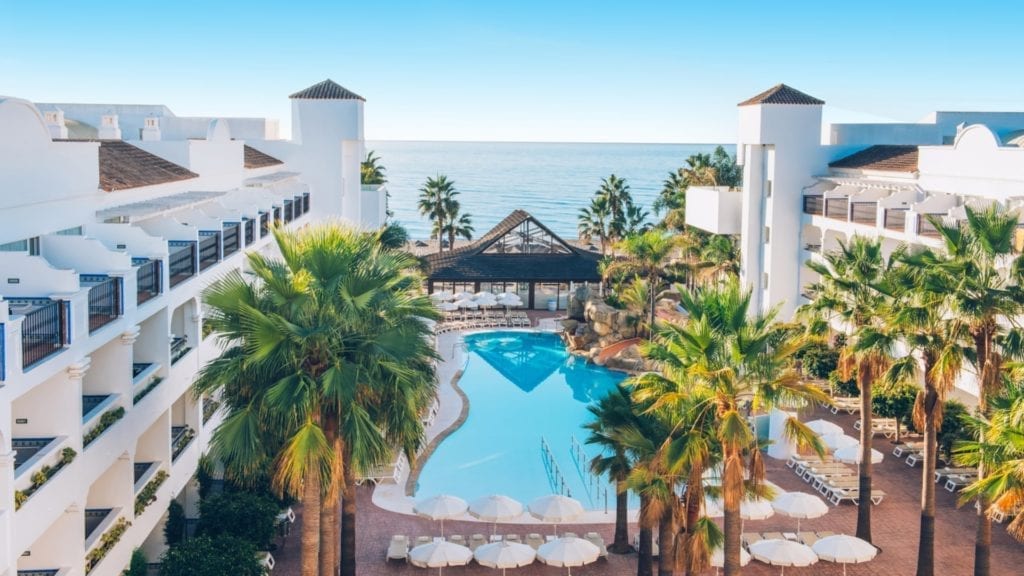
You’ve finally found your hotel and you’re ready to check in!
Staff at international chains will probably be able to communicate in English with you, but these phrases and questions will come in handy for local hotels, hostels, bed and breakfasts, etc.
These will also be helpful when you need to make adjustments to your reservation or are curious about other hotel amenities.
- Tengo una reserva a nombre de… — I have a reservation under the name of…
- Estadía de tres noches — Three-night stay
- Una habitación para dos personas — A room for two people
- Una habitación con una cama de matrimonio — A room with a double bed As you can see, habitación is a synonym of cuarto . You can use either term when booking a room.
- ¿Dónde está la piscina? — Where is the pool?
- ¿A qué hora es el desayuno? — What time is breakfast?
- ¿Puedo solicitar una salida tardía? — Can I request a late check-out?
- ¿Tiene servicio de habitaciones? — Do you have room service?
- ¿ Cuál es la contraseña de WiFi ? — What is the WiFi password?
- Una cama supletoria — An extra bed
- Vista al mar — Ocean view
- Vista a la ciudad — City view
- Un balcón — A balcony
- La terraza — The rooftop / terrace
- El gimnasio — The gym
- La playa — The beach
- El vestíbulo — The lobby

Probably the most useful travel phrases you will need are the ones you would use in a restaurant. Let’s go over some basic restaurant vocabulary in Spanish :
Ask for anything by using quiero or quisiera — “I want” or “I would like.” And remember to say por favor and gracias!
- Interactive subtitles: click any word to see detailed examples and explanations
- Slow down or loop the tricky parts
- Show or hide subtitles
- Review words with our powerful learning engine

- Una mesa — A table
- Una mesa para dos — A table for two
…tres — …three
…cuatro — …four
- Un menú / Una carta — A menu
- Sopa — Soup
- Ensalada — Salad
- Hamburguesa — Hamburger
- Con salsa de tomate — With ketchup
…mostaza — …mustard
…tomate — …tomato
…lechuga — …lettuce
- Una entrada — An appetizer
- Un postre — Dessert
- Una bebida — A drink
- Agua — Water
- Vino tinto / Vino blanco — Red wine / White wine
- Cerveza — Beer
- Un café — Coffee
- ¡Señor! / ¡Señorita! — Mister / Miss (when calling a waiter or waitress)
- La cuenta — The check
- Una tarjeta de crédito — A credit card
- Una tarjeta de débito — A debit card
- Pagar en efectivo — Pay in cash
Note that many places in smaller towns still don’t take credit cards , so make sure you have enough cash with you.
You can ask if a place takes credit cards by using the noun with a question. For example, you can pull out your credit card and say: ¿Tarjeta de crédito? They will understand.
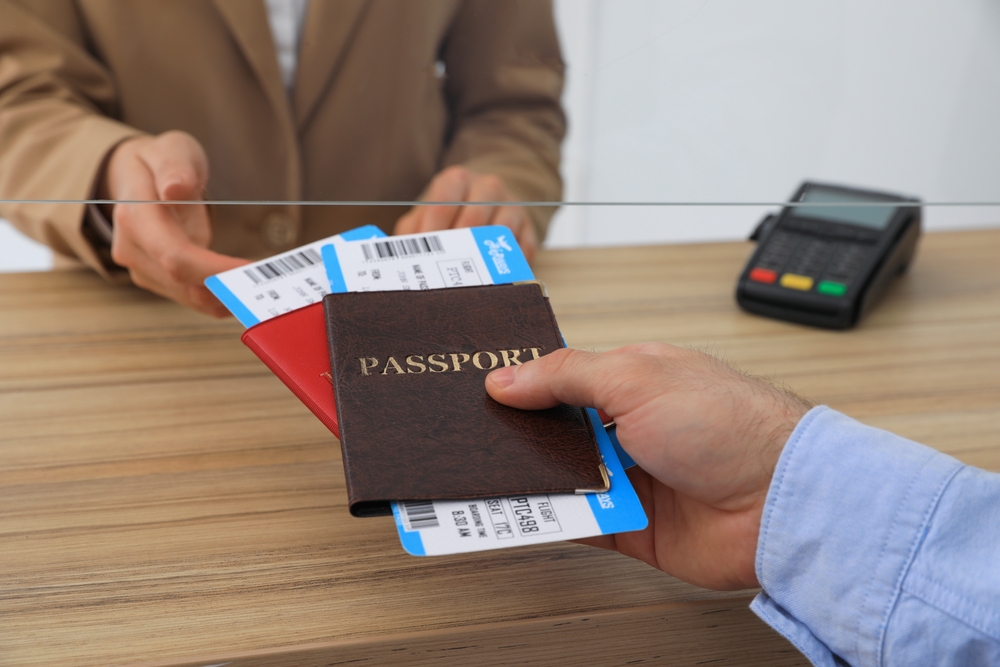
It’s time to soak in some culture ! Whether you want to go see a show, check out an art exhibit, watch a local movie or visit the next town (or country) over, you’ll need to buy some sort of ticket.
We’ll start with some airport-specific vocabulary —bearing in mind that many of these phrases are versatile and can be used in various situations—followed by more general vocabulary.
- Learn words in the context of sentences
- Swipe left or right to see more examples from other videos
- Go beyond just a superficial understanding

- Su pasaporte, por favor — Your passport, please
- Quisiera cambiar mi reserva — I would like to change my reservation
- ¿Podría elegir mi asiento? — Could I choose my seat?
- Quisiera cambiar mi asiento — I would like to change my seat
- Este es mi equipaje de mano — This is my carry-on luggage
- ¿Se ha cancelado el vuelo? — Has the flight been canceled?
- ¿Dónde está la terminal internacional? — Where is the international terminal?
- ¿Dónde está la puerta de embarque? — Where is the boarding gate?
- ¿A qué hora es el embarque? — What time is boarding?
Earlier we defined entrada as an “appetizer.” Entrada has multiple meanings related to “start” or “entry,” so you can also use it to say “ticket.”
- ¿Cuánto cuesta una entrada? — How much does a ticket cost?
- Dos boletos de ida y vuelta — Two roundtrip tickets
- ¿ Tiene un pase de un día ? — Do you have a one-day pass?
- ¿A qué hora sale el próximo tren ? — What time does the next train leave?
- ¿De qué plataforma sale? — Which platform does it leave from?
- ¿Qué puerta? — Which gate?
For more specific situations, here are some words and phrases you might need when purchasing tickets:
- El espectáculo — The show / performance
- El teatro — The theater
- La exposición — The exhibit
- El cine — The cinema
- Una película — A movie
- Un vuelo — A flight
- Viaje de ida — One-way trip
- Viaje de ida y vuelta — Return trip / round trip
- El asiento de pasillo — The aisle seat
- El asiento de ventanilla — The window seat
- La primera fila — The first row
La segunda fila — The second row
La tercera fila — The third row
La cuarta fila — The fourth row
Also, as you’ve likely noticed, for anything dealing with money or quantities, you’ll want to be familiar with numbers in Spanish .
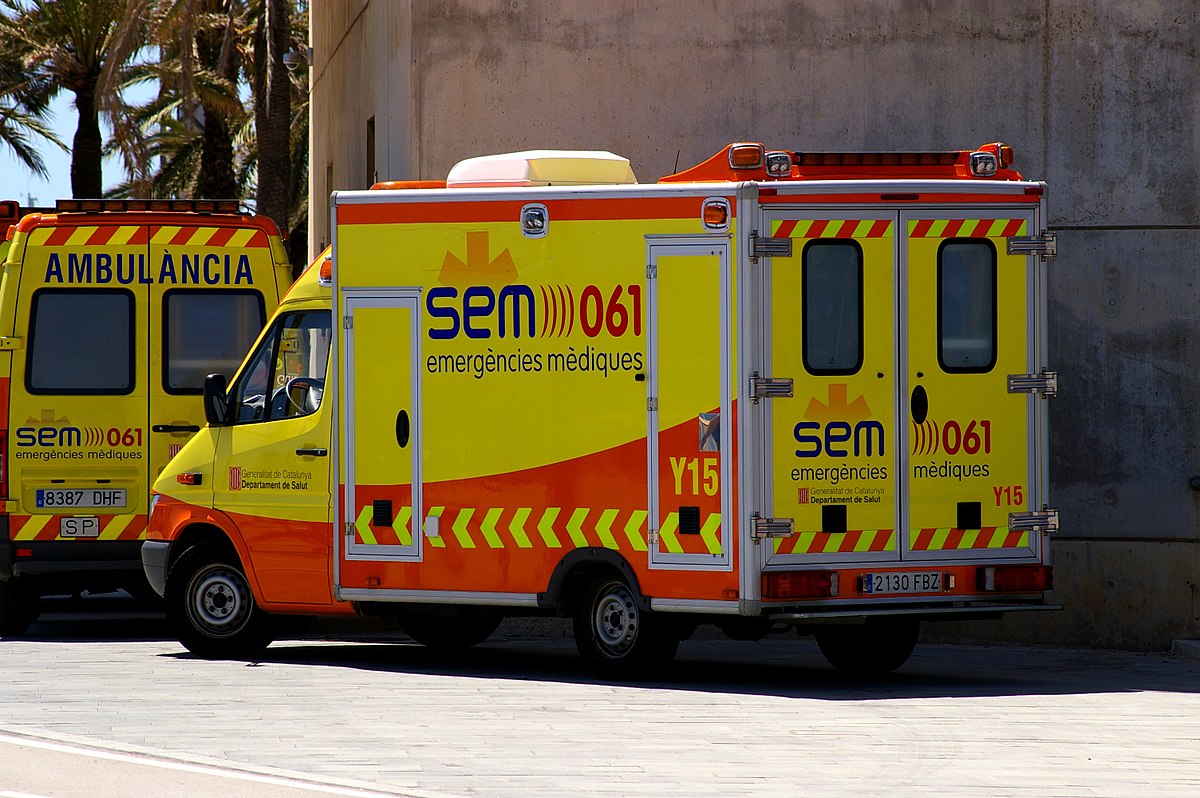
A smart traveler always comes prepared with some emergency over-the-counter meds. After all, you never know what could happen when you’re overseas.
But when those aren’t enough, these are the phrases that will help with your health-related concerns when in a Spanish-speaking country:
- ¿Dónde está la farmacia? — Where is the pharmacy?
- ¿Dónde está el hospital más cercano? — Where is the nearest hospital?
- Seguro de salud internacional — International health insurance
- No me siento bien — I feel sick / I don’t feel well
- ¿El doctor habla inglés? — Does the doctor speak English?
- ¿Necesito una receta? — Do I need a prescription?
- ¿Qué medicina necesito? — What medicine do I need?
- La cita médica — Doctor’s appointment
- La cita de seguimiento — Follow-up appointment
If you need help explaining your symptoms, these terms will help you out. With the exception of the last phrase, start off by saying tengo , followed by any of the below:
- Un resfriado — A cold
- Dolor de garganta — Sore throat
- Tos — Cough
- Fiebre — Fever
- Dolor de cabeza — Headache
- Dolor de estómago — Stomachache
- Dolor de espalda — Backache
- Resaca — Hangover
- Me gotea la nariz — I have a runny nose

Of course, a trip to a Spanish-speaking country wouldn’t be complete without a little ¡fiesta! (carnival; party). If you’re keen to hit the town, here are a few phrases to help you get your groove on.
- ¡Salud! — Cheers!
- ¿Hay algún bar por aquí? — Is there a bar around here?
- ¿Dónde están las discotecas? — Where are the clubs?
- ¿A qué hora abren las discotecas? — What time do the clubs open?
- ¿Me recomienda un lugar para bailar? — Can you recommend me a place to dance?
- ¿Quieres bailar conmigo? — Do you want to dance with me?
- ¡Bailemos! — Let’s dance!
- FluentU builds you up, so you can build sentences on your own
- Start with multiple-choice questions and advance through sentence building to producing your own output
- Go from understanding to speaking in a natural progression.

FluentU takes authentic videos—like music videos, movie trailers, news and inspiring talks—and turns them into personalized language learning lessons.
You can try FluentU for free for 2 weeks. Check out the website or download the iOS app or Android app.
P.S. Click here to take advantage of our current sale! (Expires at the end of this month)

Try FluentU for FREE!
Do you feel more prepared for your trip now? Pack these Spanish travel phrases with the rest of your essentials and you’ll be sure to get the most from your vacation!
If you've made it this far that means you probably enjoy learning Spanish with engaging material and will then love FluentU .
Other sites use scripted content. FluentU uses a natural approach that helps you ease into the Spanish language and culture over time. You’ll learn Spanish as it’s actually spoken by real people.
FluentU has a wide variety of videos, as you can see here:

FluentU brings native videos within reach with interactive transcripts. You can tap on any word to look it up instantly. Every definition has examples that have been written to help you understand how the word is used. If you see an interesting word you don’t know, you can add it to a vocab list.

Review a complete interactive transcript under the Dialogue tab, and find words and phrases listed under Vocab .

Learn all the vocabulary in any video with FluentU’s robust learning engine. Swipe left or right to see more examples of the word you’re on.

The best part is that FluentU keeps track of the vocabulary that you’re learning, and gives you extra practice with difficult words. It'll even remind you when it’s time to review what you’ve learned. Every learner has a truly personalized experience, even if they’re learning with the same video.
Start using the FluentU website on your computer or tablet or, better yet, download the FluentU app from the iTunes or Google Play store. Click here to take advantage of our current sale! (Expires at the end of this month.)
Enter your e-mail address to get your free PDF!
We hate SPAM and promise to keep your email address safe


A Useful Guide to Spanish Travel Phrases

Written by Diana Luciana
August 25, 2022.
Are you planning a long-awaited trip to a Spanish-speaking country? 🌎
Your trip can be so much more fun and meaningful if you know how to say travel in Spanish, and communicate with the locals—how many times have you missed out on a secret spot because you didn’t speak the language?—and find your way around with this guide to Spanish travel phrases and words. From getting to the airport to ordering food in Spanish at the restaurant, we got you covered.
How do you say travel in Spanish?
We put together a list of essential Spanish travel phrases, need-to-know vocabulary, and tips for traveling in Spanish. Keep in mind that you don’t need to speak Spanish fluently to get the most out of your trip and have meaningful interactions. A basic travel Spanish vocabulary will get you a long way, and the locals would definitely appreciate the effort. And when you don’t understand or aren’t sure of what’s being said, simply ask ¿Habla inglés? (Do you speak English?)
Key phrases in Spanish for travelers
Here are some key Spanish phrases and greetings you should know. You can use them in any situation (asking for directions in Spanish, asking questions in Spanish, meeting new people in Spanish, and so on.) It’s a mini Spanish 101 lesson:
Spanish greetings
- Buenos días — Good morning
- Buenas tardes — Good afternoon
- Buenas noches — Good evening
- ¿Cómo te llamas? — What’s your name?
- Me llamo… — My name is…
- Mucho gusto. Encantado — It’s a pleasure to meet you.
- ¿Cómo te va? / ¿Qué tal? / ¿Qué hay? — How’s it going?
- ¿Cómo estás? — How are you?
- Bien, gracias / Muy bien, gracia s — Good, thank you / Very well, thank you
- Por favor — Please
- Perdón / Lo siento — Sorry
- ¿Habla inglés? — Do you speak English?
- No hablo español. — I don’t speak Spanish.
- No entiendo bien el español. — I don’t understand Spanish well.
- ¿Tiene…? — Do you have…?
- ¿Entiende? — Do you understand?
- Yo entiendo / yo no entiendo — I understand / I don’t understand
- Hágame el favor de hablar más despacio. — Speak more slowly, please.
- Escríbalo, por favor. — Write it down, please.
Essential Spanish
- ¿Dónde está…? ¿Dónde están…? — Where is…? Where are…?
- ¿Por dónde se va a…? / ¿Cómo puedo llegar a…? — How do you go to…?
- ¿Dónde estamos aquí en el mapa? — Where are we on the map?
- ¿Está lejos? ¿Está por aquí? — Is it far away? Is it near here?
- Busco… — I’m looking for…
- ¿Me podría ayudar? — Can you help me?
- Estoy perdido (for men) / perdida (for women) . — I’m lost.
- ¿Hay alguien que hable inglés? — Is there anyone who speaks English?
- Disculpe / Con permiso / Perdóname — Excuse me
- ¿Quién? — Who?
- ¿Qué? — What?
- ¿Cuándo? — When?
- ¿Cómo? — How?
- ¿Cuánto? — How much?
- ¿Cuántos? — How many?
- ¿Por qué? — Why?
- ¿A qué hora? — What time?
- ¿Por cuánto tiempo? — How long?
- ¿Cada cuánto? — How often?
- Yo quiero / yo no quiero — I want / I don’t want
- Yo tengo / yo no tengo — I have / I don’t have
How to say airport in Spanish
Imagine yourself getting off the plane ( el avión )—new place, new language, new everything—ready to start your vacation. Even though English is widely spoken, knowing the basic Spanish travel vocabulary for airports and planes will make your trip easier. And you will start your vacation on the right foot, confident that you can find your way in any situation.
Essential travel vocabulary in Spanish for when you are at the airport ( el aeropuerto ):
Spanish travel vocabulary
Airport-specific vocabulary in Spanish
- la aduana — customs
- la aerolínea / la linea aerea — airline
- el asiento — seat
- el auxiliar de vuelo, la azafata — flight attendant
- el baño — bathroom
- el boleto — ticket
- confirmar una reservación — to confirm a reservation
- el destino — destination
- el equipaje — luggage
- el horario, el itinerario — schedule
- la maleta — suitcase
- el pasajero, la pasajera — passenger
- el pasaporte — passport
- el regreso — return
- la salida — departure, exit
- la tarifa — price
- la tienda libre de impuestos — duty-free shop
- el viaje — journey, trip
- el vuelo — flight, wing
Spanish travel phrases
Useful phrases at the airport in Spanish
- ¿Cuándo sale el avión? — When does the plane leave?
- Mi vuelo es a las … en punto. — My flight is at … o’clock.
- ¿A qué hora es el embarque? — What time is boarding?
- ¿Cuándo llega el avión? — When does the plane arrive?
- Quisiera cambiar mi reserva / asiento. — I would like to change my reservation / seat.
- Querría anular mi reserva. — I would like to cancel my reservation.
- Necesitamos ayuda para subir al avión. — We need help to get on the plane.
- ¿Podría elegir mi asiento? — Could I choose my seat?
- Este es mi equipaje de mano . — This is my carry-on luggage.
- ¿Se ha cancelado el vuelo? — Has the flight been canceled?
- ¿Dónde está la terminal internacional / a puerta de embarque ? — Where is the international terminal / boarding gate?
- ¿Dónde puedo cambiar dinero? — Where is there a currency exchange desk?
- ¿Dónde está el baño? — Where is the bathroom?
How to ask for directions in Spanish
You are finally in the city, ready to explore! Next on the list is learning how to ask for directions in Spanish. In this section, we’ll also cover the topic of transportation and finding a hotel in Spanish, and show you the most common travel phrases. Let’s delve into it:
- ¿Dónde está la estación de ferrocarril? — Where is the railway station?
- ¿A qué hora sale el tren? — What time does the train leave?
- ¿A qué hora sale el próximo tren? — What time does the next train leave?
- ¿De qué plataforma sale? — Which platform does it leave from?
- ¿Dónde puedo tomar un taxi / un autobús? (Latin America) / ¿Dónde puedo coger un taxi / un autobús? (Spain) — Where can I catch a taxi / a bus?
- ¿Tiene un pase de un día? — Do you have a one-day pass?
- ¿Cuánto cuesta un billete al aeropuerto? — How much is a ticket to the airport?
- ¿Cómo llego a…? — How do I get to … ?
- Gira a la izquierda/derecha. — Turn left/right.
- ¿Dónde hay un supermercado? — ¿Where is there a supermarket?
- ¿Dónde hay una casa de cambio? — Where is the currency exchange?
- ¿Dónde está el banco? — Where is the bank?
- ¡Disculpe! Soy turista y estoy perdido/a. — Excuse me! I am a tourist and I am lost.
- ¿Dónde hay un restaurante? — Where is a restaurant?
- Me podrías recomendar un restaurante? — Do you have any restaurant recommendations?
12 Spanish travel phrases for the hotel
- Busco un hotel . — I’m looking for a hotel.
- Yo necesito un hotel / un cuarto / un cuarto con baño. — I need a hotel / a room / a room with a bathroom.
- Una habitación para dos personas . — A room for two people.
- Yo tengo una reserva a nombre de… — I have a reservation under the name of…
- He reservado una habitación. — I have booked a room.
- ¿Puedes darme la llave de mi habitación? — Can you give me the key to my room?
- ¿Cuándo es la hora límite de salida? — When is check-out time?
- ¿Puedo solicitar una salida tardía? — Can I request for late check-out?
- ¿Cuál es la contraseña de Wifi? — What is the Wifi password?
- ¿Tiene servicio de habitaciones? — Do you have room service?
- ¿A qué hora es el desayuno? — What time is breakfast?
- Esta habitación es demasiado ruidosa. — This room is too noisy.
How to order food in Spanish
After a long day of walking and exploring, it’s time to take a break and have a bite. Maybe try out the local Spanish cuisine. Whether you are ordering food or drinks, these phrases will come in handy. And if you want to learn more about how to say food in Spanish, check out this post . (You also have an entire section about ordering food in Spanish.) Start with these phrases:
- Una mesa para… dos, tres, cuatro . — A table for… two, three, four.
- ¿Cuál es el menú de hoy? — What is today’s menu?
- Me gustaría probar la especialidad del cocinero. — I would like to try the chef’s specialty.
- ¿Qué me recomienda? — What do you recommend?
- Me gustaría algo de postre. — I would like some dessert.
- La cuenta, por favor. – The check, please.
- ¿Acepta tarjeta de crédito? — Do you accept credit card?
- Tengo alergia a … — I am allergic to…
- Soy alérgico. — I’m allergic.
- Soy vegetariano/a. — I’m a vegetarian.
Now you’re all set for your Spanish travels! I hope this guide will enhance your travel experience, and that you will enjoy speaking Spanish—from asking for directions to ordering breakfast at the local cafe. If you want more free Spanish lessons , check out my YouTube channel and blog .
What’s your favorite travel destination? ✈️🧳 Drop your answer in the comments.
P.S. Do you know how to say safe travels in Spanish? Learn 3 ways you can say safe travels in Spanish: Te deseo que tengas un buen viaje (I wish you safe travels), Ojalá que tengas un buen viaje (I hope you have a good trip) and the formal option of Le deseo que tenga un buen viaje (I hope you have a good trip.) Now you know how to say safe travels in Spanish.
- Click to share on Facebook (Opens in new window)
- Click to share on Twitter (Opens in new window)
- Click to share on LinkedIn (Opens in new window)
- Click to share on Telegram (Opens in new window)
- Click to share on WhatsApp (Opens in new window)
- Click to share on Pinterest (Opens in new window)
- Click to share on Pocket (Opens in new window)
- Click to print (Opens in new window)
- Click to email a link to a friend (Opens in new window)
You May Also Like…

Let’s talk about the weather in Spanish
Dec 12, 2023
Work on your language skills and learn how to talk about the weather in Spanish. Whether it’s small talk or striking up a new conversation, these Spanish dialogues will help you improve your Spanish.

What’s the difference between “un” and “uno” in Spanish?
Dec 5, 2023
Do you know what’s the difference between un and uno in Spanish? Let’s work together on your Spanish skills with these dialogues!

Do You Know How to Use “Me Gusta” in Spanish?
Nov 16, 2023
Do you know how to use “me gusta” in Spanish? Test your Spanish with these conversations and learn how to say “I like” in Spanish.
Get free Spanish lessons!
Join the mailing list for updates, special offers, and a $1 conversation class!
You have Successfully Subscribed!

Travel Spanish: 70+ Essential Phrases for Your Trip
Updated on January 28, 2024 by Lou Mac
So you’re planning to visit a Spanish-speaking country (woohoo!). But how much language prep have you done for your trip?
Knowing basic travel Spanish is essential for any trip: for communicating with locals to find the best restaurants, asking for directions, and perhaps most importantly, in any emergency situation.
So, we’ve compiled this list of Spanish words and phrases that will be useful for when you immerse yourself in Hispanic culture.
If you’re unsure about the pronunciation of these phrases, this guide to Spanish pronunciation will help you understand all the basics!
Essential Travel Spanish Basics
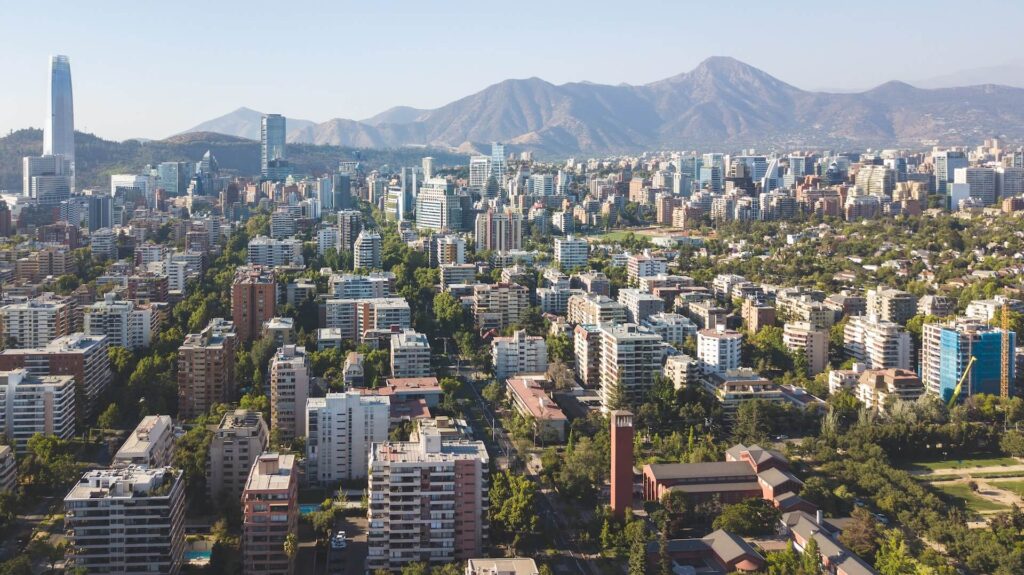
The following words and phrases are worth going over and over until you can say them pretty much automatically, as they will be some of the basic building blocks to your Spanish knowledge.
- Hablo español / No hablo español . — I speak Spanish / I don’t speak Spanish.
- ¿Tiene…? — Do you have…?
- Tengo… no tengo… — I have… I don’t have…
- Entiendo, no entiendo — I understand, I don’t understand
- ¿Entiende? — Do you understand?
- Quiero, no quiero — I want…, I don’t want… E.g. quiero un boleto, un taxi, un hotel — I want a ticket, a taxi, a hotel…
- Me gustaría, no me gustaría… — I would like…, I wouldn’t like… (This one is more polite)
- ¿Dónde está…? — Where is… ?
- ¿Cuánto cuesta? — How much does it cost?
- ¿Qué hora es? — What time is it?
How to Ask for Directions in Spanish
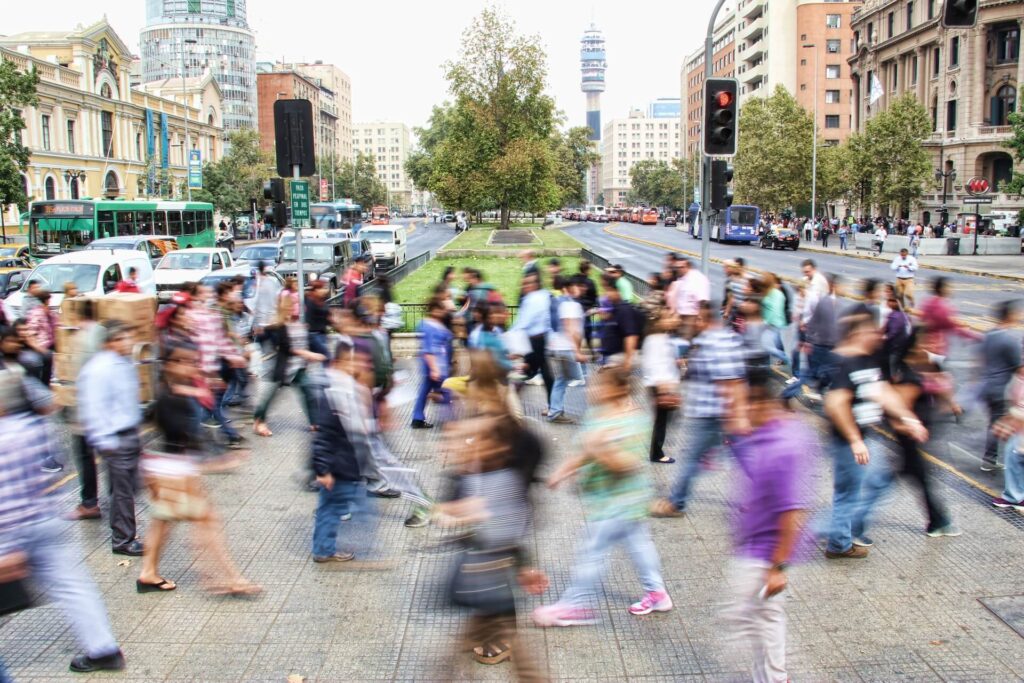
Learning how to ask for directions is perhaps not as essential as it was twenty years ago, before the development of the internet and Google Maps.
However, if you find yourself in a situation where you can’t use your cellphone (which can easily happen!), you should know the basic Spanish phrases and vocabulary for finding your way around.
- ¿Dónde está…? — Where is the…?
- ¿ Cómo llego al centro? — How do I get to the centre/downtown?
- ¿Hay un restaurante bueno por aquí? — Is there a good restaurant around here?
- Busco un hotel/hostal — I’m looking for a hotel/hostal
With the phrases above you can ask for directions to other places, such as the bank, a bathroom etc. Here is some useful vocabulary to substitute into these phrases:
- El baño — the bathroom
- Un tren — a train
- La calle — the street
- Un cajero automático — an ATM
And lastly some practical vocab to help you understand the helpful directions people give you:
- A la derecha — to the right
- A la izquierda — to the left
- Derecho — straight ahead
- Una cuadra — a block
- Sigue… — keep going…
How to Ask for Help in Spanish

While there are many things you must learn if you want to speak Spanish, knowing how to ask for help is key to surviving in a Spanish-speaking country.
A few phrases or words will make things much easier if an emergency occurs or you are in trouble, including the following:
Note: These examples use the “formal” way of speaking to people.
- ¿Puede ayudarme? — Can you help me?
- ¡Ayuda! — Help!
- Necesito ayuda — I need help
- ¡Llame a la policía! — Call the police!
- ¡Llame a la ambulancia! — Call the ambulance!
- Ayúdeme, por favor . — Help me, please
- ¿Podría ayudarme, por favor? — Could you help me, please?
- ¿Podría explicarlo, por favor? — Can you explain it to me, please?
- ¿Cómo se escribe…? — How do you write…?
- ¿Cómo se dice…? — How do you say…?
Spanish for Medical Emergencies

It’s also important to know words in Spanish that can help us deal with a medical emergency.
- No me siento bien — I don’t feel well
- ¿Dónde está el hospital más cercano? — Where is the nearest hospital?
- ¿Puede llamar a la ambulancia? — Can you call the ambulance?
- ¿Dónde está la farmacia? — Where is the drugstore/pharmacy?
- ¿El doctor habla inglés? — Does the doctor speak English?
- ¿Necesito medicinas? — Do I need medication?
- ¿Qué medicina necesito? — What medicine do I need?
- Tengo un seguro de salud internacional — I have international health insurance
Navigating Your Accommodation in Spanish
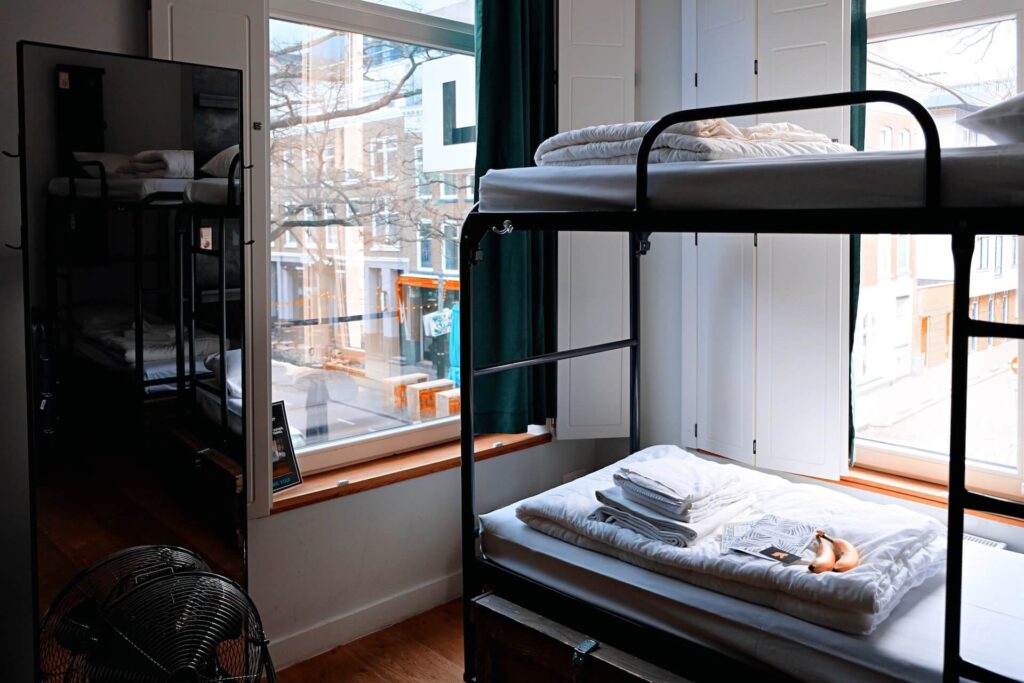
Once you’ve found the perfect place to stay, here’s how to get yourself checked in and comfortable:
- Tengo una reserva a nombre de Harry Potter — I have a reservation under the name Harry Potter
- Necesito un hotel / un cuarto / un cuarto con baño — I need a hotel / a room / a room with a bathroom
- Me gustaría quedarme por dos noches — I would like to stay for two nights
- ¿Tiene una habitación doble? — Do you have a double room?
- ¿Dónde está la piscina / gimnasio? — Where is the pool/gym?
- ¿A qué hora es el desayuno? — What time is breakfast?
- ¿Cuál es la contraseña de WiFi? — What is the WiFi password?
Essential Spanish for Eating Out

The most important travel Spanish phrases to add to your mental toolbox are those surrounding eating out—either because we are hungry (obviously) or we want to experience the wonderful local gastronomy.
This list of expressions and words could save your life (well, your stomach) on your next adventure in a Spanish-speaking country.
In addition to the vocabulary below, a useful resource are these scenario podcast episodes we did about ordering vegetarian food in Spanish , and ordering coffee in Spanish .
To make things easier, we have divided these restaurant-related words and phrases into several categories. Check them out below:
When Arriving or Booking a Table
- Quisiera reservar una mesa — I would like to book a table
- Quisiera reservar una mesa para dos — I would like to book a table for two
- ¿Tiene alguna mesa disponible? — Is there any available table?
- Tengo una mesa reservada a nombre de Hermione Granger — I have booked a table under the name of Hermione Granger
When Ordering
- ¡Camarero / garzón! — Waiter !
- ¿Podría traerme el menú, por favor? — Could you bring me the menu, please?
- ¿Qué me recomienda? — What do you recommend?
- ¿Podría recomendarme un plato local, por favor? — Can you recommend me a local dish, please?
- Para beber, me gustaría… — To drink, I would like…
- Como entrada, me gustaría.. . — As a starter, I would like …
- Como plato principal, me gustaría… — For the main course, I would like…
- De postre, me gustaría… — For dessert, I would like…
During the Meal
- Perdone, ¿podría traerme…? — Excuse me, could you bring me…?
- Perdone, ¿podría traerme más servilletas? — Excuse me, could you bring me some more napkins?
- Perdone, ¿podría traerme otra copa de vino ? Excuse me, could you bring me another glass of wine? (learn this one by heart 🍷)
- La comida está muy rica . — The food is delicious
- La carne está demasiado hecha — The meat is overcooked
- La carne está poco hecha — The meat is undercooked
When Paying and Leaving
- La cuenta, por favor — The bill, please
- Estaba todo muy rico, gracias — Everything was very tasty, thanks
- Quisiera pagar con tarjeta — I’d like to pay by card
- Quisiera pagar en efectivo — I’d like to pay in cash
- Creo que hay un error — I think there’s a mistake
Lastly, if you’re a foodie like me, you might want to know some food recommendations. Click here to learn about the different foods you must try if you’re visiting Chile!
Resources to Learn More Travel Spanish
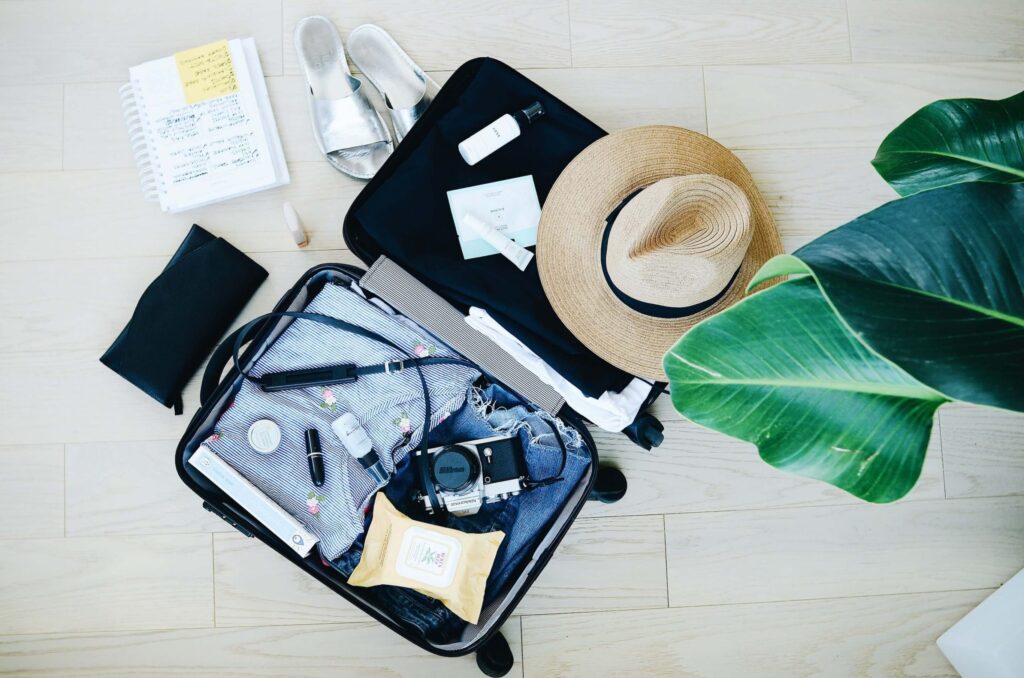
If you’ve decided you want to know a bit more than just the survival Spanish, here are a few resources to kick-start your Spanish journey.
- Seeing in Spanish Podcast. Our own language learning and travel podcast aims at helping you self-learn Spanish to make your travels unforgettable. To start, check out this episode on how to learn Spanish on your own .
- Duolingo. I think it’s safe to assume you know what Duolingo is! While it often gets a bad rap, it’s all about how you use Duolingo which makes the difference!
- YouTube Videos. Videos such as this video on top 20 travel Spanish phrases you should know are a great way to hear how phrases we learnt in this article are actually pronounced.
It’s also worth remembering that Spanish changes depending on what country you’re in, so you might also want to consider learning a specific Spanish dialect.
With these survival Spanish words and phrases, your next trip will be much easier and more memorable.
Now you can move on to getting excited for your adventure!
COMBI Courses
- Tutor Lessons

Learn Spanish Online
- Private Lessons
- Private Tutor Lessons
- Conversation Lessons
- Little Spanish Explorers
- Exam Preparation
- Corporate Training
- FREE Level 1 Course
- Level 2–24 Courses
- Resource Sheets
- Beginners Course
- E-Mail Mini Courses
- Learner Blog
- Interactive Games
take our level test to determine your current knowledge of Spanish :

Let's Speak Spanish
- Our Teachers
- 24 Level System To Spanish Fluency®
- Student Reviews

Meet Our Teachers

Spanish for Travel – Learn Essential Spanish Vocabulary and Short Phrases for Your Next Trip

This post includes:
- Spanish travel phrases cheat sheet as PDF download
- Audio to correct your pronunciation
- Exercises to practice, 3 infographics, 2 podcast episodes, and an explanation video
- A recommendation for the best travel apps to make the most of your trip to Spain
Table of Contents
Introduction.
1.1 Essential Spanish conversational phrases
- Means of transportation 2.1 At the airport 2.2 Baggage related phrases 2.3 Buying tickets 2.4 At the train or the bus station
- At the car rental 3.1 Types of cars 3.2 Prices 3.3 Car information 3.4 Returning the car and emergency situations 3.5 Useful verbs
At the restaurant
At the hotel.
- Basic Spanish directions 6.1 Asking for directions 6.2 Receiving directions
- Essential phrases in Spanish for emergencies
- The most commonly used verbs
- Best apps for traveling in Spain
Looking to spice up your Spanish skills? From must-know verbs for your travels to nifty phrases that’ll make locals swoon, we’ve got you covered.
With our helpful Spanish phrases and words , you’ll be like a linguistic chameleon, seamlessly blending in wherever you go. Whether you’re exploring the vibrant streets of Mexico, basking in the Spanish sun, or even just soaking up the lively atmosphere of Miami, these phrases will be your secret weapon.
Here’s the secret sauce: ¡practice makes perfecto! Use these words and phrases until they flow effortlessly from your tongue until ordering tapas feels as natural as breathing.
Let’s dive into our blog and unlock the language of adventure! ¡Vamos!
Essential Spanish Conversational Phrases
A big part of traveling abroad is meeting new people. It doesn’t matter where you meet them, it only matters what you say to them. To have a broader picture check out our blog post about Greetings, Common Phrases and Most Common Questions in Spanish . The blog post was prepared for you by our experienced Spanish teachers.
[mp3j track=”https://letsspeakspanish.com/wp-content/uploads/2021/11/audio-blogpost-travel-1.mp3″ title=”” ind=”n” volslider=”n” flow=”y”] Hola, ¿qué tal? – Hello, how are you?
[mp3j track=”https://letsspeakspanish.com/wp-content/uploads/2021/11/audio-blogpost-travel-2.mp3″ title=”” ind=”n” volslider=”n” flow=”y”] Estoy bien, gracias. – I’m fine, thank you.
[mp3j track=”https://letsspeakspanish.com/wp-content/uploads/2021/11/audio-travel-blog-3.mp3″ title=”” ind=”n” volslider=”n” flow=”y”] No estoy muy bien. / No estoy bien. – I’m not too well. / I’m not well.
[mp3j track=”https://letsspeakspanish.com/wp-content/uploads/2022/03/Spanish-travel-2.mp3″ title=”” ind=”n” volslider=”n” flow=”y”] Buenos días. Buenas tardes. Buenas noches. – Good morning. Good afternoon. Good evening./Good night.
[mp3j track=”https://letsspeakspanish.com/wp-content/uploads/2021/11/audio-travel-4.mp3″ title=”” ind=”n” volslider=”n” flow=”y”] Adiós. Buenas noches. – Goodbye. Good night.
[mp3j track=”https://letsspeakspanish.com/wp-content/uploads/2021/11/audio-travel-6.mp3″ title=”” ind=”n” volslider=”n” flow=”y”] ¿Hablas inglés? – Do you speak English?
[mp3j track=”https://letsspeakspanish.com/wp-content/uploads/2021/11/audio-travel-7.mp3″ title=”” ind=”n” volslider=”n” flow=”y”] ¿Puedes ayudarme? – Can you help me?
[mp3j track=”https://letsspeakspanish.com/wp-content/uploads/2021/11/audio-travel-8.mp3″ title=”” ind=”n” volslider=”n” flow=”y”] ¿Puedes hablar más despacio? No entiendo. – Can you speak slower? I don’t understand.
[mp3j track=”https://letsspeakspanish.com/wp-content/uploads/2021/11/audio-travel-9.mp3″ title=”” ind=”n” volslider=”n” flow=”y”] Hasta mañana. / Hasta luego. / Hasta pronto. – See you tomorrow. / See you later. / See you soon.
[mp3j track=”https://letsspeakspanish.com/wp-content/uploads/2023/06/Disculpa-perdona.mp3″ title=”” ind=”n” volslider=”n” flow=”y”] Disculpa/Perdona. Por favor. Gracias. De nada. – Excuse me. Please. Thank you. You’re welcome.
[mp3j track=”https://letsspeakspanish.com/wp-content/uploads/2021/11/audio-travel-11.mp3″ title=”” ind=”n” volslider=”n” flow=”y”] Sí, por favor. No, gracias. – Yes, please. No, thanks.
[mp3j track=”https://letsspeakspanish.com/wp-content/uploads/2023/06/¿Como-te-llamas_-Me-llamo.mp3″ title=”” ind=”n” volslider=”n” flow=”y”] ¿Cómo te llamas? Me llamo _____ – What’s your name? My name is _____
[mp3j track=”https://letsspeakspanish.com/wp-content/uploads/2023/06/¿Donde-vives_-Vivo-en-____.mp3″ title=”” ind=”n” volslider=”n” flow=”y”] ¿Dónde vives? Vivo en ____. – Where do you live? I live in ______.
[mp3j track=”https://letsspeakspanish.com/wp-content/uploads/2021/11/audio-ttravel-14.mp3″ title=”” ind=”n” volslider=”n” flow=”y”] Encantado de conocerte. ¿De dónde eres? – Nice to meet you. Where are you from?
[mp3j track=”https://letsspeakspanish.com/wp-content/uploads/2021/11/audio-travel-15.mp3″ title=”” ind=”n” volslider=”n” flow=”y”] Soy de _______. – I’m from _________.
[mp3j track=”https://letsspeakspanish.com/wp-content/uploads/2023/06/¿Cual-es-tu-profesion_-Soy-.mp3″ title=”” ind=”n” volslider=”n” flow=”y”] ¿Cuál es tu profesión? Soy ______. – What’s your job? I’m a(n) _______.
[mp3j track=”https://letsspeakspanish.com/wp-content/uploads/2021/11/audio-travel-17.mp3″ title=”” ind=”n” volslider=”n” flow=”y”] ¿Cuál es tu número de teléfono? Mi número de teléfono es _____ Llámame. Este es mi número de teléfono. – What’s your phone number? My phone number is… Call me. This is my phone number.
[mp3j track=”https://letsspeakspanish.com/wp-content/uploads/2023/06/correo-electronico.mp3″ title=”” ind=”n” volslider=”n” flow=”y”] ¿Cuál es tu dirección de correo electrónico? Mi dirección de correo electrónico es_____. Envíame un correo electrónico. Esta es mi dirección de correo electrónico. – What’s your email address? My email address is… Email me. Here’s my email address.
The first step of traveling is planning. It can be fun but also quite stressful. It’s up to you to decide. In our podcast we talk about planning vacations in Spanish. You can listen to it on different platforms!
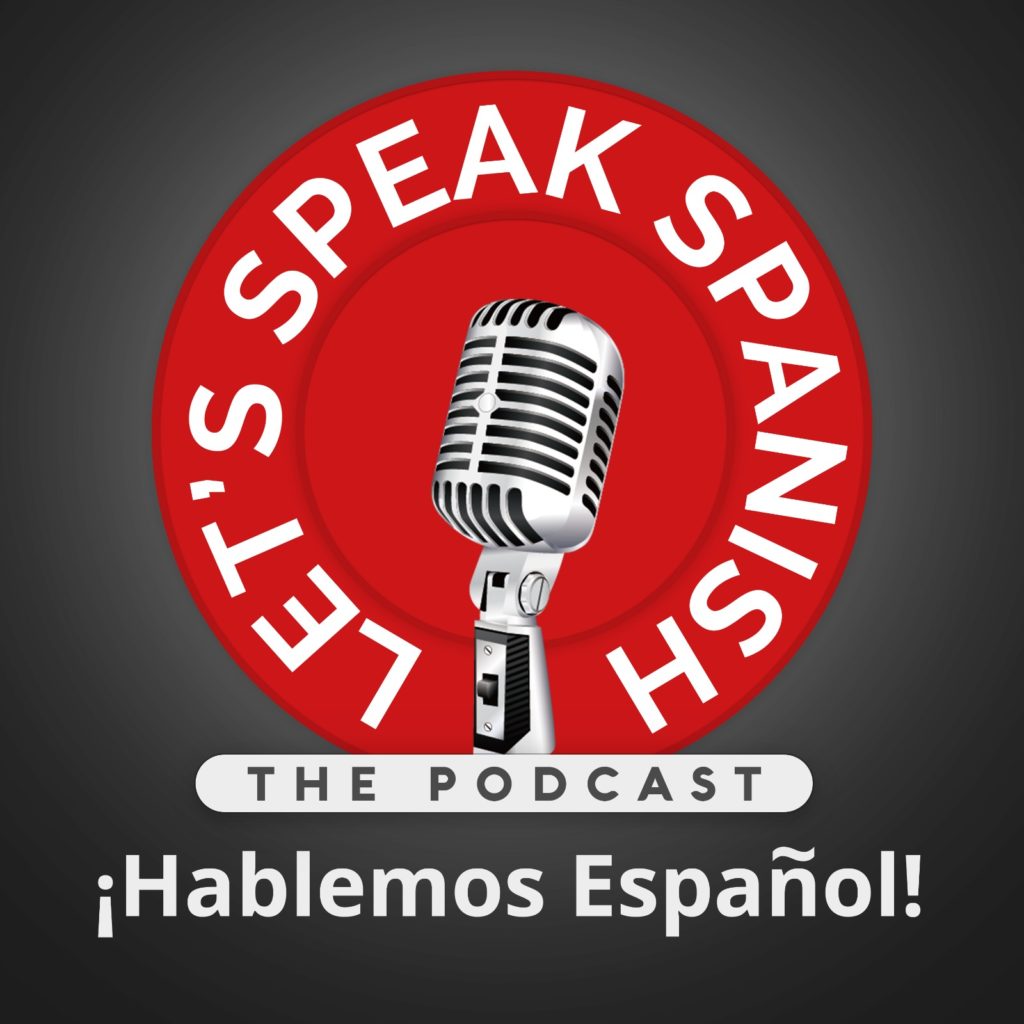
Planning Vacations in Spanish: Listen to Our Podcast!
Means of transportation.
First, we need to get started with the transport vocabulary . Have a look at the infographic you’ll find bellow.
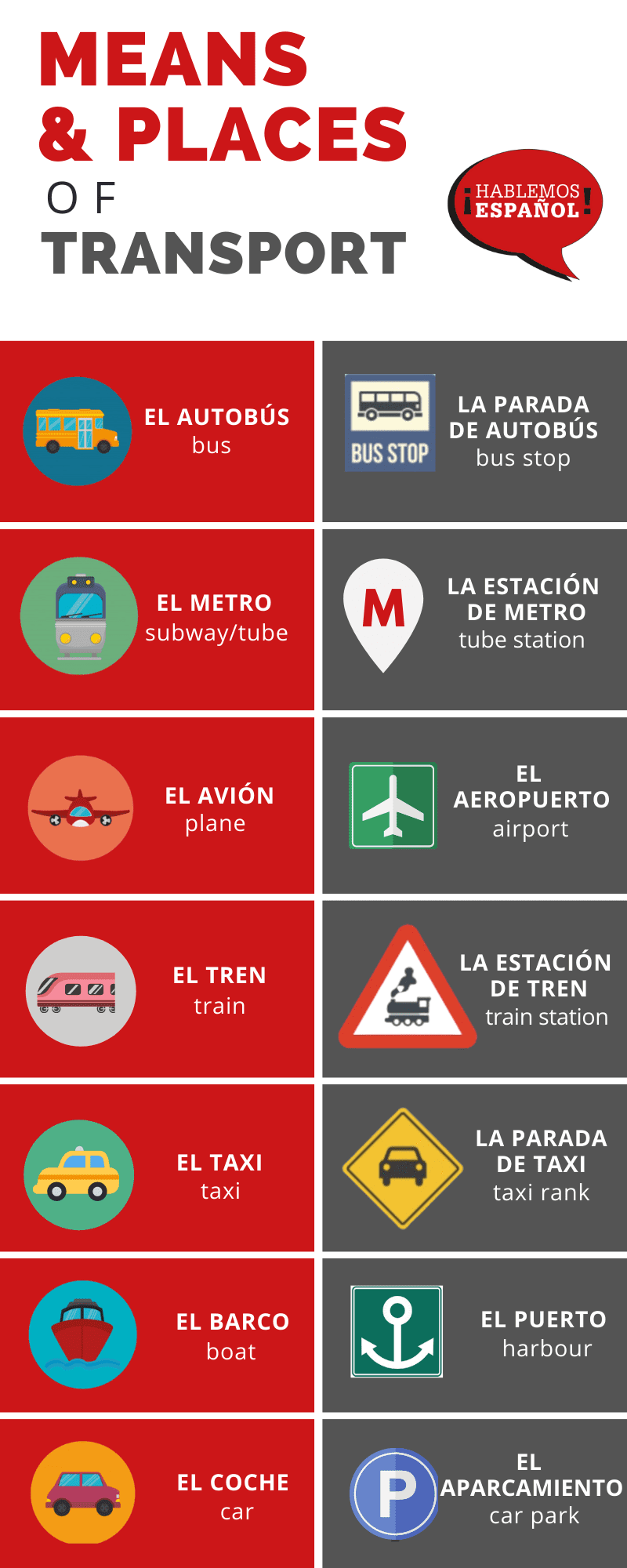
At the Airport
If you are taking your first flight to Spain , you should be prepared for all the different dialects and accents you will hear and see on your trip. To smooth your experience, we provide you with a list of common words and phrases used at the airport in Spanish .
[mp3j track=”https://letsspeakspanish.com/wp-content/uploads/2021/12/travel-airport-1.mp3″ title=”” ind=”n” volslider=”n” flow=”y”] ¿Dónde está el mostrador de facturación? – Where is the check-in counter?
[mp3j track=”https://letsspeakspanish.com/wp-content/uploads/2021/12/travel-airport-2.mp3″ title=”” ind=”n” volslider=”n” flow=”y”] ¿Dónde está el control de seguridad? – Where is the security checkpoint?
[mp3j track=”https://letsspeakspanish.com/wp-content/uploads/2021/12/travel-airport-3.mp3″ title=”” ind=”n” volslider=”n” flow=”y”] ¿Dónde está el autobús de enlace que lleva al hotel? – Where is the hotel shuttle bus?
[mp3j track=”https://letsspeakspanish.com/wp-content/uploads/2021/12/travel-airport-4.mp3″ title=”” ind=”n” volslider=”n” flow=”y”] ¿Dónde está la aduana? – Where are the customs?
[mp3j track=”https://letsspeakspanish.com/wp-content/uploads/2021/12/travel-airport-5.mp3″ title=”” ind=”n” volslider=”n” flow=”y”] ¿Dónde está la parada de autobús? – Where is the bus stop?
[mp3j track=”https://letsspeakspanish.com/wp-content/uploads/2021/12/travel-airport-6.mp3″ title=”” ind=”n” volslider=”n” flow=”y”] ¿Dónde está la terminal? – Where is the terminal?
[mp3j track=”https://letsspeakspanish.com/wp-content/uploads/2022/03/Travel-for-spanish-blog.mp3″ title=”” ind=”n” volslider=”n” flow=”y”] ¿Dónde está el baño/servicio/aseo ? – Where is the toilet?
[mp3j track=”https://letsspeakspanish.com/wp-content/uploads/2023/06/¿A-que-hora-sale-el-avion_.mp3″ title=”” ind=”n” volslider=”n” flow=”y”] ¿A qué hora sale el avión? – What time does the plane leave?
[mp3j track=”https://letsspeakspanish.com/wp-content/uploads/2021/12/travel-airport-9.mp3″ title=”” ind=”n” volslider=”n” flow=”y”] ¿A qué hora llega el vuelo? – What time does the flight arrive?
[mp3j track=”https://letsspeakspanish.com/wp-content/uploads/2021/12/travel-airport-10.mp3″ title=”” ind=”n” volslider=”n” flow=”y”] ¿Cuál es el número de vuelo? – What is the flight number?
[mp3j track=”https://letsspeakspanish.com/wp-content/uploads/2021/12/travel-airport-11.mp3″ title=”” ind=”n” volslider=”n” flow=”y”] ¿Cuál es el teléfono de la compañía aérea? – What is the airline’s phone number?
Baggage Related Phrases
Buying tickets.
Here you have some essential phrases and vocabulary to buy tickets in Spanish. We know how stressful is to purchase tickets for buses, trains, airplanes or any event that you want to attend. But don’t panic! We are here to make your life easier.
[mp3j track=”https://letsspeakspanish.com/wp-content/uploads/2023/06/¿Hablas-ingles_.mp3″ title=”” ind=”n” volslider=”n” flow=”y”] ¿Hablas inglés? – Do you speak English?
[mp3j track=”https://letsspeakspanish.com/wp-content/uploads/2021/12/travel-tickets-2.mp3″ title=”” ind=”n” volslider=”n” flow=”y”] ( Quería) un billete a Barcelona. – I want a ticket to Barcelona.
[mp3j track=”https://letsspeakspanish.com/wp-content/uploads/2021/12/travel-tickets-3.mp3″ title=”” ind=”n” volslider=”n” flow=”y”] Un billete de ida a Santiago, por favor. – One way ticket to Santiago, please.
[mp3j track=”https://letsspeakspanish.com/wp-content/uploads/2021/12/travel-tickets-4.mp3″ title=”” ind=”n” volslider=”n” flow=”y”] ¿Cuánto cuesta el billete? – How much does the ticket cost?
[mp3j track=”https://letsspeakspanish.com/wp-content/uploads/2021/12/travel-tickets-5.mp3″ title=”” ind=”n” volslider=”n” flow=”y”] ¿Cuándo sale el avión/autobús/tren? – When does the plane/bus/train leave?
[mp3j track=”https://letsspeakspanish.com/wp-content/uploads/2021/12/travel-tickets-6.mp3″ title=”” ind=”n” volslider=”n” flow=”y”] ¿Cuándo llega el avión/autobús/tren? – When does the plane/bus/train arrive?
At the Train or the Bus Station
[mp3j track=”https://letsspeakspanish.com/wp-content/uploads/2021/12/travel-at-train-1.mp3″ title=”” ind=”n” volslider=”n” flow=”y”] ¿Cuánto cuesta el billete? – How much does the ticket cost?
[mp3j track=”https://letsspeakspanish.com/wp-content/uploads/2021/12/travel-at-train-2.mp3″ title=”” ind=”n” volslider=”n” flow=”y”] Un billete de ida a Valencia, por favor. – One way ticket to Valencia, please.
[mp3j track=”https://letsspeakspanish.com/wp-content/uploads/2021/12/travel-at-train-3.mp3″ title=”” ind=”n” volslider=”n” flow=”y”] ¿A qué hora sale el tren para ___? – What time does the train to … leave?
[mp3j track=”https://letsspeakspanish.com/wp-content/uploads/2021/12/travel-at-train-4.mp3″ title=”” ind=”n” volslider=”n” flow=”y”] ¿Dónde está la parada del autobús número 11? – Where is the stop for bus number 11?
[mp3j track=”https://letsspeakspanish.com/wp-content/uploads/2021/12/travel-at-train-5.mp3″ title=”” ind=”n” volslider=”n” flow=”y”] ¿Cuándo llega el tren de ____? – When does the train from … arrive?
[mp3j track=”https://letsspeakspanish.com/wp-content/uploads/2021/12/travel-at-train-6.mp3″ title=”” ind=”n” volslider=”n” flow=”y”] ¿Cuál es la próxima parada? – What is the next stop?
[mp3j track=”https://letsspeakspanish.com/wp-content/uploads/2021/12/travel-at-train-7.mp3″ title=”” ind=”n” volslider=”n” flow=”y”] ¿Cuántas paradas más hay hasta ____? – How many more stops until…?
[mp3j track=”https://letsspeakspanish.com/wp-content/uploads/2021/12/travel-at-train-8.mp3″ title=”” ind=”n” volslider=”n” flow=”y”] ¿Cuánto dura el viaje? – How long is the journey?
While traveling in Spanish-speaking countries it’s necessary to know the numbers and dates . Even if you know how to ask “ How much does it cost? ” – it doesn’t mean that you will understand the answer (yes, I’ve been there).
For this reason, we have created a complete post for Numbers in Spanish . If you have difficulties with long numbers or find yourself frustrated with 5, 15, 50, and 500, then you should definitely check it out.
At the Car Rental
- Client : Buenos días. Quiero alquilar un coche. - Good afternoon. I would like to rent a car.
- Renter : Hola. ¿Tiene una reserva? - Do you have a reservation?
- Client : Sí/no tengo una reserva. - Yes, I have/No, I don’t have a reservation
- Renter : ¿Para cuántos días / cuántas semanas? - For how many days/weeks?
- Client : Para ____ días/semanas. - For ____ days/weeks.
Did you know that the word ‘car’ in Spanish can be said in many different ways depending on the country you’re in? Here you have a few examples.
Types of Cars:
Car information:.
[mp3j track=”https://letsspeakspanish.com/wp-content/uploads/2021/12/travel-at-car-4.mp3″ title=”” ind=”n” volslider=”n” flow=”y” ¿El coche es manual o automático? – Is the car manual or automatic?
[mp3j track=”https://letsspeakspanish.com/wp-content/uploads/2023/06/¿El-coche-tiene-aire-acondicionado_.mp3″ title=”” ind=”n” volslider=”n” flow=”y”] ¿El coche tiene aire acondicionado? – Does the car have air conditioning?
[mp3j track=”https://letsspeakspanish.com/wp-content/uploads/2021/12/travel-at-car-6.mp3″ title=”” ind=”n” volslider=”n” flow=”y”] ¿Dónde está la rueda de repuesto? – Where is the spare tire?
[mp3j track=”https://letsspeakspanish.com/wp-content/uploads/2021/12/travel-at-car-7.mp3″ title=”” ind=”n” volslider=”n” flow=”y”] ¿Qué tipo de gasolina utiliza? – What kind of fuel does it take?
[mp3j track=”https://letsspeakspanish.com/wp-content/uploads/2023/06/¿Cuantos-litros-por-kilometro-consume-este-coche_.mp3″ title=”” ind=”n” volslider=”n” flow=”y”] ¿Cuántos litros por kilómetro consume este coche? – How many miles/kilometers does this car get to the gallon/liter.
[mp3j track=”https://letsspeakspanish.com/wp-content/uploads/2023/06/¿El-precio-incluye-el-seguro-y-el-kilometraje_.mp3″ title=”” ind=”n” volslider=”n” flow=”y”] ¿ El precio incluye el seguro y el kilometraje? – Does that price include insurance and mileage?
Returning the Car and Emergency Situations:
[mp3j track=”https://letsspeakspanish.com/wp-content/uploads/2023/06/devolver-el-coche.mp3″ title=”” ind=”n” volslider=”n” flow=”y”] ¿Dónde y cuándo tengo que devolver el coche? – Where and when do I have to return the car.
[mp3j track=”https://letsspeakspanish.com/wp-content/uploads/2023/06/devolver-el-coche-con-el-deposito-lleno.mp3″ title=”” ind=”n” volslider=”n” flow=”y”] ¿Tengo que devolver el coche con el depósito lleno? – Do I have to return the car with a full gas tank?
[mp3j track=”https://letsspeakspanish.com/wp-content/uploads/2023/06/llamar-en-caso-de-accidente-o-averia.mp3″ title=”” ind=”n” volslider=”n” flow=”y”] ¿A qué número tengo que llamar en caso de accidente o avería? – Is there anyone I can call in case of accident or breakdown
Useful Verbs:
Do you know how to order in a restaurant in Spanish? What would you say if the waiter only spoke Spanish? Or if he did not understand your language or was rude? Usually the waiters (camareros) don’t speak English or they don’t speak the language very well. So, we advise you to take a closer look at the Basic Spanish Vocabulary for Restaurants . There you will find basic and important vocabulary.
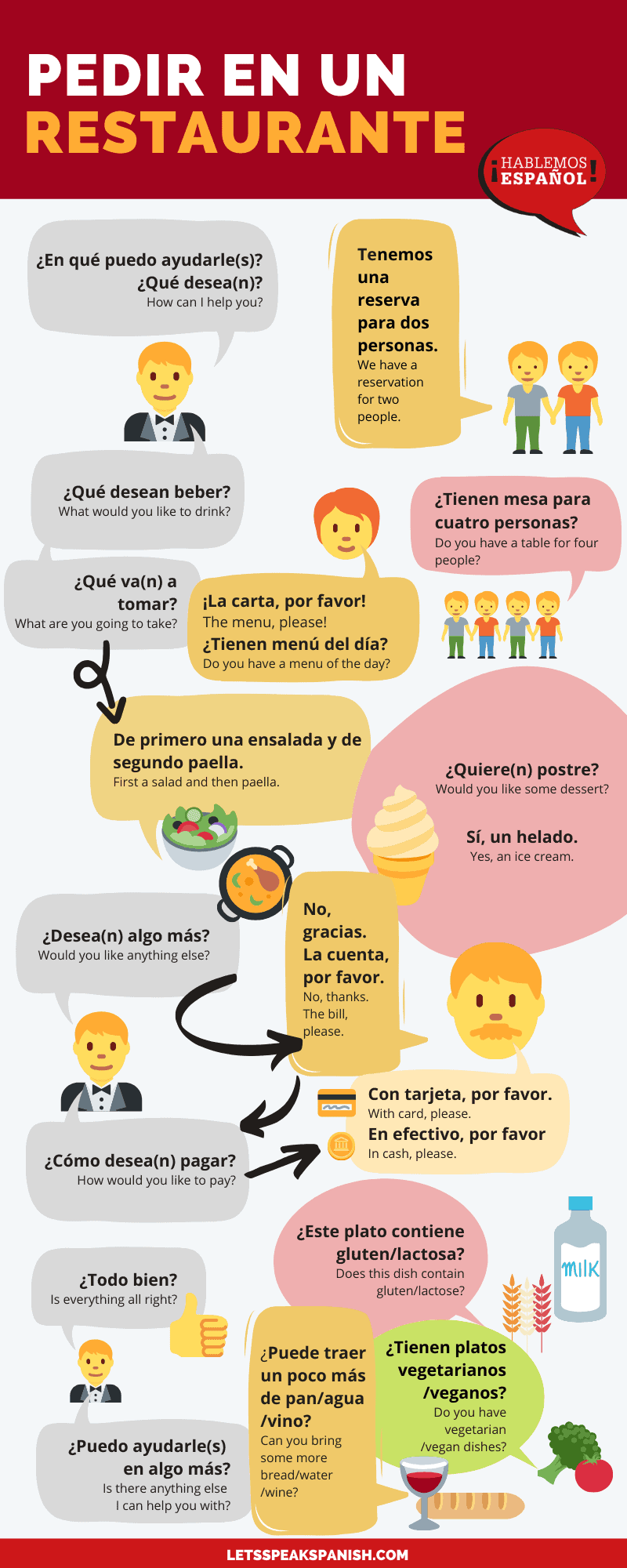
If you want to book your accommodation the old fashioned way, with a phone conversation, you can use these phrases. Keep in mind that you can write down all your requests in the reservation form on the hotel’s website.
Here you will find useful phrases for booking a room in Spanish .
The phrases you might use while checking-in :
[mp3j track=”https://letsspeakspanish.com/wp-content/uploads/2022/03/Hotel-1.mp3″ title=”” ind=”n” volslider=”n” flow=”y”] Hola, tengo una habitación reservada. – Hi, I have a reserved room.
[mp3j track=”https://letsspeakspanish.com/wp-content/uploads/2022/03/Hotel-2.mp3″ title=”” ind=”n” volslider=”n” flow=”y”] Me gustaría hacer el check-in. – I’d like to do the check-in.
[mp3j track=”https://letsspeakspanish.com/wp-content/uploads/2022/03/Hotel-3.mp3″ title=”” ind=”n” volslider=”n” flow=”y”] ¿Está lista la habitación? – Is the room ready?
[mp3j track=”https://letsspeakspanish.com/wp-content/uploads/2022/03/Hotel-4.mp3″ title=”” ind=”n” volslider=”n” flow=”y”] ¿Dónde puedo dejar mis maletas? – Where can I leave my luggage?
[mp3j track=”https://letsspeakspanish.com/wp-content/uploads/2022/03/Hotel-5.mp3″ title=”” ind=”n” volslider=”n” flow=”y”] ¿Dónde puedo aparcar el coche? – Where can I park my car?
[mp3j track=”https://letsspeakspanish.com/wp-content/uploads/2022/03/Hotel-6-2.mp3″ title=”” ind=”n” volslider=”n” flow=”y”] ¿En qué planta/piso está la habitación? – On which floor is the room?
[mp3j track=”https://letsspeakspanish.com/wp-content/uploads/2022/03/Hotel-7.mp3″ title=”” ind=”n” volslider=”n” flow=”y”] ¿A qué hora es el desayuno? – What time is breakfast?
[mp3j track=”https://letsspeakspanish.com/wp-content/uploads/2022/03/Hotel-8.mp3″ title=”” ind=”n” volslider=”n” flow=”y”] ¿Cuál es el horario de la piscina? – What are the swimming pool hours?
[mp3j track=”https://letsspeakspanish.com/wp-content/uploads/2023/06/Quiero-pagar-la-habitacion.mp3″ title=”” ind=”n” volslider=”n” flow=”y”] Quiero pagar la habitación. – I’d like to do the payment for the room.
[mp3j track=”https://letsspeakspanish.com/wp-content/uploads/2022/03/Hotel-10.mp3″ title=”” ind=”n” volslider=”n” flow=”y”] ¿Puedo pagar con tarjeta? – Can I pay by card?
[mp3j track=”https://letsspeakspanish.com/wp-content/uploads/2022/03/spanish-efectivo.mp3″ title=”” ind=”n” volslider=”n” flow=”y”] ¿Puedo pagar en efectivo? – Can I pay in cash?
[mp3j track=”https://letsspeakspanish.com/wp-content/uploads/2022/03/Hotel-12.mp3″ title=”” ind=”n” volslider=”n” flow=”y”] ¿Puede llamar un taxi, por favor? – Can you please call me a taxi?
For booking a hotel room, describing a place or an object in Spanish, we created a podcast episode that you can listen to and enhance your vocabulary and grammar skills.
On Vacation in Spain: Listen to Our Podcast!
Basic spanish directions.
This section will help you navigate through the streets of Mexico City, Barcelona or a little village of Peru.
Check out our detailed blog post about Useful Spanish Directions!

Asking for directions:
[mp3j track=”https://letsspeakspanish.com/wp-content/uploads/2023/06/Disculpa_Perdona-¿la-plaza-Mayor_.mp3″ title=”” ind=”n” volslider=”n” flow=”y”] Disculpa/Perdona, ¿la plaza Mayor?
[mp3j track=”https://letsspeakspanish.com/wp-content/uploads/2023/06/Busco-la-estacion-de-metro-mas-cercana.mp3″ title=”” ind=”n” volslider=”n” flow=”y”] Busco la estación de metro más cercana. – I’m looking for the closest metro station.
[mp3j track=”https://letsspeakspanish.com/wp-content/uploads/2022/03/Directions-3-2.mp3″ title=”” ind=”n” volslider=”n” flow=”y”] Estoy buscando un cajero automático. – I’m looking for an ATM.
[mp3j track=”https://letsspeakspanish.com/wp-content/uploads/2022/03/Directions-4-2.mp3″ title=”” ind=”n” volslider=”n” flow=”y”] ¿Dónde está el Museo de Arte Moderno? – Where is the Museum of Modern Art?
[mp3j track=”https://letsspeakspanish.com/wp-content/uploads/2022/03/Directions-5-.mp3″ title=”” ind=”n” volslider=”n” flow=”y”] ¿Hay un hospital cerca de aquí/por aquí cerca? – Is there a hospital around here?
Receiving directions:

Remember! If you don’t understand something, ask the person to repeat: ¿Cómo? (How?) . Usually Spanish people speak fast so you might need to slow them down a bit – just say: ¡Despacio, por favor! Slowly, please!
Essential Phrases in Spanish for Emergencies
Hopefully, you won’t need this part of our blog post, but it’s important that you know some basic phrases in case you need help!
[mp3j track=”https://letsspeakspanish.com/wp-content/uploads/2022/03/Emergencies-1.mp3″ title=”” ind=”n” volslider=”n” flow=”y”] ¿Puedes ayudarme? – Can you help me?
[mp3j track=”https://letsspeakspanish.com/wp-content/uploads/2022/03/Emergencies-2.mp3″ title=”” ind=”n” volslider=”n” flow=”y”] Necesito ayuda . – I need help.
[mp3j track=”https://letsspeakspanish.com/wp-content/uploads/2022/03/Emergencies-3.mp3″ title=”” ind=”n” volslider=”n” flow=”y”] Estoy perdido . – I’m lost.
[mp3j track=”https://letsspeakspanish.com/wp-content/uploads/2023/06/¡Llama-a-la-policia-.mp3″ title=”” ind=”n” volslider=”n” flow=”y”] ¡Llama a la policía! – Call the police!
[mp3j track=”https://letsspeakspanish.com/wp-content/uploads/2023/06/¡Llama-a-una-ambulancia.mp3″ title=”” ind=”n” volslider=”n” flow=”y”] ¡Llama a una ambulancia! – Call an ambulance!
[mp3j track=”https://letsspeakspanish.com/wp-content/uploads/2022/03/Emergencies-6.mp3″ title=”” ind=”n” volslider=”n” flow=”y”] ¡Ten cuidado! – Be careful!
[mp3j track=”https://letsspeakspanish.com/wp-content/uploads/2022/03/Emergencies-7.mp3″ title=”” ind=”n” volslider=”n” flow=”y”] Ha habido un accidente. – There’s been an accident.
[mp3j track=”https://letsspeakspanish.com/wp-content/uploads/2023/06/¡Por-favor-rapido.mp3″ title=”” ind=”n” volslider=”n” flow=”y”] ¡Por favor, rápido! – Please hurry!
[mp3j track=”https://letsspeakspanish.com/wp-content/uploads/2022/03/Emergencies-9.mp3″ title=”” ind=”n” volslider=”n” flow=”y”] ¿Estás bien? – Are you OK?
[mp3j track=”https://letsspeakspanish.com/wp-content/uploads/2022/03/Emergencies-10.mp3″ title=”” ind=”n” volslider=”n” flow=”y”] Me han robado. – I’ve been robbed.
[mp3j track=”https://letsspeakspanish.com/wp-content/uploads/2022/03/Emergencies-11-.mp3″ title=”” ind=”n” volslider=”n” flow=”y”] Me han atacado. – I’ve been attacked.
The Most Commonly Used Verbs
In this part you can refresh or learn new Spanish verbs for traveling .
Best Apps for Traveling in Spain

1. Maps.me – a perfect alternative to any online maps. Before going to your destination, download an offline map and you will never get lost. You can also search for restaurants, supermarkets, and cultural landmarks without being connected to the internet.

2. Cabify – it’s like Uber but a Spanish version.

3. Triposo – a different kind of a TripAdvisor. It’s more user friendly and it has a lot of information about any destination. Create bucket lists and add favorite places. You can also find mini-guides gathered by the community.

4. Spanish Dict – although Google Translate is an excellent tool, we suggest this app for traveling through Spanish-speaking countries.

5. El Tenedor (The Fork) – the app has information about over 30,000 restaurants in Spain. You can discover what is around your location, choose the preferred cuisine and book a table. You can see the full menu in an app, which is handy. The app also offers discounts and some great deals.

6. Idealista – website and app for finding accommodation for longer periods. It offers apartments and houses to rent or buy.

7. Wallapop – similar to eBay, but in Spain. You can sell or buy stuff through the website or the app.
We hope this blog post answered many of your questions. Now, you’re ready for your adventure in Spain or South America. If you’re interested in more educational blog posts, visit our Learner’s Blog or check the FREE options to learn Spanish.

Would you like to take your Spanish to the next level?
Whether you’re a complete beginner or you’re an advanced student, with us you’ll reach the next level of Spanish quickly and easily. With 24 Levels to Spanish fluency, the next level is always close by, so you will never lose motivation.
You can choose between:
COMBI Spanish Self-Study Course
Live lesson with one of our tutors.
In both cases, you’ll learn Spanish using our successful 24 Level System to Spanish Fluency® and our unique Spanish teaching methods.
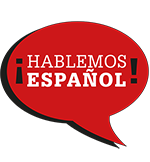
[email protected]
- 24 Level System to Spanish Fluency®
- Pricing & Booking
- Spanish Test
- COMBI Course

© 2024 FU International Academy
- Privacy Policy
- Terms and Conditions
- Legal Notice
Illustration by Natasha Remarchuk de Icons8

- Conversational Spanish
- Level 2-24 Courses
- Email Mini Courses
- Wall of Love
- More Networks

Essential Travel Phrases In Spanish – Useful Tips And Vocabulary
Discover essential travel phrases in Spanish for greetings, directions, ordering food, making hotel reservations, shopping, and emergency situations. Explore Spanish travel vocabulary, useful travel tips, and top Spanish-speaking destinations like Barcelona, Mexico City, Buenos Aires, Havana, Lima, and San Juan.
Essential Travel Phrases in Spanish
When traveling to a Spanish-speaking country, it is always helpful to have a few essential travel phrases in your arsenal. Whether you are visiting for business or pleasure, being able to communicate in the local language can greatly enhance your travel experience. In this section, we will cover some key phrases for various situations you may encounter during your trip.
Greetings and Basic Phrases
One of the first things you will want to learn when visiting a Spanish-speaking country is how to greet people and exchange basic pleasantries. Here are a few essential phrases to get you started:
- Hola (Hello) – A simple and universal greeting in Spanish.
- Buenos días (Good morning) – Used to greet someone in the morning.
- Buenas tardes (Good afternoon) – Used to greet someone in the afternoon.
- Buenas noches (Good evening/night) – Used to greet someone in the evening or at night.
- ¿Cómo estás? (How are you?) – A common way to ask someone how they are doing.
- ¿Qué tal? (What’s up?) – A more casual way to ask someone how they are.
- Gracias (Thank you) – A polite way to express gratitude.
- Por favor (Please) – Used when making a request or asking for something politely.
- Perdón (Excuse me) – Used to get someone’s attention or to apologize.
Asking for Directions
Getting around in a new city can be challenging, especially if you don’t speak the local language. Knowing how to ask for directions can save you a lot of time and frustration. Here are some phrases that may come in handy:
- ¿Dónde está…? (Where is…?) – Use this phrase when asking for the location of a particular place.
- ¿Cómo llego a…? (How do I get to…?) – Use this phrase when asking for directions to a specific destination.
- A la derecha (To the right) – Use this phrase to indicate that you need to turn right.
- A la izquierda (To the left) – Use this phrase to indicate that you need to turn left.
- Recto (Straight ahead) – Use this phrase to indicate that you should continue straight.
- Cerca (Near) – Use this word to ask if something is nearby.
- Lejos (Far) – Use this word to ask if something is far away.
Ordering Food and Drinks
Food is an important part of any travel experience, and being able to confidently order food and drinks in Spanish can open up a whole new world of culinary delights. Here are some phrases to help you navigate a menu and place your order:

- Una mesa para dos, por favor (A table for two, please) – Use this phrase when requesting a table at a restaurant.
- ¿Qué recomienda? (What do you recommend?) – Use this phrase to ask for the waiter’s recommendation.
- Quisiera… (I would like…) – Use this phrase to indicate what you would like to order.
- La cuenta, por favor (The bill, please) – Use this phrase when asking for the bill at the end of your meal.
- Una cerveza, por favor (A beer, please) – Use this phrase when ordering a beer.
- Un vaso de agua (A glass of water) – Use this phrase when ordering a glass of water.
Making Hotel Reservations
If you are planning to stay in a hotel during your trip, knowing how to make reservations in Spanish can be incredibly useful. Here are some phrases to help you when booking your accommodation:
Related: How To Say Library In Spanish: Translation And Common Phrases
- ¿Tienen habitaciones disponibles? (Do you have any available rooms?) – Use this phrase when inquiring about room availability.
- Quisiera reservar una habitación (I would like to reserve a room) – Use this phrase when making a hotel reservation.
- ¿Cuánto cuesta por noche? (How much does it cost per night?) – Use this phrase to ask about the price per night.
- ¿Incluye desayuno? (Does it include breakfast?) – Use this phrase to inquire about breakfast being included in the room rate.
- ¿A qué hora es el check-in/check-out? (What time is check-in/check-out?) – Use this phrase to ask about the check-in and check-out times.
Shopping and Bargaining
If you enjoy shopping and want to explore local markets or shops, knowing some basic shopping phrases can be beneficial. Here are a few phrases to help you navigate the world of shopping in a Spanish-speaking country:
- ¿Cuánto cuesta? (How much does it cost?) – Use this phrase when asking about the price of an item.
- ¿Tiene algo más barato? (Do you have anything cheaper?) – Use this phrase when bargaining or looking for a more affordable option.
- ¿Puede hacerme un descuento? (Can you give me a discount?) – Use this phrase when negotiating the price.
- Me gusta… (I like…) – Use this phrase when expressing interest in an item.
- No gracias (No, thank you) – Use this phrase when declining an offer or not interested in purchasing.
Asking for Help and Emergency Situations
While we hope you won’t encounter any emergencies during your trip, it’s always important to be prepared. Here are some essential phrases to use in case you need to ask for help or find yourself in an emergency situation:
- ¿Dónde está la estación de policía/médico más cercana? (Where is the nearest police station/doctor?) – Use this phrase when seeking help in a medical or legal situation.
- Ayuda (Help) – Use this word to call for assistance in an emergency.
- Necesito ayuda (I need help) – Use this phrase to communicate that you require assistance.
- Llame a una ambulancia (Call an ambulance) – Use this phrase to request an ambulance in case of a medical emergency.
- Perdí mi pasaporte (I lost my passport) – Use this phrase to report a lost passport to the authorities.
By familiarizing yourself with these essential travel phrases in Spanish, you will be better equipped to navigate various situations during your trip. Remember to practice these phrases before your journey, and don’t hesitate to engage with locals in their language. Your efforts will be greatly appreciated and will surely enhance your travel experience. ¡Buen viaje! (Have a good trip!)
Table: Common Greetings and Phrases

Spanish Travel Vocabulary
When traveling to a Spanish-speaking country, it’s helpful to have a basic understanding of the local language. This section will provide you with essential Spanish travel vocabulary to enhance your travel experience. Let’s dive into some key categories that will assist you in navigating transportation, exploring famous places and landmarks, ordering food and drinks, finding accommodation, shopping for souvenirs, and communicating as a tourist.
Transportation Terms
Getting around in a foreign country can be both exciting and challenging. To ensure a smooth travel experience, familiarize yourself with these transportation terms:
Related: Understanding The Translation And Cultural Significance Of “Poo” In Spanish
- Aeropuerto – Airport
- Estación de tren – Train station
- Estación de autobuses – Bus station
- Metro – Subway
- Taxi – Taxi
- Autobús – Bus
- Tren – Train
- Avión – Plane
- Bicicleta – Bicycle
- Coche – Car
- Andén – Platform
- Billete – Ticket
- Salida – Departure
- Llegada – Arrival
Places and Landmarks
Exploring famous places and landmarks is an integral part of any travel experience. Here are some Spanish vocabulary words to help you navigate and appreciate your surroundings:
- Plaza – Square
- Catedral – Cathedral
- Playa – Beach
- Montaña – Mountain
- Parque – Park
- Museo – Museum
- Iglesia – Church
- Palacio – Palace
- Monumento – Monument
- Mercado – Market
- Pueblo – Village
- Ciudad – City
- Castillo – Castle
- Puente – Bridge
- Torre – Tower
Food and Drinks
One of the highlights of traveling is indulging in the local cuisine. To make the most of your culinary adventures, familiarize yourself with these food and drink terms:
- Restaurante – Restaurant
- Cafetería – Café
- Bar – Bar
- Menú – Menu
- Plato – Dish
- Bebida – Drink
- Vino – Wine
- Cerveza – Beer
- Agua – Water
- Café – Coffee
- Té – Tea
- Postre – Dessert
- Mariscos – Seafood
- Carne – Meat
- Pescado – Fish
- Ensalada – Salad
- Tapas – Tapas
Accommodation Terms
Finding the perfect accommodation is essential for a comfortable stay. Here are some Spanish vocabulary words related to accommodation:

- Hotel – Hotel
- Hostal – Hostel
- Alojamiento – Accommodation
- Habitación – Room
- Reserva – Reservation
- Recepción – Reception
- Ascensor – Elevator
- Cama – Bed
- Baño – Bathroom
- Toallas – Towels
- Limpieza – Cleaning
- Wifi – Wi-Fi
- Desayuno – Breakfast
- Servicio de habitaciones – Room service
- Check-in – Check-in
- Check-out – Check-out
Shopping Vocabulary
Exploring local markets and shopping for souvenirs is a delightful part of the travel experience. Here are some useful shopping vocabulary words:
- Tienda – Shop
- Centro comercial – Mall
- Vendedor – Vendor
- Precio – Price
- Comprar – To buy
- Vender – To sell
- Regatear – To bargain
- Tarjeta de crédito – Credit card
- Dinero en efectivo – Cash
- Comprobante de compra – Receipt
- Ropa – Clothes
- Zapatos – Shoes
- Bolso – Bag
- Recuerdo – Souvenir
Common Phrases for Tourists
To enhance your communication with locals and make your way around as a tourist, here are some common phrases that will come in handy:
- Hola – Hello
- Gracias – Thank you
- Por favor – Please
- Perdón – Excuse me
- Habla inglés? – Do you speak English?
- Dónde está…? – Where is…?
- Cuánto cuesta? – How much does it cost?
- No comprendo – I don’t understand
- Qué recomiendas? – What do you recommend?
- Puedo tomar una foto? – Can I take a photo?
- Me gustaría… – I would like…
- Estoy perdido – I am lost
- Ayúdame, por favor – Help me, please
- Disculpe, ¿puede ayudarme? – Excuse me, can you help me?
Having a grasp of these vocabulary words and phrases will greatly enhance your travel experience in Spanish-speaking countries. Remember to practice and engage with the locals, as they will appreciate your efforts to communicate in their language. ¡Buena suerte y disfruta de tu viaje! (Good luck and enjoy your trip!)
Related: How To Say Train In Spanish: Translation, Phrases & Vocabulary
Useful Travel Tips for Spanish-speaking Countries
When visiting a Spanish-speaking country, it’s helpful to familiarize yourself with some basic travel tips to make your trip smoother and more enjoyable. Here are some essential tips to keep in mind:
Learn Basic Spanish Words and Phrases
One of the best ways to enhance your travel experience in a Spanish-speaking country is by learning some basic Spanish words and phrases. While many locals may speak English, making an effort to communicate in their language can go a long way in building connections and showing respect for their culture.

Start by learning simple greetings such as “Hola” (Hello) and “Gracias” (Thank you). Knowing how to ask for directions, order food, or make small talk can also be incredibly useful. Online language learning platforms and mobile apps like Duolingo or Babbel offer convenient and interactive ways to learn Spanish on the go.
Use a Spanish Language Guidebook or App
To navigate your way through unfamiliar streets and attractions, it’s wise to carry a Spanish language guidebook or use a reliable language app. These resources can provide you with essential vocabulary, phrases, and even pronunciation guides.
Whether you prefer a physical guidebook or a digital app, having a reliable language resource at your fingertips will help you communicate effectively and confidently. Some popular guidebooks include Lonely Planet’s “Spanish Phrasebook” and Rick Steves’ “Spanish Phrase Book & Dictionary.”
Be Aware of Local Customs and Etiquette
Each Spanish-speaking country has its own unique customs and etiquette, so it’s important to be aware of and respect these cultural norms. For example, in some countries, it is customary to greet others with a kiss on the cheek, while in others, a simple handshake is more appropriate.
Related: How To Order A Spanish Sandwich: Phrases And Types
Taking the time to learn about local customs and etiquette shows that you are interested in and respectful of the local culture. It can also help you avoid any unintentional misunderstandings or cultural faux pas during your travels.

Carry a Map or Use GPS
Getting lost in a new city can be both frustrating and time-consuming. To avoid this, it’s a good idea to carry a map or use a GPS navigation system when exploring Spanish-speaking countries. This will help you navigate unfamiliar streets, find landmarks, and locate your desired destinations.
There are many navigation apps available, such as Google Maps or Apple Maps, that can provide step-by-step directions and real-time updates. Additionally, having a physical map can be handy in case of any technical difficulties or when you prefer a more tangible way of navigating.
Stay Safe and Secure
While traveling, it’s essential to prioritize your safety and security. This includes taking precautions such as keeping your belongings secure, being aware of your surroundings, and avoiding unsafe areas, especially at night.
To further ensure your safety, consider registering with your embassy or consulate before your trip. They can provide you with important information, emergency contacts, and updates on any travel advisories or warnings.
Try Local Cuisine and Cultural Experiences
One of the highlights of traveling is indulging in the local cuisine and immersing yourself in the culture. Spanish-speaking countries offer a rich culinary scene with unique flavors and dishes. Don’t be afraid to step out of your comfort zone and try traditional foods like paella in Spain, tacos in Mexico, or empanadas in Argentina.
Related: How To Say Hamburger In Spanish: Translation And Common Phrases
In addition to food, seek out cultural experiences such as live music performances, traditional dances, or local festivals. These activities will not only enrich your trip but also provide you with a deeper understanding of the country’s heritage and traditions.
By following these useful travel tips, you’ll be well-prepared to navigate your way through Spanish-speaking countries and have a memorable and immersive travel experience. Remember, a little effort in learning the language, respecting local customs, and embracing the culture can go a long way in making your trip truly unforgettable. ¡Buena suerte y buen viaje! (Good luck and happy travels!)
Spanish Travel Destinations
When it comes to incredible travel destinations, Spain is a country that should be on everyone’s list. One particular city that stands out is Barcelona. Located on the northeastern coast of the Iberian Peninsula, Barcelona offers a unique blend of history, culture, and stunning architecture. From the famous Sagrada Familia to the vibrant Las Ramblas, there is no shortage of things to see and do in this vibrant city.
Moving across the Atlantic, let’s explore Mexico City. As the capital of Mexico, this bustling metropolis is a melting pot of history, art, and gastronomy. From ancient Aztec ruins to world-class museums like the Frida Kahlo Museum, there is something for every traveler in Mexico City. Don’t forget to indulge in the delicious street food, such as tacos and churros, that the city is famous for.
Heading further south, we arrive in Buenos Aires, the capital of Argentina. Known for its passionate tango, Buenos Aires is a city that exudes romance and charm. Explore the colorful neighborhood of La Boca, visit the iconic Recoleta Cemetery, and indulge in a traditional Argentine steak at one of the city’s many renowned steakhouses. Buenos Aires is a city that will captivate your heart and leave you wanting more.
Next on our list is Havana, the capital of Cuba. Step back in time as you wander through the historic streets of Old Havana, a UNESCO World Heritage Site. Explore the vibrant music scene, visit the famous Malecón, and try a classic Cuban mojito. Havana is a city that oozes with culture and history, providing a unique travel experience unlike any other.
Related: A Guide To Vanilla Beans In Spanish: Origins, Uses, And Buying Tips
Continuing our journey, let’s head to Lima, the capital of Peru. This coastal city is known for its rich history, incredible cuisine, and stunning architecture. Explore the ancient ruins of Huaca Pucllana, sample delicious ceviche at one of Lima’s many seafood restaurants, and take in the breathtaking views of the Pacific Ocean. Lima is a city that seamlessly blends tradition and modernity, making it a must-visit destination for any traveler.
Our final destination on this list is San Juan, the capital of Puerto Rico. Located in the Caribbean, San Juan offers a perfect mix of history, natural beauty, and vibrant nightlife. Explore the colorful streets of Old San Juan, visit the historic forts of El Morro and San Cristobal, and relax on the beautiful beaches. With its tropical climate and warm hospitality, San Juan is a destination that will leave you feeling rejuvenated and refreshed.
In conclusion, these Spanish travel destinations offer a wide range of experiences, from historical landmarks to culinary delights. Whether you’re looking for vibrant city life or tranquil beach getaways, Barcelona, Mexico City, Buenos Aires, Havana, Lima, and San Juan have something to offer every type of traveler. So pack your bags and get ready to embark on an unforgettable adventure in these incredible destinations. ¡Vamonos! (Let’s go!)
Leave a Comment Cancel reply
Save my name, email, and website in this browser for the next time I comment.
855-997-4652 Login Try a Free Class
100+ Basic Spanish Words and Phrases for Travelers
Ready to boost your Spanish skills before your next trip to a Spanish-speaking country with this list of essential Spanish words and phrases? No matter where you’re going, from Cancun to Madrid, we’ve got you covered.
Learning some basic Spanish words and phrases will come in super handy during your travels. Don’t worry if you still need to improve your Spanish—you can brush up before your trip and get some practice during your stay. Trust us, you’ll come back feeling motivated to take more Spanish classes!
Keep reading to learn the most common Spanish travel phrases. Read them, practice them, download them in the free PDF we’ve included below, and take them with you on your next vacation!
Now, just choose the category that interests you most (listed in the Table of Contents), or learn them all.
¡Vamos! Let’s go!
Join more than 559 million people on the planet who speak Spanish! Sign up for your free trial Spanish class today. ➡️
TABLE OF CONTENTS
- Basic Spanish Greetings for Travelers
Basic Spanish Phrases To Ask for Directions
Basic spanish for travelers: accommodations, basic spanish words and phrases for medical emergencies, spanish vocabulary for dining out, spanish transportation for your vacation, basic spanish survival phrases, basic spanish greetings for travelers .
Get ready for friendly Spanish speakers. You’ll see strangers greeting you, and they will expect the same in return. So here are some useful words and phrases in Spanish for tourists to use on a more local level.
- Hola – Hello
- Buenos días – Good morning
- Buenas tardes – Good afternoon
- Buenas noches – Good evening / Good night
- ¡Mucho gusto! – Pleased to meet you!
- Encantado/encantada – Nice to meet you
- ¿Qué tal? – What’s up?
- ¿Qué onda? – What’s up?
- ¿Cómo te llamas? – What’s your name? (Informal)
- ¿Cómo se llama? – What’s your name? (Formal)
- Me llamo… – My name is…
- ¿Cómo está? – How are you? (Formal)
- ¿Cómo estás? – How are you? (Informal)
- Muy bien, gracias – Very well, thank you.
You might like:
- ¿Cómo estás? – Everyday Spanish Greetings You Can Use
- Spanish Greetings (Free Spanish Lessons for Kids)
- How To Introduce Yourself in Spanish
100+ Spanish Words for Travelers
Impress locals and make your travels a breeze with our free PDF of the top Spanish words for travelers from hotels to restaurants and beyond!
Not everything can be found on Google Maps! That’s why a necessary part of Spanish phrases for travel must include asking for directions. Here’s a quick and easy list to get started with:
- ¿Dónde está…? – Where is…?
- ¿Dónde hay…? – Where is there…?
- Un banco – a bank
- El sanitario – the bathroom
- Busco… – I’m looking for…
- Necesito un cuarto para ___ personas – I need a room for ___ people.
- A la derecha – On the right
- A la izquierda – On the left
- Todo recto – Straight ahead
- Derecho – Straight ahead
- En la esquina – On the corner
- A una cuadra, a dos cuadras – One block away, two blocks away
- A Vocabulary Guide to Giving Directions in Spanish
- Exploring My Neighborhood (Free Spanish Lessons for Kids)
Spanish for tourists must include necessary words and phrases useful for checking in somewhere.
Whether you choose a big hotel or an Airbnb apartment, the following basic Spanish words will come in handy:
- Tengo una reserva a nombre de… – I have a reservation under the name of…
- Estancia de tres noches – Three-night stay
- Una habitación para dos personas – A room for three people
- Cama matrimonial – a double bed
- Un balcón – A balcony
- Una terraza – a terrace
- Vista al mar / al jardín / a la ciudad – A view over the sea/the garden/to the city
- La alberca – The swimming pool
- ¿A qué hora sirven el desayuno? – What time do you serve breakfast?
- ¿Puedo pedir un check-out tardío? – Can I have a late check-out?
- ¿Cuál es la contraseña de Wifi? – What ‘s the Wifi password?
- ¿Tienen servicio de habitación? – Do you have room service?
- Necesito una cama extra – I need an extra bed
- El gimnasio – The gym
- El restaurant – The restaurant
- La playa – The beach
- El vestíbulo – The hall
- A Traveler’s Guide to Hotel Vocabulary in Spanish
- How To Make Polite Requests in Spanish
While we hope that your vacation goes smoothly, it’s always a good idea to be prepared for the unexpected. Practice some of the following words and expressions just in case.
It’s better to be safe than sorry!
- ¿Dónde hay un hospital? – Where’s a hospital?
- ¿Dónde hay una farmacia? – Where’s a pharmacy?
- Necesito un doctor – I need a doctor.
- No me siento bien – I’m not feeling well.
- Tengo un seguro – I have insurance.
- ¿Habla inglés el doctor? – Does the doctor speak English?
- Me puede dar una receta para… – Can you give me a prescription for…
- ¿Pueden darme una inyección? – Can you give me an injection?
- La cita médica – Doctor’s appointment
- La cita de seguimiento – Follow-up appointment
- Rayos-X – X-ray
- Toma de sangre – Blood collection
- El yeso – Cast
- La tos – Cough
- La fiebre – Fever
- La garganta – Throat
- El estómago – Stomach
- La espalda – Back
- La cabeza – Head
You might like:
- Vocabulary Guide: At the Hospital in Spanish
- How to Go to the Doctor in Spanish: Vocabulary and Dialogues
- 50 Essential Medical Phrases for Your Upcoming Physical
When traveling to a Spanish-speaking country, it’s important to know basic Spanish words and phrases that you may use in restaurants. By learning these terms, you’ll be able to confidently navigate menu items and communicate your food preferences. So why wait?
¡Aprende estas palabras y disfruta de tu comida! Learn these words and enjoy your food!
- Quisiera… – I would like…
- Una mesa para… – A table for (number of people)…
- Un menú – A menu
- Un menú de bebidas – A beverage menu
- Una sopa – A soup
- Una ensalada – A salad
- Una hamburguesa – A hamburger
- Un plato principal – A main dish
- Una entrada – A starter
- Un postre – A dessert
- Un vaso de agua – A glass of water
- Una copa de vino – A glass of wine
- Una cerveza – One beer
- Un café – One coffee
- Un té – One tea
El camarero is the term for “waiter” in Spain, whereas el mesero is more frequently used in Latin America. To go beyond the basics, try using one of these phrases:
- ¡Amigo!/¡Amiga! – Waiter! / Waitress! (In Lat. América)
- ¡Señor! / ¡Señora! – Waiter! / Waitress! (In Spain)
- ¿Qué me recomienda? – What would you recommend?
- La cuenta, por favor – The bill, please
- ¿Aceptan las tarjetas? – Do you accept credit cards?
- ¿Puedo pagar con la tarjeta? – Can I pay by card?
- The Ultimate Vocabulary Guide to Restaurants in Spanish
- For Here or to Go? How to Order Food in Spanish
- The Easy Guide to Food and Drink Vocabulary in Spanish
Here is a detailed travel vocabulary that will make moving around easier for you. Use the following words while going by plane, bus, train, or any other mode of transportation:
- Un trén – A train
- Un camión/Un bus – A bus
- Un avión – A plane
- Un carro de alquiler – A rental car
- Su pasaporte, por favor – Your passport, please.
- Quisiera cambiar mi reserva – I would like to change my reservation.
- Equipaje de mano – Hand luggage
- ¿ A qué hora es el embarque? – What time is boarding?
- Un boleto de ida – One way ticket
- Un boleto de ida y vuelta – Round trip ticket
- ¿Tienen pases de un día, de una semana o de un mes? – Do you have one-day, one-week, or one month passes?
- ¿De que plataforma sale? – What platform does it depart from?
- ¿Cuál es la puerta de embarque? – What is the boarding gate?
- El asiento de pasillo – The aisle seat
- El asiento de ventanilla – The window seat
- 100+ Words and Phrases Related to Transportation in Spanish
- A Traveler’s Guide to the Chicken Bus in Guatemala
Naturally, it’s impossible to predict all the situations for which you may need to pre-learn some words. So, here are some expressions that are useful in different contexts.
If you’re planning a trip to a Spanish-speaking country and want to feel more confident communicating with locals, consider signing up for a free trial class with Homeschool Spanish Academy. Our native Spanish-speaking instructors provide high-quality instruction from anywhere in the world, and you’ll be able to practice the most important Spanish words and phrases before your trip. Plus, you’ll receive free lesson materials that you can take with you on your journey. Give it a try and see how HSA can support your language learning goals!
- Por favor – Please
- Gracias – Thank you
- Perdón – I’m sorry
- Disculpe – Excuse me
- ¿Hablá Inglés? – Do you speak English?
- No hablo español – I don’t speak Spanish
- Quisiera…/Me gustaría – I would like to…
- Quiero/No quiero – I want to/I don’t want to
- ¿Cuánto cuesta? – How much is it?
- ¿Qué hora son? – What time is it?
- ¿Tiene…? – Do you have….
- Tengo/No tengo – I have/I don’t have
- No entiendo – I don’t understand.
- Dinero – Money
- Uno, dos, tres, cuatro, cinco, seis, siete, ocho, nueve, diez – One, two, three, four, five, six, seven, eight, nine, ten
- Veinte, treinta, cuarenta, cincuenta, sesenta, setenta, ochenta, noventa, cien – Twenty, thirty, forty, fifty, sixty, sixty, seventy, eighty, ninety, one hundred
- 25 Most Used Spanish Phrases to Survive Any Conversation
- A Quick Guide to Expressing Your Needs in Spanish
- 101 Basic Sentences in Spanish Every Beginner Wants to Know
- 100 Easy Spanish Words for True Beginners
Your Spanish Adventure Starts Here!
Ready to put your Spanish skills to the test? Consider downloading the free PDF of this article to take with you on your trip or using it during a free Spanish class to practice your pronunciation. Who knows? You may get so excited about your vacation that you decide to take more Spanish lessons.
Regardless of how you choose to practice, we hope you feel more prepared for your travels. Have a great trip!
Ready to learn more Spanish vocabulary? Check these out!
- ‘How Much Is It?’ in Spanish: A Guide to Travel and Shopping
- Familial Bonds: Expressing ‘Sister-in-Law’ in Spanish and Family Vocabulary
- Earth Day Projects for Kids + Spanish Earth Day Vocabulary
- How to Talk About the Temperature in Spanish: Fahrenheit, Celcius, and Descriptions
- Car Parts Spanish Vocabulary List: Learn Using Pictures
- Top 15 New Year’s Resolutions in Spanish
- Talk About Hurricanes And The Weather in Spanish
- Recent Posts
- Familial Bonds: Expressing ‘Sister-in-Law’ in Spanish and Family Vocabulary - May 2, 2024
- 10 Homeschooling Styles You Need to Explore in 2023 - March 14, 2024
- Home Sweet Classroom: Creating Engaging Spanish Lessons at Home - October 13, 2023
Related Posts
45+ mission trip spanish phrases you need to know, 44 essential spanish quotes and proverbs to fuel your motivation, spanish body parts: vocabulary, idioms, and culture, spanish 101: greetings and farewells, leave a comment cancel reply.
Your email address will not be published. Required fields are marked *

The Ultimate Guide: 100+ Useful Spanish Phrases For Travel That You Need To Know!
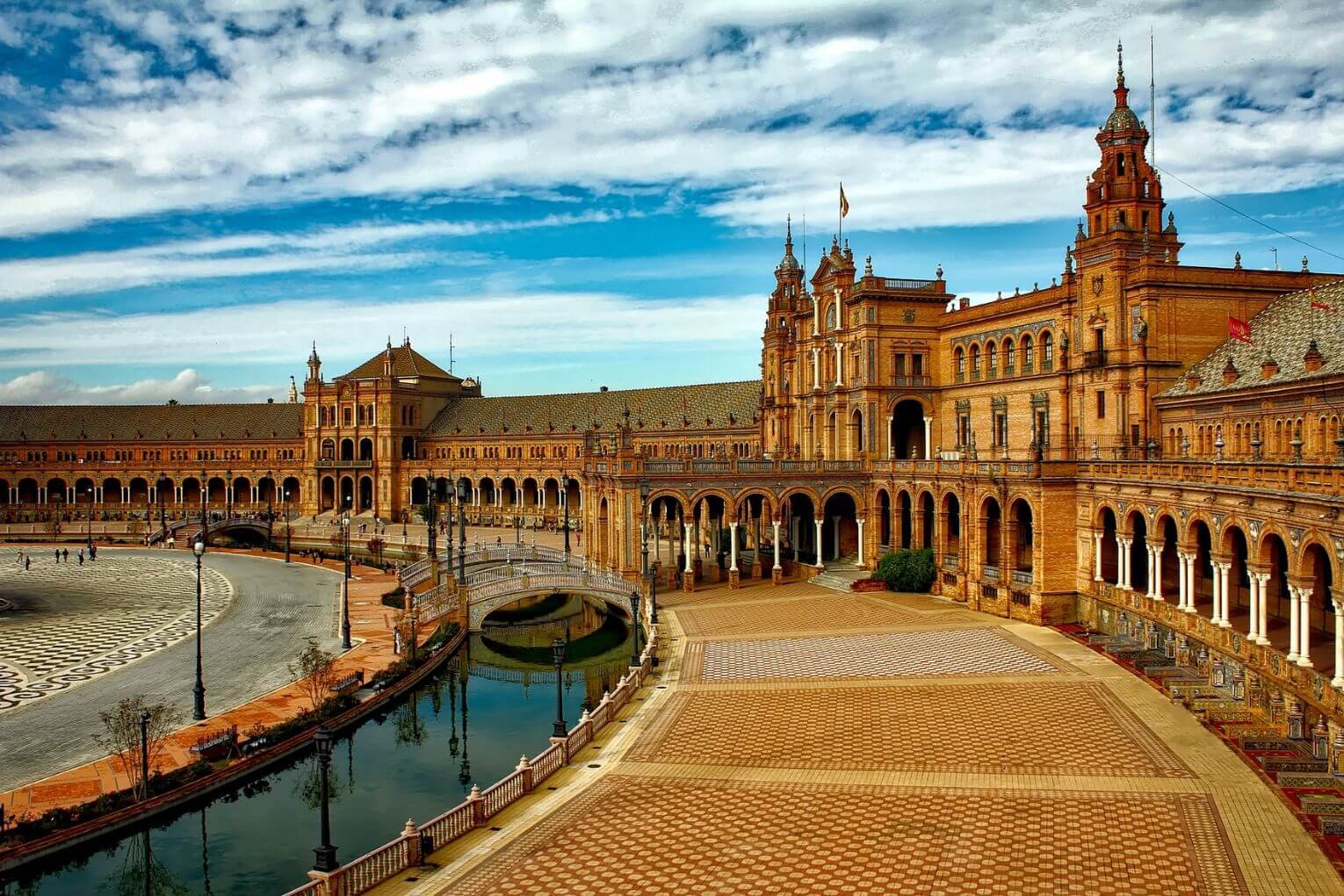
Affiliate Disclaimer: This post contains affiliate links. This means I will earn an affiliate commission if you click and/or make a purchase through the link (at no extra cost to you). And of course, I only recommend products I’ve used from companies I completely trust and love. For more information please see my disclosure .
What Are The Spanish Words Associated With Travel?
Are you considering traveling to a Spanish-speaking destination? Feeling overwhelmed by the thought of communicating without speaking the language fluently? You're not alone. Many travelers face this challenge, but having a few key phrases in your pocket can make all the difference.

Learning basic Spanish travel phrases is like unlocking a door to new adventures and deeper connections with locals.
RELATED: What Are The 11 Different Spanish Dialects? How To Choose The Best Spanish Dialect To Learn .
Did you know that even simple greetings in Spanish can open up conversations and lead to unexpected friendships while on the road? With just a handful of essential expressions, you'll navigate daily interactions with ease and confidence.
Our blog post is packed with practical phrases for every situation—from asking directions to ordering delicious local cuisine. By mastering these snippets of Spanish, your journey will transform into an enriching cultural immersion.
Let's get talking!
Essential Spanish Greetings And Phrases
Starting your journey with the basics can make a world of difference, and that's precisely what you'll get with essential Spanish greetings and phrases.
Whether it's saying "Hola" to a local or expressing gratitude with "Gracias," these initial interactions pave the way for genuine connections as you navigate through Spanish-speaking countries.
Essential Greetings
Knowing a few essential Spanish greetings can make a significant difference as you travel. They reflect respect and genuine interest in the local culture and pave the way for smoother interactions.
Say "Hola" (Hello) to initiate any conversation. It's friendly, simple, and widely understood. Whether you're walking into a shop or meeting new people, it always fits.
Use "Buenos días" (Good morning) to show politeness early in the day. This phrase carries warmth and is perfect for greeting hotel staff or local vendors.
When afternoon rolls around, switch to "Buenas tardes" (Good afternoon) . It helps maintain that cordial connection with everyone from taxi drivers to tour guides.
As evening sets in, greet with "Buenas noches" (Good night) . Use this both when saying goodbye at the end of the evening or when meeting someone at night.
If you meet someone for the first time, add "Mucho gusto" (Nice to meet you) after your hello. It adds a personal touch and can help forge friendships.
Convey gratitude by saying "Gracias" (Thank you) . Always appreciated, it acknowledges others' assistance or kindness towards you.
In case of language barriers, ask "¿Habla inglés?" (Do you speak English?) for clarity. This question can be crucial if your Spanish skills are limited.
To check how someone is doing, inquire "¿Cómo estás?" (How are you?) . This question shows interest in the well-being of Spanish speakers.
Responding to thanks with "De nada" (You're welcome) completes an exchange beautifully. It's courteous and conveys that helping was no trouble at all.
Common Phrases For Everyday Use
Mastering common phrases in basic Spanish can make your travels through Spanish-speaking countries a breeze. Here are some useful expressions to add to your language toolkit:
"Quiero" (I want) – Use this phrase when expressing a desire or need, like "Quiero agua" for "I want water."
"Me gustaría" (I would like) – This is a polite way to express what you would like, such as "Me gustaría un café" meaning "I would like a coffee."
"¿Dónde está...?" (Where is...?) – Perfect for asking directions; you can follow it with the place you're searching for: "¿Dónde está el baño?" for "Where is the bathroom?"
Say "Hola" (Hi) to greet anyone with a friendly hello.
In the mornings, use “Buenos días” (Good morning) to start the day on a bright note.
When meeting someone new, “Mucho gusto” (Nice to meet you) shows friendliness and respect.
If unsure about someone's English abilities, ask “¿Habla inglés?” (Do you speak English?).
Navigate menus and shops by learning “cuánto cuesta” (how much does it cost) .
"Are you considering traveling to a Spanish-speaking country? Did you know that learning Spanish travel phrases is like unlocking a door to deeper connections with locals? With just a handful of expressions, you'll navigate daily interactions with ease & confidence." - @sololingual
CLICK TO TWEET
Asking For Directions In Spanish
Navigating through the vibrant streets of a Spanish-speaking country becomes much simpler when you know how to ask for directions.
Keep your map tucked away and interact with locals by using these essential Spanish phrases to find your way around town effortlessly.
Essential Phrases For Navigation
Getting around in a Spanish-speaking country is much easier when you know the basic phrases for navigation. Locals appreciate when you try to speak their language, even if it's just simple phrases.
Start with "¿Dónde está...?" (Where is...?) to ask for specific places. It’s your go-to question for finding anything from streets to landmarks.
Use "¿Cómo llego a...?" (How do I get to...?) when you need step-by-step directions to your destination.
Say "¿Está lejos?" (Is it far away?) to find out if your destination is within walking distance or if you’ll need transportation.
If you’re trying to find the right path, ask "¿Es esta la dirección correcta para...?" (Is this the right way to...?) .
When choosing between left and right, learn "a la izquierda" for left and "a la derecha" for right . This will help when receiving or following directions.
To confirm how long a journey might take, inquire with "¿Cuánto tiempo se tarda en llegar a...?" (How long does it take to get to...?) .
If all else fails, use the phrase "Estoy perdido/a" (I am lost) as a way of expressing that you need substantial help navigating.
Understanding Responses
As you travel throughout Spanish-speaking countries, expect to receive a variety of responses when asking for directions. Listen carefully as locals might give you simple or detailed instructions.
Phrases like "Todo recto" (straight ahead) or "A la derecha" (to the right) will guide your way, but it's key to know more than just the basics. Become familiar with terms such as "cruce" (crossroads) , "semáforo" (traffic light) , or "rotonda" (roundabout) .
This understanding ensures that you navigate streets and reach destinations without confusion.
Mastering how to grasp these replies is crucial for seamless adventures in places where English isn’t widely spoken. Brush up on vocabulary related to specific places like “estación de autobuses” (bus station) and “taquilla” (ticket booth) .
Knowing these will help you interpret answers about locations and services that are vital during your travels, whether securing transportation tickets or finding a popular attraction.
Equip yourself with this verbal toolkit, and watch how interactions with local people transform into smoother and more enjoyable experiences.
Spanish Phrases For Accommodation
Navigating your stay in a Spanish-speaking country becomes much more manageable with the right phrases at your disposal.
From checking into your hotel to requesting amenities, mastering accommodation-related Spanish ensures a smooth and enjoyable experience.
Booking A Room
Booking a room in a Spanish-speaking country can be a breeze with the right phrases. Keep these key expressions handy to make sure you get exactly what you need.
Start with "Quiero reservar una habitación," which means "I want to book a room." This phrase is your first step in securing your stay.
Specify the type of room by saying "Una habitación individual" for a single room or "Una habitación doble" for a double room , depending on your needs.
To ask if breakfast is included, use the phrase "¿Incluye desayuno la habitación ?" It's always good to know if you've got the most important meal of the day covered.
If traveling with friends or family, say "Necesito dos habitaciones," which translates to "I need two rooms."
Check available payment methods by asking, "¿Puedo pagar con tarjeta de crédito?" This question means "Can I pay with a credit card?" and it’s crucial for planning your budget.
To request a quiet room, say "Prefiero una habitación tranquila." Peaceful rest is important when you're on the road.
For amenities, inquire with "¿Tiene servicio de habitaciones?" which asks if there's room service available.
Ask about checkout times by saying, “¿A qué hora es el checkout?” Knowing when to leave is essential to plan your travel schedule smoothly.
Hotel Interactions
After you've booked your room, it's time to engage with hotel staff and settle in comfortably. Mastering a few key Spanish phrases will help ensure your stay goes smoothly.
Check in at the front desk by saying "Hola, tengo una reserva a nombre de [Your Name]" which means “Hello, I have a reservation under [Your Name].”
Request your room key by asking "¿Puede darme la llave de la habitación, por favor?" or "Can I have the room key, please?"
Specify your room preferences if needed: "Prefiero una habitación en un piso alto" translates to "I prefer a room on a higher floor."
Inquire about hotel facilities like the gym or pool by asking "¿Dónde está el gimnasio/la piscina?" meaning "Where is the gym/pool?"
Connect to Wi-Fi by requesting the password: "¿Cuál es la contraseña del Wi-Fi?" , which asks for the Wi-Fi password.
Address any room issues with staff by saying "Disculpe, hay un problema con mi habitación," which means “Excuse me, there’s an issue with my room.”
Ask for more towels or toiletries as needed: "Necesito más toallas/productos de baño, por favor" translates to "I need more towels/bath products, please."
Discuss checking out procedures ahead of time: Find out when and where by asking "¿A qué hora es el check-out y dónde lo hago?"
Finally, upon leaving, thank the staff with a simple "Gracias por todo" – “Thank you for everything.”
Understanding And Asking For Different Types Of Accommodations
Transitioning from how you interact in hotels, knowing how to specify the type of place you'll stay is just as vital. You can ensure comfort and satisfaction by communicating your accommodation preferences clearly.
Begin by stating your requirements. For example, "Necesito una habitación individual," which means "I need a single room."
Specify the duration of your stay: "¿Es posible reservar para dos noches?" translates to "Is it possible to book for two nights?"
If you prefer a quiet room, say "Prefiero una habitación tranquila," indicating your desire for a peaceful space.
Ask about the amenities: Inquire with "¿Incluye la habitación desayuno?" to find out if breakfast is included with your room.
Check on availability: Use the phrase "¿Tiene habitaciones disponibles?" which means "Do you have rooms available?"
Clarify prices beforehand: Question by asking "¿Cuánto cuesta por noche?" to know how much it costs per night.
Confirm your booking details by saying, "Quisiera confirmar mi reserva," ensuring that everything is set for your arrival.
To request a specific bed size or type, clarify with "Quisiera una cama grande" for a large bed or mention any special requests regarding sleeping arrangements.
Discuss check-in times by asking, “¿A qué hora es el check-in?” so you know when you can enter your room.
Lastly, if there's a problem with the room, communicate that assertively: State “Hay un problema con la habitación,” followed by explaining the issue.
Inquiring About Facilities
Knowing how to ask about hotel facilities is a great way to ensure your stay is comfortable. Here's a list of useful phrases that'll help you find out what amenities are available:
Use "¿Tiene el hotel...?" (Does the hotel have...?) followed by the facility you're looking for, such as "piscina" for pool or "gimnasio" for gym.
For more specific inquiries, say "¿En qué piso está la sala de fitness?" (What floor is the fitness room on?).
If you need internet access, don't hesitate to ask, "¿El wifi es gratuito?" (Is the Wi - Fi free?).
To check if there’s a place to eat without leaving the hotel, inquire with "¿Hay un restaurante en el hotel?" (Is there a restaurant in the hotel?).
Find out where you can wash your clothes by asking, "¿Dónde está la lavandería?" (Where is the laundry room?).
For families traveling with little ones, it's important to ask, "¿Ofrecen servicios de niñera?" (Do you offer babysitting services?).
Sometimes you may require accessibility options. In this case, say "¿Tienen habitaciones accesibles para personas con discapacidad?" (Do you have accessible rooms for people with disabilities?).
If traveling with valuables, secure them by asking "¿Puedo usar la caja fuerte?" (Can I use the safe?).
In hot climates or during summer months, make sure to ask about cooling systems with "¿Hay aire acondicionado en las habitaciones?" (Is there air conditioning in the rooms?).
Dealing With Issues
Once you're acquainted with the facilities at your accommodation, it's time to tackle any issues that might arise.
Handling problems effectively can make your stay much more comfortable. Here's a list of phrases and tips to help you address concerns:
Use "Tengo un problema en mi habitación" to report an issue in your room. This translates to "I have a problem in my room." Be ready to describe what's wrong using simple vocabulary.
If something needs fixing, say "¿Puede arreglar esto?" meaning "Can you fix this?" Pointing at the issue can help if you're unsure about the Spanish words for it.
To ask for a room change, explain "Quisiera cambiar de habitación" which is "I would like to change rooms." Always be polite; adding "por favor" (please) goes a long way.
If there's noise bothering you, tell the staff: "Hay mucho ruido y no puedo dormir," meaning "There's a lot of noise and I can't sleep." They'll understand that quiet is important for your rest.
In case of an emergency situation in your hotel, learn the phrase “Necesito ayuda de inmediato,” which stands for “I need help immediately.” This could be vital if urgent assistance is required.
When dealing with lost property, use “He perdido algo” or “I've lost something.” Provide details like where and when you last saw the item.
If amenities aren't working, like Wi-Fi or air conditioning, mention “El [insert amenity] no funciona” which communicates that something isn't functioning.
Experience billing issues? Say “Creo que hay un error en la cuenta” or “I think there is a mistake on the bill.” Clarify by discussing specific charges.

Dining Phrases In Spanish
When you sit down to savor the local cuisine, knowing how to order your meal in Spanish adds a sprinkle of authenticity to your dining experience.
Master a few key phrases and you’ll navigate menus with ease, ensuring every culinary adventure is a delectable and seamless experience.
Ordering Food And Drinks
Mastering the art of ordering food and drinks in Spanish can elevate your dining experience abroad. Here’s a straightforward guide to help you navigate menus and communicate with waitstaff confidently.
Start with a greeting to catch the waiter's attention, like "Hola" or "Buenas tardes."
Politely request the menu by saying, "¿Puede darme el menú, por favor?" which means "Can you give me the menu, please?"
If you want to know about special dishes, ask "¿Cuál es el plato del día?" which means “What is today's special?”
To order your meal, use "Quiero pedir..." followed by the dish name, for instance, "Quiero pedir la paella."
For drinks, say “Me gustaría un/una…” and add the drink you want; for example, “Me gustaría un café.”
Mention any dietary restrictions with phrases like "Soy alérgico/a a..." which means “I am allergic to...” You can also say “Soy vegetariano/a” if that applies.
Ask if they accept credit cards by inquiring, “¿Aceptan tarjetas de crédito?”
Indicate you are finished eating by saying "Estoy satisfecho/a," meaning “I am satisfied.”
Request the check with "La cuenta, por favor," signaling that you're ready to pay.
Express gratitude after the meal by saying “Gracias,” (Thank You) which will always be appreciated.
Dietary Restrictions
After you've confidently ordered your food and drinks, it's crucial to convey any dietary restrictions. Communicating your needs clearly will make sure you enjoy your meal without any unwanted surprises.
Start with a simple "Tengo una restricción dietética," which means "I have a dietary restriction." This phrase alerts the staff right away that there are specific things you can't eat.
If you're vegetarian or vegan, use "Soy vegetariano/a" or "Soy vegano/a." These phrases let the server know that you don't eat meat or animal products.
For those with allergies, it's vital to say "Tengo alergia a [las nueces]" and replace [las nueces] with whatever you're allergic to. Always double-check by asking, "¿Este plato contiene [allergen]?" which means "Does this dish contain [allergen]?"
Learn the names of common ingredients in Spanish so you can ask if they are in a dish. Saying "¿Lleva este plato [ingrediente]?" asks if the dish includes a particular ingredient.
To express intolerance to lactose or gluten, say “Soy intolerante a la lactosa” for lactose or “Soy celíaco/a” for gluten.
It's also helpful to ask for recommendations by saying, "¿Puede recomendarme un plato sin [ingrediente]?" This translates to "Can you recommend a dish without [ingredient]?"
Always thank the server after discussing your dietary needs with, “Gracias por su ayuda con mi dieta especial,” thanking them for their help with your special diet.
Asking For The Bill
Moving on from navigating dietary preferences, you'll want to conclude your meal by requesting the bill in Spanish. Knowing how to ask for it properly is just as crucial as ordering your food.
Catch the waiter's attention politely with an "Excuse me," which in Spanish is “Perdón” or “Disculpe.”
Use the phrase "La cuenta, por favor" to directly ask for the bill.
If you prefer a softer approach, say "Me gustaría pedir la cuenta" to express that you would like to ask for the bill.
Mention "¿Podría traerme la cuenta?" when asking if they could bring you the bill, making it a courteous request.
In case you're splitting the payment, stating "¿Nos podría hacer cuentas separadas?" asks for separate bills.
Offer thanks once the bill arrives by saying "Gracias." Always be gracious whether just browsing through or paying up.
If specific payment methods are needed, inquire by asking “¿Aceptan tarjetas de crédito?” to find out if credit cards are accepted.
Confirm any charges you may not understand on the bill by asking “¿Qué es esto en la cuenta?” pointing at the item in question for clarification.
Once everything is settled and it's time to leave, stand up and say "Estuvo delicioso," complimenting your experience with "It was delicious."
Spanish Phrases For Airport And Transportation
Navigating through airports and finding your way around a new city can be challenging, but with the right Spanish phrases at your disposal, you'll move confidently from point A to B.
Learn how to ask for assistance or clarify travel details so that every transition on your journey is as smooth as possible.
Getting Around The City
Exploring a new city becomes much easier with a few Spanish phrases in your toolkit. Here's a list to help you zip through the streets and enjoy every moment of your adventure.
Ask locals for bus or train information by using "¿Dónde está la parada de autobús/tren?" which means "Where is the bus/train stop?"
Learn how to purchase tickets using "Quiero un boleto para [destination], por favor" which translates to "I want a ticket to [destination], please."
To find out when the next bus or train leaves, say, "¿Cuándo sale el próximo autobús/tren?" which asks "When does the next bus/train leave?"
Use “¿Este autobús va a [destination]?” to check if you're on the right bus heading towards your destination. It means "Does this bus go to [destination]?"
If you need a taxi, simply say "Necesito un taxi para [number of people]" which tells others you need a taxi for [number of people].
Understand basic fare information by asking “¿Cuánto cuesta ir a [location]?” meaning "How much does it cost to go to [location]?"
Be sure you're going the right way by confirming with “¿Es esta la dirección correcta para ir a [place]?” which means "Is this the correct way to go to [place]?"
For longer trips, inquire about train schedules with “¿Puede darme los horarios de trenes para [destination]?” translated as “Can you give me the train schedules for [destination]?”
Asking For Information
Dealing with delays.
Traveling can involve unexpected hold-ups. Stay calm and use these Spanish phrases to navigate the situation.
Ask for updates by saying "¿Hay alguna novedad sobre el retraso?" which means, "Is there any news about the delay?"
If it's a long wait, find out where you can relax. Use "¿Dónde puedo esperar cómodamente?" meaning, "Where can I wait comfortably?"
Inquire about alternate options with "¿Cuáles son las otras opciones disponibles?" which means "What are the other available options?"
Let them know if you're going to miss a connection using "Voy a perder mi conexión, ¿qué puedo hacer?" meaning, "I'm going to miss my connection, what can I do?"
Request compensation or assistance with "¿Pueden ofrecer compensación o asistencia?" which translates to asking for compensation or help.
Always keep your travel documents handy; use "Necesito encontrar mi equipaje" to say "I need to find my luggage."
Show appreciation when someone assists you by saying “Gracias por su ayuda con este retraso,” which means “Thank you for your help with this delay.”
Finally, confirm new arrangements with “Por favor confirme los nuevos detalles del viaje” which means “Please confirm the new travel details.”
Checking In
Checking in at airports, hotels, and restaurants is a crucial part of your travel adventure. Mastering some basic Spanish phrases will smooth out this process considerably.
Say "Tengo una reserva" to start the check-in conversation at the hotel, indicating you have a reservation.
Use "¿Puede darme un asiento cerca de la ventana?" at ticket offices if you prefer a window seat on your flight or the bus.
At the airport counter, ask "¿A qué hora sale mi vuelo?" to confirm the departure time of your flight.
Let hotel staff know "Necesito hacer el check-in", which means you're ready to check-in upon arrival at your accommodation.
If there's a line, ask “¿Está ocupado?” before approaching an airport or hotel desk to see if they're free to assist you.
When handing over identification, mention "Aquí tiene mi pasaporte (o identificación)" as you present your passport or ID.

Spanish Phrases For Emergencies
Navigating emergencies in a foreign country can be daunting, especially when there's a language barrier.
Equip yourself with essential Spanish phrases for medical situations, asking for assistance, and dealing with lost items to help ensure your safety and peace of mind during unexpected events.
Medical Emergencies
Traveling to a Spanish-speaking country can be exciting, but it's essential to prepare for any situation. Knowing how to communicate in Spanish during medical emergencies is vital.
Learn the phrase "¿Dónde está la farmacia?" which means "Where is the pharmacy?" This question can direct you to the nearest place for medicine and basic health supplies.
Use "Me siento enfermo" or "No me siento bien" if you need to express that you're feeling sick or unwell. It alerts others that you require medical attention.
Ask for a doctor by saying "Necesito un médico" when your situation seems serious and you need professional help immediately .
In case of an accident, saying "Necesito ayuda," which translates to "I need help," will quickly bring assistance from bystanders or emergency responders.
To specify that it's an emergency, state “Es una emergencia.” It conveys urgency and prompts quicker action from those around you.
If you have an allergy, it's crucial to know how to say "Soy alérgico a…" followed by what you're allergic to. This prevents any allergic reactions due to food or medication.
For hospital directions, ask “¿Cómo llego al hospital más cercano?” This helps locate the closest medical facility in times of need.
Understanding responses is just as important; learn key words like "izquierda" (left), "derecha" (right), "recto" (straight), and “cerca” (near).
Equip yourself with a list of useful Spanish travel phrases specifically for medical situations before your trip. It enhances your preparedness in foreign countries.
Consider carrying a translation app on your phone or a small phrasebook. These tools provide quick access to more complex phrases during unexpected emergencies.
Asking For Help
Understanding how to ask for help in Spanish is crucial, especially when you're traveling. It ensures you can communicate effectively during unexpected situations.
Say "Ayúdame, por favor" (Help me, please) as a way to immediately signal that you need assistance from someone nearby.
Use "¿Puede ayudarme?" (Can you help me?) for a more polite request if the situation isn't urgent.
Learn phrases like "Estoy perdido/a" (I am lost) or "Necesito encontrar..." (I need to find...) to get guidance when you're not sure where you are or where to go.
For medical emergencies, memorize "Necesito un médico" (I need a doctor) or "Llame a una ambulancia" (Call an ambulance).
In case of danger or if you feel threatened, shout "¡Socorro!" (Help!) or “¡Auxilio!” (Help!).
To express something specific, start with "Necesito ayuda con..." (I need help with...) followed by what you require assistance with.
If language barriers arise and you find little English is understood, use gestures along with key phrases like “No entiendo” (I don't understand).
Explain any allergies or conditions in advance by learning the phrase “Tengo alergias” (I have allergies) followed by the allergy details.
For lost items say, “He perdido mi...” followed by the object like “bolsa” for bag or “pasaporte” for passport.
Carry a phrasebook or use a language learning app on your phone to quickly show locals what kind of help you seek.
Lost Property
Now that you know how to ask for help, let's tackle another stressful situation: dealing with lost property. Whether you've left something on a bus or can't find your wallet, knowing these phrases in Spanish can save the day.
Say "He perdido [item]" to report something lost. For instance, "He perdido mi pasaporte" means "I have lost my passport".
Use "¿Dónde está la oficina de objetos perdidos?" to ask for the lost and found office.
Explain what happened with "Perdí [item] en el [place]." This could be "Perdí mis gafas en el taxi," which translates to "I lost my glasses in the taxi."
Ask someone if they found something by asking, "¿Ha encontrado alguien [item]?" For example, ask if anyone has found a phone with "¿Ha encontrado alguien un teléfono?"
Give your contact information just in case with, "Aquí tiene mi información de contacto." It will help if someone finds your item later.
In case your property is stolen, tell the authorities, "Me han robado [item]," as in "Me han robado la cartera" for “My wallet has been stolen.”
Be specific about where you think you lost it: Describe the location by saying, “Lo dejé en [location],” such as “Lo dejé en el hotel.”
Spanish Phrases For Fun And Social Interactions
Dive into the heart of Spanish culture with phrases that'll make socializing a breeze. Whether you're forging new friendships or simply enjoying the vibrant nightlife, having these conversational gems in your arsenal will unlock authentic experiences and memorable moments.
Meeting New People
Making new friends is a delightful part of traveling. Use these Spanish phrases to strike up conversations and connect with locals.
Introduce yourself confidently by saying "Hola, me llamo [Your Name]" which translates to "Hello, my name is [Your Name]."
Ask for someone's name to show interest: "¿Cómo te llamas?" This means "What's your name?"
Share a little about yourself by adding "Soy de [Your Country]," meaning "I'm from [Your Country]."
To keep the conversation light, use "¿Qué tal?" It's a casual way to ask someone how they're doing.
Mention that you're learning Spanish by saying “Estoy aprendiendo español,” which can often lead to encouragement and appreciation from native speakers.
Extend an invitation or suggest meeting up again with “¿Te gustaría salir alguna vez?” meaning "Would you like to go out sometime?"
Compliment them on their city or country: “Me encanta este lugar,” translating as “I love this place.”
If language barriers arise, use "Hablo un poco de español" to explain that you speak a little Spanish; locals may assist with simpler vocabulary.
Express enthusiasm for local culture by saying “Estoy interesado en aprender sobre su cultura,” which means “I’m interested in learning about your culture.”
Finally, ensure you know how to say goodbye politely with "Fue un placer conocerte," meaning “It was a pleasure meeting you.”
Socializing
Traveling is a fantastic chance to meet new people, especially in Spanish-speaking countries. Mastering a few key social phrases will make your interactions much smoother.
Start with a friendly "Hola" (Hello) to greet someone.
Use "¿Cómo estás?" (How are you?) to show interest in their well-being.
Reply with "Estoy bien, gracias" (I'm fine, thank you) if someone asks about your state.
Introduce yourself by saying "Me llamo [Your Name]" (My name is [Your Name]).
To ask for someone's name, say "¿Cómo te llamas?" (What's your name?).
Encourage conversation with locals by asking "¿De dónde eres?" (Where are you from?).
Share where you're from with "Soy de [Your Country]" (I am from [Your Country]).
Keep conversations going by inquiring about likes or interests: "¿Qué te gusta hacer?" (What do you like to do?).
Use compliments when appropriate: "Me gusta tu _______" (I like your _____), filling in the blank with something specific.
Invite others to join you using the phrase "¿Te gustaría venir con nosotros?" (Would you like to come with us?).
Compliments And Appreciations
Tossing out a compliment or showing your appreciation can open doors to new friendships while you're exploring Spanish-speaking regions. Master these phrases, and you'll add warmth to your interactions with the locals.
Learn "¡Salud!" which is the equivalent of "Cheers!" It’s perfect for celebrating with new friends over a drink.
Use "¿Quieres bailar conmigo?" when asking someone if they would like to dance, a fun way to immerse yourself in local culture and nightlife.
Say "Te ves muy bien" to tell someone they look great. It's a friendly way to acknowledge someone's effort in their appearance.
Express thanks with "Muchas gracias" (Thank you very much). This shows gratitude for any kindness or service received during your travels.
Offer a heartfelt "Me encanta este lugar" when you adore a spot; it lets people know you appreciate the beauty or vibe of their locale.
Mention "Este plato está delicioso" at restaurants to compliment a delicious meal, showcasing your enjoyment of the cuisine.
Try out "Tu hospitalidad es increíble" to appreciate someone's hospitality, fostering goodwill and possibly an invitation back!
Convey admiration by saying "Admiro tu trabajo," whether it’s for art, performance, or craftsmanship, letting creators know their work is valued.
Sprinkle in “Eres muy amable” when someone goes out of their way to assist you; it means “You are very kind.”
When leaving an event or gathering say, “Ha sido una noche maravillosa,” signaling that you had a wonderful time.
Nightlife And Entertainment
Exploring the vibrant nightlife and entertainment scenes in Spanish-speaking countries is a thrilling experience. Dive into the local culture with confidence by mastering some key Spanish phrases perfect for after-dark adventures.
Start your night by making plans with new friends and say, "¿Qué hacemos esta noche?" which means "What are we doing tonight?"
Enter a trendy club and impress locals with "Me gustaría entrar al club," translating to "I would like to enter the club."
Enjoy live music or a show by asking about the schedule: "¿A qué hora empieza el espectáculo?" which means "What time does the show start?"
Order your favorite drink at the bar with ease: "Quisiera un/a [nombre de la bebida], por favor,” which means “I would like a [name of drink], please.”
Compliment the DJ or band if you're enjoying their performance by saying, “¡Me encanta la música!” translating to “I love this music!”
Safely navigate your way back to your accommodation at night by asking, “¿Cuál es el camino más seguro para volver?” meaning “What’s the safest way to get back?”
If you plan on visiting multiple venues, learn to ask for cover charges: "¿Cuánto cuesta la entrada?" which asks, "How much is admission?"
Show appreciation for an amazing evening before you leave by saying, “¡Esta noche fue increíble! Gracias,” meaning “This night was incredible! Thank you.”

How Do You Brush Up On Spanish Before A Trip?
Brushing up on your Spanish before a trip can be accomplished effortlessly by using the Pimsleur language learning app. With Pimsleur, you can learn Spanish at your own pace, anytime, anywhere.

Start your FREE 7-Day Trial of Pimsleur Castilian Spanish!
The app is specifically designed to make language learning intuitive, fun, and interactive. It uses scientifically proven methods such as spaced repetition and gradual progression to ensure you absorb vocabulary and grammar rules effectively.
RELATED: Pimsleur Review: How To Learn Any Language With This Super Easy Method .
What differentiates Pimsleur is its strong emphasis on conversational skills, making it an ideal tool for travelers.
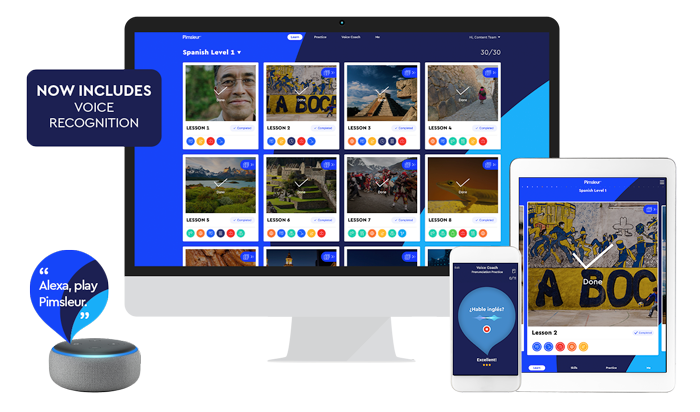
Start your FREE 7-Day Trial of Pimsleur Latin American Spanish!
You'll engage in real-life dialogues that you might encounter on your journey, from ordering at a restaurant to asking for directions or conversing with locals. Pimsleur also includes a unique 'Driving Mode' for on-the-go learning.
RELATED: Spain Spanish vs Mexican Spanish: How To Choose The Best Dialect For You .
With its robust features, Pimsleur makes it easy to gain confidence in speaking and understanding Spanish before embarking on your trip.

Picking up some Spanish before your trip can make a big difference. Are you ready to try ordering food in Spanish at a bustling local restaurant?
Imagine navigating through a busy South American market with confidence, chatting with vendors and finding hidden gems.
Dive into the vibrant Latin or European culture knowing these key phrases, and watch how doors open for you. Let's turn that upcoming trip into an unforgettable journey filled with rich conversations and connections!
A TINY REQUEST: IF YOU LIKED THIS POST, PLEASE SHARE THIS?
Ready to have some fun learning a new language? Then take action on what you just learned - you’ll be glad you did! Be a good friend and share this post on social media.
Also, share this post with anyone you know who’s looking to learn a foreign language! Just think how good you’ll feel when your friends thank you for bringing them insight and some surprising discoveries about language learning!
I know most people don’t share because they feel that us bloggers don’t need their “tiny” social share. But here’s the truth…
I built this blog piece by piece, one small share at a time, and will continue to do so. So thank you so much for your support, my reader.
A share from you would seriously help a lot with the growth of this blog.
Some great suggestions:
Pin it! (I even made a pretty pin for ya!)
Share it to Facebook
Flip it on Flipboard
It won’t take more than 10 seconds of your time. The share buttons are right here.:)
Thank you so much!
So, here’s the question: Which Spanish-speaking country are you traveling to? And why? Can you speak a little bit of Spanish or are you a complete beginner in the Spanish language? Let us know in the comments section down below!

P.S. I want to hear from you today. No for real, get out from behind that keyboard and tell us more about yourself! Use the comment section down below and introduce yourself.

Hey, I’m Mara.
I am the founder and blogger of Sololingual helping anyone at any age, from any place, who wants to learn a new language. You can learn how to reach fluency in your chosen language fast, fun and easily studying a short amount each day and spending very little money using different language learning techniques, programs and resources at your disposal. Fluency isn't difficult to achieve. In fact, it’s easy when you find a solid method that walks you through every step of the way, and believing in yourself so that you can achieve your goal at becoming fluent in any language.
More About My Story >>


Search This Site:


The Ultimate Guide: 100+ Useful Italian Phrases For Travel That You Need To Know!
40+ essential cantonese phrases made easy: a beginner's guide.
101 Common Spanish Phrases for Travel
It’s time to travel! Are you going to a Spanish speaking country? These 101 common Spanish phrases for Travel will help your trip go smoothly, and your journey will be much more enjoyable. If you can memorize these phrases before your trip, that’ll be ideal.
But let’s face it, you are busy. Most likely, you’ll be even busier as your departure date gets closer. But don’t worry, I have created this common Spanish phrases for travel pdf for you! It contains all the travel phrases and words that appear in this post.
Sign up to get your copy of our common Spanish travel phrases pdf for free!
Get Your Free Copy of the Survival Spanish Phrases for Travel!
Signup to receive our freebies and newsletter!
You have successfully joined our subscriber list. Please check your email.
101 Common Travel Phrases in Spanish PDF
Be sure to download it right now so you’ll have it on your cell phone, tablet, or laptop when you are abroad. It’s always a good idea to have it saved on your device, just in case you don’t have access to the Internet when you need it. You can sign up below to get a link to download the basic common Spanish phrases for the travel pdf file sent to you.
As an Amazon Associate, I earn from qualifying purchases. See our disclosure here .
What are the Common Spanish Phrases for Travel?
Here, we’ll cover 101 common Spanish phrases for travel that you will definitely want to know.
First, let’s start with basic greetings and pleasantries, and move on to some of the very common and super useful Spanish verbs. Then we’ll talk about some Spanish travel phrases for getting around and shopping.
Also, you’ll learn common Spanish phrases and words you will need at restaurants or hotels, and tourist activities.
Lastly, we finish up with the important Spanish phrases for emergencies, just in case. So, let’s begin!
What are the Spanish words for travel?
First, what are the words for travel in Spanish? Below are the words that mean travel or a trip.
To travel – Viajar
To go on a trip – Ir de viaje
A trip – un viaje
Basic Spanish Phrases for Travel: Greetings and Pleasantries
When you are traveling to a Spanish-speaking country, learning some basic Spanish phrases goes a long way. Even if you don’t pronounce them correctly or make mistakes, most people would appreciate the time and effort you put into learning their language. So let’s start with some very basic Spanish phrases for travelers.
Hi – Hola
You can use this any time of the day as it means “Hi” or “Hello”, but people usually say this and then say one of the other greeting phrases below depending on the time of the day. So, for example, you might say, “Hola, Buenos días.”
Good morning
Buenos días
This is normally used in the morning hours before 12 noon.
Good afternoon
Buenas tardes
Then you would switch to “ buenas tardes ” in the afternoon until it gets dark outside.
Buenas noches
People would start saying “buenas noches” when it’s dark outside…maybe around 6pm-ish.
Good Bye – Adiós
A typical goodbye in any Spanish-speaking country in the world.
See you later.
Hasta luego.
Even though you may not be seeing each other for a long time or ever like a store clerk, it is common to say “hasta luego ” especially in Spain.
Excuse me (Can I have your attention?) / (Can I pass by?)
Discúlpe / Con permiso
So “ Discúlpe” is used to get someone’s attention. “ Con permiso ” basically means “with your permission.” You would say this when you walk in front of someone or need to pass by people in a crowded place because they are blocking your way. It’s like saying, “Excuse me, I’m passing by you.”
It’s always polite and good etiquette to say “please” in any country, right?
Don’t forget to show your gratitude and appreciation when someone did something nice for you.
No thank you
If you are not interested, you can politely decline by saying, “no gracias.”
What is your name? – ¿ C ó mo se llama usted?
This is a formal version and an informal version is “ ¿C ómo te llamas?” In Mexico or Latin America, it would be better to use the formal version. In Spain, the informal version is pretty common unless you are speaking to someone who is much older than you or a government official, doctor, police officer, etc., you get the idea. A general rule of thumb is if your conversation partner looks about your age or younger, then it’s safe to use the informal version.
My name is ________. – Me llamo ______.
This means literally, “I call myself _______.” You can also say “Soy + your name.”
Nice to meet you. – Mucho gusto (Mexico), Encantado/a (Spain)
In most Latin American countries, “mucho gusto” is the most common way to say “nice to meet you.” In Spain, if you are female, you would say “encantada” ; and if you are male, you would say “encantado.”
How are you? – ¿ C ó mo est á usted?
This is a formal way to ask how a person is. If you are talking to a friend or someone about your age or younger, you can say, “ ¿C ómo est ás?”
I’m good. – Estoy bien.
Just a simple “bien” would work as well. However, to be more polite, you can add “gracias,” so it’ll be “estoy bien, gracias” or “bien, gracias.”
Do you speak English? – ¿Habla inglés?
If you are asking this question to someone, you probably don’t know this person. So it would be appropriate to use this formal form. If you are asking a child or someone who is about your own age or younger, you can use an informal form and say, “ Hablas inglés? “
I don’t speak Spanish. – No hablo espa ñ ol.
Yes / No – Sí / No
I’m sure you’ve heard of these before. Yes!
Traveling soon? Don’t forget to check out this list of 75 Best Travel Accessories to see if you already have them! Many of them are Anti-Theft Products to help protect you and your belongings!
Can you speak slowly? – ¿ Puede hablar m á s despacio?
Natives seem to speak really fast when you first start learning a new language. So you can ask them to speak slowly.
Can you repeat it? – ¿Puede repetirlo?
You can also ask them to repeat what they have just said by saying this phrase.
I understand – Entiendo.
If you understand what they are saying, you can say “entiendo.” If not, you can say the following…
I don’t understand – No entiendo.
Well, if you don’t understand what they are saying, don’t just agree. Make sure you understand what they are saying by asking them to write it down. Once it’s written down, you can use Google to translate it!
Can you write it down, please? – ¿Puede escribirlo?
Yup, ask them to write it down or at least confirm by repeating what was said. You might want to keep a pen in your purse when traveling.
A little – un poco
You may hear other versions like “un poquito” or “un poquit ín” meaning a little tiny bit.
A lot – mucho
Also, you can use “un montón” meaning “A LOT!”
Nothing – Nada
Well, I have nothing to add…ha ha ha, sorry… (by the way, in Spanish, ha ha ha is written “ja ja ja”)
What time is it? – ¿Qu é hora son? (Mexico), ¿ Qu é hora es? (Spain)
For some reason, in Mexico, hora (hour) is used as a plural form, that’s why “son” is used instead of “es.”
Common Spanish Verbs for Travel: Need, Want, and Have
I need ________.
Necesito ________.
I don’t need _____.
No necesito _______.
I want ________.
Quiero_________.
I don’t want _______.
No quiero ________.
Do you have ______?
Tiene ______?
I have _______.
Tengo ________.
I don’t have _______.
No tengo ______.
Spanish Phrases for Transportation and Getting Around
Where is the bus stop? – ¿D ónde est á la parada de autob ús?
If you are looking for a bus station/terminal where many buses meet, you can use “Central de autobuses”, “Terminal de autobuses”, or “Estaci ón de Autobuses.” The last one is more common in Spain.
Do you go to downtown? – ¿Va al centro?
If you are unsure about which bus to take, you can always ask the bus driver if his/her bus goes to where you intend to go before you get on.
How do I get to the Museum of Natural History? – ¿C ómo llego al museo de histor ia natural?
You can use this phrase to ask for directions to some place.
Is it close? – ¿Est á cerca?
This is a bit tricky one because in most Spanish-speaking countries, people often tell you “it’s close,” but that doesn’t really mean it’s close! It could be, but you just never know how a person feels about a distance.
Is it far? – ¿Est á lejos?
If it’s far, you can also ask “ ¿Cu ánto tiempo se tarda en llegar allí?” – How long does it take to get there? to clarify how far it is.
What time does the train leave? – ¿A qu é hora sale el tren?
Whether it’s your train, bus, or flight, you can use this phrase to ask its departure time. The bus is “el autob ús” and the flight is “el vuelo.”
It leaves at 8:30 in the morning. – Sale a las ocho y media de la mañana.
More about the numbers a little bit further down. If it’s in the morning, “ de la mañana” and in the afternoon and early evening, “de la tarde.” And at night, “de la noche” and in the really early morning would be “de la madrugada.”
What time does it arrive? – ¿A qu é hora llega?
So this is referring to the transportation or a third person (he/she/it). What time do we arrive? Would be “ ¿A qu é hora llegamos?”
It arrives at 3 in the afternoon. – Llega a las tres de la tarde.
If you want to say “We arrive” then use “Llegamos.”
Where can I buy tickets? – ¿ D ó nde puedo comprar boletos? (Mexico), ¿ D ó nde puedo comprar billetes?
In Mexico, tickets are called “boletos” ; but in Spain, they are called “billetes.” “Billetes” also meansbills in both countries. For example, “un billete de d ólar” means a dollar bill.
Round trip/one way – Viaje redondo / viaje sencillo (Mexico), ida y vuelta / S ó lo ida (Spain)
I would like 2 tickets. – Me gustar ía dos boletos. (First class, Economy class – premera clase, clase econ ómica )
Again, tickets are “billetes” in Spain. One ticket would be “un boleto” or “un billete.”
I missed my flight. – Perd í mi vuelo.
Literally, it means “I lost my flight.” So, you can swap the noun and say “Perd í mi maleta” – “I lost my suitcase” as well.
Here’s my passport. – Aqu í est á mi pasaporte.
Another similar phrase is “ Aqu í lo tiene,” basically meaning “here you have it” or “here it is.”
I’m here on vacation/on holiday. – Estoy aqu í de vacaciones.
In Spanish, vacation is usually plural “vacaciones.”
I’m going to stay for one week. – Me voy a quedar una semana (two weeks – dos semanas).
Staying only for a few days? Then you can say, “Me voy a quedar unos d í as.” “ Day” in Spanish is “d ía” (singular) and “d ías” (plural) and month in Spanish is “mes” (singular) and “meses” (Plural).
Where is the baggage claim? – ¿ D ónde está el reclamo de equipaje?
There are several different words for baggage claim: la cinta de maletas, la cinta de equipaje, la cinta de recogida de equipaje , etc. “Equipaje” means luggage.
I can’t find my suitcase. – No encuentro mi maleta.
If you can’t find a person, then you would add “a” in front of the person’s name. For instance, “No encuentro a Maria.”
How much does it cost to take me to________? (Taxi) – Cuanto por lleverme a _______?
Ask a cab driver how much it costs to take you to your destination before getting on the cab to avoid any unpleasant surprises. Researching how much a taxi to your destination should cost beforehand can give you a general idea.
Stop here, please. – Pare aqu í, por favor.
Wait a moment, please. – Espere un momento, por favor.
Is it free? (open/available) – ¿Est á libre?
Common Spanish Travel Phrases and Words for Shopping
I need to exchange dollars for pesos. – Necesito cambiar d ólares por pesos.
Banks in other countries tend to close earlier than the ones in the U.S. So if you think you might need to get some cash out, don’t forget to plan ahead.
Is there______? – ¿Hay _____?
This one is very easy but useful at stores, restaurants, and many other places.
What is that? – ¿Qué es eso?
You can point something and ask “ ¿Qué es eso?” If it’s right by you, then “ ¿Qu é es esto?” (What is this?).
Can I see it? – ¿Puedo verlo?
“ ¿Puedo?” means “Can I?” A very useful phrase. Definitely, it’s helpful to memorize this one.
I’m just looking. – Solo estoy mirando.
When you walk into a store and a store clerk asks you if they can help you find something. You can say , “ Solo estoy mirando. Gracias.” if you don’t intend to buy anything. At most department stores, store clerks work on commission, so they tend to be very eager to help you.
Can I try it on? – ¿Me lo puedo probar?
“El probador” means the fitting room.
Do you have size 40? – ¿Tiene talla cuarenta?
Clothing and shoe sizes are quite a bit different in each country, so be sure to check online before you go and get a general idea.
Numbers: 1, 2, 3, 4, 5, 6, 7, 8, 9, 10, 20, 30, 40, 50, 60, 70, 80, 90, 100
– N ú meros: uno, dos, tres, cuatro, cinco, seis, siete, ocho, nueve, diez, veinte, treinta, cuarenta, cincuenta, sesenta, setenta, ochenta, noventa, cien
This quick study guide is packed with useful information and has a section on numbers as well. It is a perfect reference flip chart for beginners.
You can also learn how to pronounce Numbers in Spanish in this post .
t’s too big/small – Es demasiado grande/chico (or chica).
“Grande” means big or large, and “chico(a)” means small (you can also use “peque ño(a)” ). I wouldn’t worry too much about whether the object you are referring to is a feminine or masculine noun at this point. People will understand you even if you don’t match the genders.
“Demasiado” means “too” something (adjective). So you can use it to say so many other things. For instance, “Es demasiado largo” (it’s too long), “Es demasiado corto” (It’s too short.).
How much is it? – ¿Cu ánto cuesta?
You can just point at something and say, “ ¿Cu ánto cuesta?” And if you are buying multiple ítems and want to know how much the total cost is, you can say, “ ¿Cu ánto cuesta en total?” or ¿Cu ánto es?
It’s too expensive. – Es demasiado caro.
Similar to the phrase above. “Caro(a)” means expensive, and “barato(a)” means cheap.
Can you give me a discount? – ¿ Me puede dar un descuento?
In Mexico and Latin America, if you are shopping at a local market, you can almost always get a discount. So it’s worth asking so you don’t end up paying tourist’s prices.
Do you have anything cheaper? – ¿Tiene algo m ás barato?
This is kind of similar to the one above. “Algo” means something or anything, and “m ás” means “more” and makes an adjective comparative when you put it before the adjective. Less is “menos.”
I’ll take it. – Me lo llevo.
If you like it and you’re going to buy it, then you’ll say “me lo llevo.” If you’re buying multiple items, a plural form of “ lo” which is “los” should be used. So you’ll say “me los llevo.” If you want to be super correct, select one of the followings “lo, la, los, or las” to match the gender of the item(s) you are purchasing…but that’s not crucial at all, so no worries.
Do you accept credit card? – ¿ Aceptan tarjeta de cr é dito?
Cash is “efectivo” and debit card is “tarjeta de d ébito” although most U.S. debit cards are not accepted at stores in foreign countries.
Check out these 75 Cool and Useful Travel Accessories You Can’t Leave without!
What time does it open? – ¿A qu é hora cierran?
In mid-to small-sized cities in Spain, many stores close for lunch for a few hours, then reopen after lunch. Their lunch is from about 2 pm to 4 or 5 pm.
What time does it close? – ¿A qu é hora abren?
Banks tend to close earlier than the ones in the U.S., and they often have different (shorter) business hours for Fridays and Summer months as well.
Useful Spanish at a Restaurant or Hotel
While traveling, these Spanish phrases will definitely come in handy. At a bar or café, you can just pick any available table, but I would recommend making a reservation if you are going to a restaurant.
I have a reservation. – Tengo una reservaci ón.
You can use this phrase at a restaurant or at a hotel when you check in.
Is there free wifi? – ¿Hay wifi grat ís?
“El Usuario” is the user name and “la contraseña” is the password.
I lost the key to my room. (at a hotel) – Perd í la llave de mi habitaci ó n.
It doesn’t work. – No funciona.
If something in your hotel room doesn’t work, you can say, “ No funciona + the thing that’s not working. ”
I would like _______. – Me gustar ía _______.
You can also say, “Quisiera______” “Quisiera” is a more polite form of “quiero” – I want.
I would not like_______. – No me gustar ía _______.
Is this spicy? – ¿Esto pica? or “Es picante?”
Mexican salsas can be super spicy, so I always ask before trying them…although they often say, “no, no pica nada!” – “no, it’s not spicy at all!” Spanish food is generally not spicy, though.
Is it sweet or salty? – ¿Est á dulce o salado?
If you are like me and enjoy trying new foods, you’ll need this phrase.
Gluten free – Sin gluten, Libre de gluten
Gluten-free products are not as common in Spain or Latin American countries as they are in the U.S. Or I should say most products are not labeled “gluten-free” as they are in the U.S.
The bill, please. – La cuenta, por favor.
You will need this phrase at restaurants.
Is tip included? – ¿ Est á incluído la propina?
In Spain, tipping is not customary at Tapas bars although appreciated. However, when dining at a restaurant in both Spain and Mexico, 10-15% of the bill is common if the service fee is not included.
Where is the bathroom? – ¿ D ó nde est á el ba ñ o? or “ ¿ D ó nde est án los ba ñ os? (plural)
Another word for the restroom is “ el servicio )” in Spain.
Occupied/busy – Ocupado
For example, “El ba ño est á ocupado.” – The bathroom is occupied.
“Estoy ocupado(a)” – I’m busy.
Vacant – Libre (bathroom), Vacante (hotel rooms)
“Libre” also means available or free.
Essential Spanish Phrases for Tourist Activities
Is it free? (no cost) – ¿Es grat ís?
Can I enter? (is it allowed to enter?) – ¿Se puede entrar?
If you are not sure if it’s okay to enter, it’s good to ask first, especially at religious places or semi-private tourist spots.
Is it safe? – ¿Es Seguro?
Is it dangerous? – ¿Es peligroso?
No smoking – No fumar.
Smoking is prohibited in enclosed public places in at least Spain and Mexico. So, bars, restaurants, nightclubs, etc. are non-smoking.
Do not touch – No tocar.
You’ll often see a sign with this phrase and an image of a hand crossed out at museums, historical buildings, etc.
I want to go to _______. – Quiero ir ______.
You can use this phrase for a taxi driver, a bus driver, someone when you are asking for a direction, etc.
Important Spanish Phrases for Emergencies
Can you help me? – ¿Me puede ayudar?
If you need help with your luggage or you are lost, this phrase will come in handy.
My wallet was stolen. – Me robaron mi caretera.
“Me robaron” + whatever the item that was robbed. Be extra careful of pickpockets, especially in big cities or in crowded places.
I don’t feel well. – No me siento bien.
When you feel better, you can say, “me siento mejor.” “Mejor” means better, and “peor” means worse.
My stomach hurts – Me duele el est ómago.
The basic structure of this sentence is “Me duele” + the part of your body that is hurting. You can also find more phrases and vocabulary about your physical conditions on this post.
I need to go to hospital. – Necesito ir al hospital.
Remember the “H” is silent. So, you would pronounce “hospital” as though it’s “ospital” with an accent on the “a”.
Help! – ¡Socorro!
Hopefully, you won’t need to use this one or any of these phrases in this emergency section while traveling, but it’s better to be prepared. So, don’t forget to memorize this word just in case.
Are You Ready to Use These Spanish Phrases for Travel?
I’m so excited for you that you are going to Spanish-speaking countries soon or planning a trip in the future. Hope you have a super fun adventure wherever and whenever you go! I hope these Spanish travel phrases help your trip be trouble-free and filled with wonderful, lasting memories.
Oh, did you download our free basic Spanish phrases pdf ? You can print it out and tuck it in your backpack pocket or save it on your digital devices. Here’s where you can download it.
Oh, one last thing…
How to say be safe in Spanish?
In Spanish, “Be safe!” can be translated as either one of these four phrases.
¡Que vuelvas sano y salvo! (Hope you return safe and sound)
¡Que regreses sano y salvo! (Hope you return safe and sound)
¡Que te vaya bien en tu viaje! (Hope everything goes well with your trip)
¡Que te salga bien en tu viaje! (Hope everything turns out well for your trip).
As you have noticed that their literal translations are a bit different, but these are the closest phrases in Spanish that there are to “be safe” in English.
Don’t forget to check out this post: How to say Airport in Spanish: Spanish words and phrases you need at the airport.
Have an amazing trip and Happy Spanish-ing!
Interested in Learning Conversational Spanish?
Try these posts and unlock your Spanish superpower!
- 30 Spanish Conversation Starters Every Spanish Learner Should know
- 15 Fun and Easy Spanish Learning Hacks I Used to Become F luent Fast
- Spain vs Mexico: What Are the Differences between Spain Spanish and Mexican Spanish?
- 20 Popular Songs in Spanish: Latin Music for Learning Spanish Fast!
- 101 Survival Spanish Phrases for Travel Every Traveler Needs to Know
- How to Introduce Yourself in Spanish
- Easy Spanish Greetings: How to Greet in Spanish
Pin it for Later!
Click here to see “75 Super Useful Travel Essentials Every Traveler Needs!”
Nice job! You got the basic Spanish phrases for greetings down. Now a little bit longer phrases, but don’t worry, they are not too complicated. Trust me, it’s worth learning these Spanish phrases.
© 2020 Spanish Unlocked
- Conversations
- Food & Drinks
- Privacy Policy
- Skip to primary navigation
- Skip to main content
- Skip to primary sidebar
- Skip to footer
StoryLearning
Learn A Language Through Stories
67 Essential Spanish Travel Phrases Every Traveller Needs To Know
Spain. Mexico. Argentina. Peru. Colombia.
If you're learning Spanish , the mere the mention of these countries can leave you daydreaming about your next trip abroad.
And although there are many incredible things to do and see in Spanish-speaking countries, what really makes these places special are the local people.
So before you pack your bags and jump on a plane, why not learn a little Spanish to help you make the most of your trip?
In this post, you’ll learn 67 Spanish phrases for travel that can help you survive in the language during your trip abroad.
It's the best way to learn Spanish for travel and vacations. And who knows, they might even help you make a few new friends too!
To make it easier for you, I’ve divided the phrases up into different categories:
Table of Contents
Take the time to learn a few of these key Spanish travel phrases and you’ll be able to mix with the locals, get by in various situations and have a much more enjoyable and authentic experience during your trip.
By the way, if you want to learn Spanish in time for your trip, my top recommendation for language learners is my Uncovered courses, which teach you through StoryLearning®. Click here to find out more and try out the method for free.
Keep scrolling to discover all 67 Spanish travel words and expressions.
First Things First: Greetings To Use On Arrival
Knowing how to greet people is the most basic thing you can learn in a foreign language. And yet its importance shouldn't be underestimated.
Even if you aren’t fluent enough to hold a long conversation, a simple ¡Hola! ¿Qué tal? (Hello, how are you?) can make all the difference.
You'll be able to use these expressions as soon as you arrive at your destination, whether it's at the airport, the train or bus station, or the hotel.
People appreciate it if you make an effort to speak their language when you visit their country, even if it’s only a few words.
Spanish-speaking countries are especially polite and greeting people correctly will go a long way towards endearing you to the locals, be they friends, people you meet in shops or on the street.
- ( BWAY-nos DEE-as)
- (BWAY-nas TAR-des)
- (BWAY-nas NOH-chays)
- (KOH-moh eh-STAH)
- (KOH-moh eh-STAHS)
- (bee-EN GRA-thee-as [Spain] / GRA-see-as [Latin America])
- (KOH-moh te YA-mas?)
- (May YA-moh… )
- (MOO-choh GOO-stoh)
And of course, let’s not forget common courtesy!
- (por fa-BOR)
- (GRA-thee-as [Spain] / GRA-see-as [Latin America])
If you get stuck in your Spanish conversation, you can always fall back on these next two phrases to get you out of trouble.
- (yo no en-tee-EN-doh)
- (Ab-la in-GLAYS)
Get What You Want On Your Trip With The Verb Querer
Once you’ve finished greeting someone, you’ll need to be able to move on to the crux of your conversation and to do that you’ll need to learn a couple of common verbs.
There are hundreds of Spanish verbs to learn and, to make your life more difficult, these verbs conjugate (change form).
This means learning a verb is never as simple as learning one word; you have to learn multiple different forms.
Having said that, you might be surprised by how far you can get only knowing one simple verb: I want .
It may not make you the most sophisticated Spanish speaker but 9 times out of 10 it will get you what you, well, want .
The verb in question is querer (to want) and in the first person form, it becomes quiero (I want).
Let’s take a look at how you can use it:
- (yo kee-EH-ro oon me-NOO)
- (YO kee-EH-ro oon taxi)
- (yo kee-EH-ro OO-na ser-BAY-za)
If you’d like to be a bit more polite (which is usually a good idea), you can also use:
- (kee-see-EH-ra…)
Asking For & Understanding Directions On Your Trip
Whether you’re looking for the toilet in a restaurant or trying to find a hotel to stay at, you’ll inevitably need to ask for directions at some point during your trip.
The simplest way to ask where something is, is to use ¿Dónde está? followed by the noun you are looking for:
- (DON-day es-TAH el BAH-nyo?)
- (DON-day es-TAH el BAN-koh?)
- (DON-day es-TAH la KA-yay de al-cal-AH?)
When travelling in a foreign country, if you're asking someone on the street for directions, don’t forget your manners! To get someone’s attention, start by saying:
- (Dis-KUL-pay)
- (Con per-MEE-soh / Per-DOH-nah-may)
- (eh- stoy per-DEE-doh)
Asking for directions is one thing but it’s pretty pointless if you don’t know how to understand the directions that are given to you!
Memorise these phrases to help you understand what the friendly locals are trying to tell you when you ask for their help:
- (A la de-RE-cha)
- (A la iz-kee-ER-da)
- (De-RE-cho)
- (En la es-KEE-nah)
- (a OO-na KWAD-rah)
Getting Around Spanish-Speaking Countries
If you’re not keen on walking everywhere, you'll need to be able to find out about local transport options to find your way around wherever you are.
Whether you're travelling to Mexico , Spain or anywhere else in the Hispanic world, here are a few simple phrases you can use to locate a bus, train or taxi and get to wherever you need to go:
- (DON-day PWAY-doh en-kon-TRAR oon taxi?)
- (DON-day eh-STAH la pa-RAH-dah de ow-to-BOOS mas ser-KA-nah?)
- (DON-day eh-STAH la es-tah-see-ON de ferro-carr-EEL mas ser-KA-nah?)
- (KWAN-to KWES-ta oon bee-YET-ay PA-ra …)
- (oon bee-YET-ay PA-ra … por fa-BOR)
At A Restaurant On Your Travels
Each Spanish-speaking country has its own unique flavours and cuisine for you to try when you travel!
Food is definitely one of the big attractions to cities like San Sebastian in Spain and Buenos Aires in Argentina , so you'll need to make sure you have a basic grasp of food vocabulary ahead of your journey!
To start with, you need to be prepared to hear and understand certain questions in restaurants, such as:
- (kee-EH-res AL-go PA-ra koh-MER?)
- (kee-EH-res AL-go PA-ra beh-BER?)
- (KAY kee-EH-res koh-MER?)
When you read the menu, you'll see the available food grouped into different categories, just like in an English menu:
- (oo-na en-TRA-da)
- (oon PLA-toh prin-si-PAL)
- (oon POS-tray)
- (OO-na beh-BEE-da)
When you're ready to order, use either quiero (I want) or quisiera (I would like) with the items on the menu to tell the waiter what you'd like. For example, quiero…
- (OO-na SOH-pah)
- (OO-na en-sa-LA-da)
- (el POY-oh)
- (la CAR-nay)
- (oon AG-wa)
- (oon BEE-noh TIN-toh / BLAN-koh)
- (OO-na ser-BAY-sa)
- (oon ka-FAY)
So, for example, to order that ice-cold beer you're looking forward to at the end of a long day, you'd say quiero una cerveza.
If you're not sure what to try, you can always ask your waiter for a recommendation:
- (kay may re-kom-ee-EN-dah?)
In most restaurants in Spanish-speaking countries, the staff will be more than happy to suggest a particularly tasty local dish for you to try.
If you're a vegetarian or you have dietary complications, these next two phrases are essential:
- (soy be-he-tah-ree-AH-noh/nah)
- (TEN-go al-ER-hee-ah a las noo-EH-ses)
Finally, let's learn a couple of quick phrases you can use to ask about prices and pay the bill.
- (KWAN-to KWES-ta? )
- (la KWEN-ta por fa-BOR)
Key Spanish Question Words For Your Trip
Over the course of your journey, you'll almost certainly find yourself asking lots and lots of questions.
You might not have a huge Spanish vocabulary to draw on, but if you know the basic question words, you'll be able to get by in almost any common situation you might find yourself in.
Here are some key Spanish question words you need to know:
- (KWAN-doh?)
- (A kay AW-ra?)
- (KWAN-toh?)
- (KWAN-tohs)
- (kah-dah KWAN-toh?)
- (por KWAN-toh tee-EM-poh)
Once you’ve got these question words in your memory bank you’ll start noticing the patterns in Spanish grammar which will help you to move away from the basic Spanish phrases every tourist is using.
As you learn new words on your trip, you'll be able to combine them with these question words to start forming your own sentences and questions!
FAQs About Spanish Travel Phrases
What are 10 vacation phrases in Spanish?
The 10 key vacation phrases in Spanish are: ¡Hola! – Hello Por favor – Please Gracias – Thank you Disculpe – Excuse me ¿Habla inglés? – Do you speak English? Quiero un menú – I want a menu ¿Dónde está el cajero automático? – Where is the ATM? ¿Cuánto cuesta? – How much is it? ¿Dónde puedo encontrar un taxi? – Where can I get a taxi? Un billete para Barcelona, por favor. – A ticket to Barcelona, please.
What is a popular Spanish phrase?
If you’re visiting a Spanish-speaking country, the most popular phrase you’ll use will be the basic greeting Hola , which means “Hello.” Other possible examples are greetings like Buenos días (Good morning), Buenas tardes , (Good afternoon) and Buenas noches , (Good evening) as well as everyday expressions like Gracias (Thank you) Por favor (Please) and Perdón (Sorry).
What is the vocabulary for travelling in Spanish?
The vocabulary for travelling in Spanish is made up of different kinds of basic words and phrases.
First, familiarise yourself with the belongings and key objects you’re bringing to the aeropuerto (airport) or estación (station):
Equipaje – Luggage Maleta – Suitcase Mochila – Backpack Pasaporte – Passport Boleto – Ticket
Then, name some of the attractions you could visit in the next city you visit:
Monumento – Monument Museo – Museum Plaza – Square Parque – Park Edificio histórico – Historic building Cine – Cinema Restaurante – Restaurant Catedral – Cathedral Iglesia – Church Puente – Bridge Zona comercial – Shopping area
What are the 7 most common words to survive in a Spanish-speaking country?
¡Hola! – Hello Por favor – please Gracias – thank you Disculpe – Excuse me ¿Dónde? – Where? ¿Cuánto cuesta? – How much is it? Quiero… – I want…
Get Ready For Adventure With These Spanish Travel Phrases!
Take the time to memorise these key Spanish travel phrases and you'll have everything you need to get the most out of your journey.
With just a few words of Spanish, I'm sure you'll meet lots of amazing people and have plenty of life-changing experiences along the way.
Who knows, perhaps spending some time visiting a Spanish-speaking country will motivate you to strive for fluency?
If this article has inspired you to both travel and to learn Spanish, then I've got something to get you started on your Spanish learning journey.
I'm a big believer in the power of story to enable you to learn a language. That's why I've created an entire beginner course dedicated to learning Spanish by immersing yourself in an engaging story.
It's my Spanish Uncovered course, and it's designed to take you from beginner to B1 Intermediate level.
Click here for more information on the course, test it out for free and to find out how it'll help you.
Language Courses
- Language Blog
- Testimonials
- Meet Our Team
- Media & Press
Steal My Method?
I’ve written some simple emails explaining the techniques I’ve used to learn 8 languages…
Which language are you learning?
What is your current level in
Where shall I send them?
We will protect your data in accordance with our data policy.
Perfect! You’ve now got access to my most effective tips…
Download Your Free StoryLearning® Kit!
Discover the world famous story-based method that 1,023,037 people have used to learn a language quickly…
What is your current level in
WAIT! Don't skip this next step…
Welcome aboard!
You're about to discover the StoryLearning secrets thousands of my students have used to master Arabic!
But first, we need to make sure my emails arrive safely!
It will take less than 30 seconds. Here's what you need to do:
1) Go to your inbox & look for the email I just sent (Gmail users click here)
2) Mark the email as “important” & add me to your contact list
3) Send me a quick reply and say hi!
I'll see you on the other side
4) Start learning Spanish through story now with a FREE 7-day trial of Spanish Uncovered
What is your current level in [language]?
Perfect! You’ve now got access to my most effective [level] [language] tips…
Where shall I send them?
Download this article as a FREE PDF ?
What is your current level in Latin?
Perfect! You’ve now got access to my most effective [level] Latin tips…
Where shall I send the tips and your PDF?
What is your current level in Norwegian?
Perfect! You’ve now got access to my most effective [level] Norwegian tips…
What is your current level in Swedish?
Perfect! You’ve now got access to my most effective [level] Swedish tips…
What is your current level in Danish?
Perfect! You’ve now got access to my most effective [level] Danish tips…
NOT INTERESTED?
What can we do better? If I could make something to help you right now, w hat would it be?
What is your current level in [language] ?
Perfect! You’ve now got access to my most effective [level] [language] tips, PLUS your free StoryLearning Kit…
Download this article as a FREE PDF?
Great! Where shall I send my best online teaching tips and your PDF?
Download this article as a FREE PDF ?
What is your current level in Arabic?
Perfect! You’ve now got access to my most effective [level] Arabic tips…
FREE StoryLearning Kit!
Join my email newsletter and get FREE access to your StoryLearning Kit — discover how to learn languages through the power of story!
Download a FREE Story in Japanese!
Enter your email address below to get a FREE short story in Japanese and start learning Japanese quickly and naturally with my StoryLearning® method!
What is your current level in Japanese?
Perfect! You’ve now got access to the Japanese StoryLearning® Pack …
Where shall I send your download link?
Download Your FREE Natural Japanese Grammar Pack
Enter your email address below to get free access to my Natural Japanese Grammar Pack and learn to internalise Japanese grammar quickly and naturally through stories.
Perfect! You’ve now got access to the Natural Japanese Grammar Pack …
What is your current level in Portuguese?
Perfect! You’ve now got access to the Natural Portuguese Grammar Pack …
What is your current level in German?
Perfect! You’ve now got access to the Natural German Grammar Pack …
Train as an Online Language Teacher and Earn from Home
The next cohort of my Certificate of Online Language Teaching will open soon. Join the waiting list, and we’ll notify you as soon as enrolment is open!
Perfect! You’ve now got access to my most effective [level] Portuguese tips…
What is your current level in Turkish?
Perfect! You’ve now got access to my most effective [level] Turkish tips…
What is your current level in French?
Perfect! You’ve now got access to the French Vocab Power Pack …
What is your current level in Italian?
Perfect! You’ve now got access to the Italian Vocab Power Pack …
Perfect! You’ve now got access to the German Vocab Power Pack …
Perfect! You’ve now got access to the Japanese Vocab Power Pack …
Download Your FREE Japanese Vocab Power Pack
Enter your email address below to get free access to my Japanese Vocab Power Pack and learn essential Japanese words and phrases quickly and naturally. (ALL levels!)
Download Your FREE German Vocab Power Pack
Enter your email address below to get free access to my German Vocab Power Pack and learn essential German words and phrases quickly and naturally. (ALL levels!)
Download Your FREE Italian Vocab Power Pack
Enter your email address below to get free access to my Italian Vocab Power Pack and learn essential Italian words and phrases quickly and naturally. (ALL levels!)
Download Your FREE French Vocab Power Pack
Enter your email address below to get free access to my French Vocab Power Pack and learn essential French words and phrases quickly and naturally. (ALL levels!)
Perfect! You’ve now got access to the Portuguese StoryLearning® Pack …
What is your current level in Russian?
Perfect! You’ve now got access to the Natural Russian Grammar Pack …
Perfect! You’ve now got access to the Russian StoryLearning® Pack …
Perfect! You’ve now got access to the Italian StoryLearning® Pack …
Perfect! You’ve now got access to the Natural Italian Grammar Pack …
Perfect! You’ve now got access to the French StoryLearning® Pack …
Perfect! You’ve now got access to the Natural French Grammar Pack …
What is your current level in Spanish?
Perfect! You’ve now got access to the Spanish Vocab Power Pack …
Perfect! You’ve now got access to the Natural Spanish Grammar Pack …
Perfect! You’ve now got access to the Spanish StoryLearning® Pack …
Where shall I send them?
What is your current level in Korean?
Perfect! You’ve now got access to my most effective [level] Korean tips…
Perfect! You’ve now got access to my most effective [level] Russian tips…
Perfect! You’ve now got access to my most effective [level] Japanese tips…
What is your current level in Chinese?
Perfect! You’ve now got access to my most effective [level] Chinese tips…
Perfect! You’ve now got access to my most effective [level] Spanish tips…
Perfect! You’ve now got access to my most effective [level] Italian tips…
Perfect! You’ve now got access to my most effective [level] French tips…
Perfect! You’ve now got access to my most effective [level] German tips…
Download Your FREE Natural Portuguese Grammar Pack
Enter your email address below to get free access to my Natural Portuguese Grammar Pack and learn to internalise Portuguese grammar quickly and naturally through stories.
Download Your FREE Natural Russian Grammar Pack
Enter your email address below to get free access to my Natural Russian Grammar Pack and learn to internalise Russian grammar quickly and naturally through stories.
Download Your FREE Natural German Grammar Pack
Enter your email address below to get free access to my Natural German Grammar Pack and learn to internalise German grammar quickly and naturally through stories.
Download Your FREE Natural French Grammar Pack
Enter your email address below to get free access to my Natural French Grammar Pack and learn to internalise French grammar quickly and naturally through stories.
Download Your FREE Natural Italian Grammar Pack
Enter your email address below to get free access to my Natural Italian Grammar Pack and learn to internalise Italian grammar quickly and naturally through stories.
Download a FREE Story in Portuguese!
Enter your email address below to get a FREE short story in Brazilian Portuguese and start learning Portuguese quickly and naturally with my StoryLearning® method!
Download a FREE Story in Russian!
Enter your email address below to get a FREE short story in Russian and start learning Russian quickly and naturally with my StoryLearning® method!
Download a FREE Story in German!
Enter your email address below to get a FREE short story in German and start learning German quickly and naturally with my StoryLearning® method!
Perfect! You’ve now got access to the German StoryLearning® Pack …
Download a FREE Story in Italian!
Enter your email address below to get a FREE short story in Italian and start learning Italian quickly and naturally with my StoryLearning® method!
Download a FREE Story in French!
Enter your email address below to get a FREE short story in French and start learning French quickly and naturally with my StoryLearning® method!
Download a FREE Story in Spanish!
Enter your email address below to get a FREE short story in Spanish and start learning Spanish quickly and naturally with my StoryLearning® method!
FREE Download:
The rules of language learning.
Enter your email address below to get free access to my Rules of Language Learning and discover 25 “rules” to learn a new language quickly and naturally through stories.
What can we do better ? If I could make something to help you right now, w hat would it be?
Perfect! You’ve now got access to my most effective [level] [language] tips…
Download Your FREE Spanish Vocab Power Pack
Enter your email address below to get free access to my Spanish Vocab Power Pack and learn essential Spanish words and phrases quickly and naturally. (ALL levels!)
Download Your FREE Natural Spanish Grammar Pack
Enter your email address below to get free access to my Natural Spanish Grammar Pack and learn to internalise Spanish grammar quickly and naturally through stories.
Free Step-By-Step Guide:
How to generate a full-time income from home with your English… even with ZERO previous teaching experience.
What is your current level in Thai?
Perfect! You’ve now got access to my most effective [level] Thai tips…
What is your current level in Cantonese?
Perfect! You’ve now got access to my most effective [level] Cantonese tips…
I want to be skipped!
I’m the lead capture, man!
Join 84,574 other language learners getting StoryLearning tips by email…
“After I started to use your ideas, I learn better, for longer, with more passion. Thanks for the life-change!” – Dallas Nesbit
Perfect! You’ve now got access to my most effective [level] [language] tips…
Find The Perfect Language Course For You!
Looking for world-class training material to help you make a breakthrough in your language learning?
Click ‘start now’ and complete this short survey to find the perfect course for you!
Do you like the idea of learning through story?
Do you want…?

Spanish for Travelers – Vocabulary and Phrases
Are you traveling to a Spanish-speaking country ? In this post we are going to learn the basic Spanish vocabulary and phrases for travelers .
We also have published posts about specific situations that arise when traveling (booking a hotel, ordering in restaurants…).
So if you want to know the words and phrases for those specific situations, make sure to check them out clicking on these links:
And now, let’s learn some general vocabulary and phrases for travelers! ✈️🚗
¡Nos vamos de viaje el viernes que viene! We are going on a trip next Friday! Aún tenemos que hacer las maletas. We still have to pack our bags. Vamos en avión / barco / tren / autobús. We go by plane / ship / train / bus. Salimos a las 11 y llegamos a Mallorca a las 16. We leave at 11 and arrive in Mallorca at 16. Estoy buscando un hotel. I’m looking for a hotel. He comprado una guía de viaje. I’ve bought a travel guide. ¿Es cara la ciudad? Is the city expensive? Disculpe, ¿para ir al museo? Excuse me, how do I go to the museum? ¿Hay una oficina de información turística por aquí? Is there a tourist information office around here? ¿Qué tal el viaje? How was the trip? El viaje estuvo genial. The trip was great. Lo pasamos estupendamente. We had a great time.
Things we carry with us
Means of transportation.

Contact Us - Privacy Policy - Terms and Conditions

- Learning Method
- Spanish Culture
- Spanish Grammar
- Spanish Travel
- Spanish Vocabulary and Expressions
- Study Guide
- Spanish Language Accelerator Program
- Online Courses
- Books / Audiobooks
50 Essential Spanish Phrases for Travelers
0 Comments
January 10, 2018
Follow Us Now
Your bags are packed and everything’s all set. But wait--before you leave for a Spanish-speaking destination, make sure you’re armed and ready with this list of the very basic Spanish travel phrases.
Just a few essential phrases are enough to tide you over during your trip, so make sure to have this list handy or better yet, memorize them! Don’t worry, it’s super easy, and the pronunciation won’t trip you up at all.
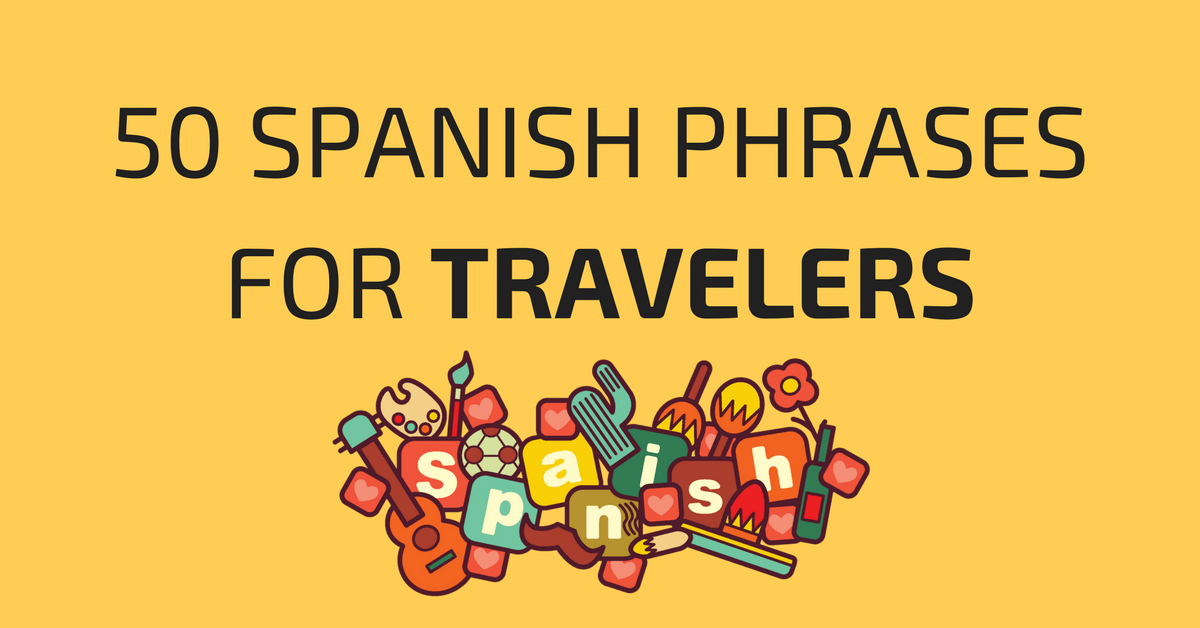
Get this list in PDF format
You can also download this list in a printer-friendly PDF version. Simply click the download button below.
So are you ready?
Here is your list!
Common Spanish Travel Phrases

there you have it---your list of the most common Spanish travel phrases.
You can also read some related articles here:
[Quiz] Do you know these common Spanish phrases?
50 Common Spanish Phrases
For a more complete list of Spanish phrases, grab your copy of the Spanish Phrasebook by My Daily Spanish! It’s got all the phrases you need to survive---and even thrive---in a Spanish-speaking environment.
Make your travel hassle-free with this e-book that covers all possible scenarios while traveling in a Spanish-speaking country. Check it out below!
About the author
Janey is a fan of different languages and studied Spanish, German, Mandarin, and Japanese in college. She has now added French into the mix, though English will always be her first love. She loves reading anything (including product labels).
Session expired
Please log in again. The login page will open in a new tab. After logging in you can close it and return to this page.

The Ultimate Guide to Spanish Travel Phrases: 95 Expressions You Need to Learn
If you’re looking to learn some basic Spanish for a trip to a Spanish-speaking country, going the whole “grammar and word list” route is a bit complex and time-consuming.
Good news: learning Spanish travel phrases instead won’t only help you learn Spanish you can use right away in conversations…
Contrary to what many people think, such phrases aren’t even just a quick “hack” but a valid long-term strategy to learn Spanish and other languages (as I outline in my article about Spanish for beginners ).
Anyway, more on that in a bit. First, let’s teach you some Spanish travel phrases!
1. Spanish Travel Phrases to Use Upon Arrival
First things first. If you’re planning to go to a Spanish-speaking country, learning how to greet people and be polite is a must. Otherwise, starting a Spanish conversation can be difficult.
No matter what kind of transportation you use to get to a Spanish-speaking place, you probably will have to deal with different kinds of workers.

The best thing you can do if you want to ask for information, or just catch some worker’s attention, is to be polite and show respect.
Keep in mind that if you want to be formal, you’ll say and conjugate verbs using “ usted ”. If you’re just talking with friends or someone you know, it’s enough to use “ tú ”.
Now, let’s see some chunks that will help you be ready on Arrival at your destination.
Spanish phrases to use upon arrival
Since you’re trying to improve your Spanish, we would recommend not to use “¿Habla ingles?” as the first alternative. If you do it, natives will try to find someone that could speak with you in English.
Yet, if you find that communicating becomes complicated, it may save your day.
On the other hand, using “ ¿Me puede ayudar? ” is among the best alternatives if you need help when arriving at the airport or any place. People will know immediately that you require assistance to do or get something.
If you use transportation like Taxis or Buses, dealing with luggage isn’t a challenge. But, if you take an airplane, and finding your luggage isn’t that easy, you can take advantage of the last phrase above.
No matter what your needs are, you should always use the following chunks if someone helps you or you ask for help.
Ask for help with these chunks
Saying “ Por favo r” and “ Gracias ” will not only help you to show respect. Also, they will indeed help you to “open” doors as people will always be willing to help you one more time.
For more airport Spanish, watch this video by Paulisima from Spring Spanish (a YouTube channel I co-founded):
2. Spanish Travel Phrases When You Need or Want Something
When traveling, Necesitar and Querer are two Spanish verbs that will help you in several situations.

There are plenty of Spanish chunks you can learn and use with Necesitar and Querer . However, we will stick to the most important.
Travel vocabulary in Spanish: Necesitar and Querer
With these Spanish travel phrases, you’ll get any problem solved. From your basic needs to things on your bucket list like going partying in a Spanish-speaking country.
3. Spanish Travel Phrases for Partying
Latin American people are among the most cheerful people all over the world, and hanging out with them is an unforgettable activity.
You could learn the following Spanish phrases when you’re out having the best time of your life! 😉
Spanish Phrases for When You’re Partying
There are plenty of other Spanish phrases for travel you could learn… and in general, learning as many fixed phrases as possible (or chunks, as we call them) will help you speak Spanish more effortlessly in all kinds of situations.
You can learn them through actual conversation, but also through Spanish podcasts, Spanish YouTube channels , or check out the best Spanish shows on Netflix.
If you’d like to learn more about learning Spanish through chunks, go ahead and request your free Spanish Chunking Starter Pack.
4. Spanish Travel Phrases When Asking for Directions
Although most Spanish speakers are quite friendly because of their culture and way of living, getting along with them on the streets may not be as simple as that. It’s because some people feel that talking to strangers isn’t appropriate or just “not safe”.
When approaching someone you don’t know on the streets, you must keep your distance and use some of the following Spanish phrases.
Approach someone with these chunks
The approach is the most important step. After, it’s time to ask or request what you need. If you’re lost and you need an address or need help, the following chunks will help you get the job done.
Travel tips: Get help with these Spanish chunks
After you get all you need and it’s time to move forward, saying “ Gracias ” to the ones who helped you is essential.
It’s always important to say thanks. It will help you end the conversation and leave an “ open door ” to ask for help again if necessary.
Time to see some of these phrases/chunks in action! Here’s Maria Fernanda, one of the Spring Spanish teachers:
5. Spanish Travel Phrases for the Hotel
If you’re a traveler there’s no doubt that you’ll face some challenges when looking for accommodation. Let’s imagine you need to get a room and you have to talk to the staff of a hotel. Depending on your needs, there are several things you’ll have to ask.

For example, room type, if the price includes breakfast, or other things like if you have access to the pool.
Solve challenges at a hotel with these Spanish phrases
Please note that if you have made a reservation, you’ll need either your name or a reservation number. If you get a reservation number, you would say “ Hice una reserva con número…. ” instead of “ Tengo una reserva a nombre de… ”. Learn all the Spanish numbers .
Getting a room with breakfast included is generally a great option. In that scenario, you could say “ Quiero el servicio de desayuno incluido ” (I want breakfast included). No matter what you ask or need, remember to use formal language and make use of “ usted ”.
Here’s a good video about checking into a hotel, brought to you by Paulisima from Spring Spanish :
6. Spanish Travel Phrases for the Restaurant
After you managed to pack out everything in your hotel, you might want to grab something at the restaurant. Learning the basic travel phrases to order food will definitely help you when you’re hungry!

Useful travel phrases in a restaurant
7. Spanish Travel Phrases for the Hospital
Smart travelers always keep some medical supplies in their bags to face any kind of emergency. However, sometimes taking some pills won’t solve the problem, and learning Spanish travel phrases to deal with these situations is essential.

The following Spanish travel phrases will help you with your health-related concerns.
Spanish travel phrases: Health-related concerns
Although the Spanish chunks above will help you deal with most medical situations, sometimes, it’s necessary to explain any symptoms you might have. You can use “ Yo tengo ” before any of the Spanish words for travel shown below.
They’ll help you explain your symptoms and any Spanish-speaking doctor will have no problem at the moment of giving you the right prescription.
Explain symptoms with Spanish chunks
Tip: To make yourself understood to native speakers, especially in more complex situations like this, this article on Spanish connectors will come in handy. It’s an often-overlooked part of language learning but it can help you a lot.
Another tip: Want to see (and hear) all those phrases in action? Watch this video by Spring Spanish teacher Maura:
8. Spanish Travel Phrases for Everyday Situations
Although we provided you with the most important phrases for every possible situation, there are still some useful phrases left. Check out the following table to learn some of the most used Spanish travel phrases for everyday situations.

Use these phrases in everyday situations
9. Spanish Travel Phrases: Your Key to Effortless Conversations in Any Spanish-Speaking Country
No matter what Spanish-speaking country you visit, keeping these Spanish phrases for travel will indeed help you deal with any scenario.
Let’s check out a Spanish conversation with some basic Spanish travel phrases:
Ana : Hola, disculpe… (Hello, excuse me…) Berta : ¡Hola! ¿En qué puedo ayudarte? (Hello! How can I help you?) Ana : ¿Sabe cómo llegar a esta dirección? (Do you know how to get to this address?) Berta : Sí, claro. ¿A qué dirección necesitas ir? (Yes, of course. What address do you need to go to?) Ana : Un hotel en la Calle Principal. (A hotel on Main Street.) Berta : Está cerca. Camina dos cuadras hacia el oeste. (It’s nearby. Walk two blocks west.) Ana : Hice una reserva con número 16. (I made a reservation with the number 16.) Berta : Perfecto. Disfruta tu estadía. (Perfect. Enjoy your stay.) Ana : ¡Gracias! (Thank you!) Berta : De nada. ¡Que tengas un buen día! (You’re welcome. Have a nice day!)
LISTEN TO THE WHOLE CONVERSATION :
Of course, if communicating becomes too complex, don’t hesitate to use the old life-saving phrase “ ¿Habla ingles? ”.
Requesting your free Spanish Chunking Starter Pack from Effortless Conversation is the best you can do if you’re planning to visit a Spanish-speaking destination. You’ll build your confidence and will feel much more comfortable when speaking Spanish.
Lukas is the founder of Effortless Conversations and the creator of the Conversation Based Chunking™ method for learning languages. He's a linguist and wrote a popular book about learning languages through "chunks". He also co-founded the language education company Spring Languages, which creates online language courses and YouTube content.
Similar Posts

10 Most Common Spanish Verbs Conjugation with Conversation Based Chunking
Ready to learn about Spanish verbs? Connect these action words together with other parts of Spanish sentences to speak like a native. Spring Spanish (a…

Use The Spanish Conditional Tense Like A Pro: Conjugation + Examples
The Spanish conditional tense is one of the verb tenses that Spanish students prefer. How so? Because it is really, really easy to learn! Check…

40 Spanish Words That Start With A & Useful Spanish Dialogue Examples
The Spanish alphabet isn’t as boring as you’d imagine at first. It’s full of fun letters and fun facts about these letters. Did you know…

Y in Spanish: The Ultimate Guide for Meaning & 2 Different Pronunciations (with Examples)
If you’ve heard the letter Y in Spanish more than once and the pronunciation was different every time, don’t freak out! If you have doubts,…

Relative Pronouns Spanish: 7 Relative Pronouns In Spanish You Have To Know!
When learning a new language, there’s a special set of words that act like glue, sticking sentences together to give them more meaning. In Spanish,…

5 Ways to Say Happy Easter in Spanish: Spanish Easter Traditions Around the World + Audio
Easter is a time of renewal, celebration, and togetherness, marking one of the most important holidays in the Christian calendar, commemorating the resurrection of Jesus…

Spanish School in Mexico City

Spanish Travel Vocabulary: +50 Essential Words and Phrases for Your Next Trip
Are you planning a trip to a Spanish-speaking country like Mexico? Whether it’s for business or pleasure, knowing some basic Spanish travel vocabulary can go a long way in making your trip more enjoyable. From ordering food to asking for directions, having a few key phrases in your back pocket can help you navigate your way through any situation where you might need to speak Spanish.
Table of Contents
One of the most important phrases to know when traveling in a Spanish-speaking country is “¿Dónde está…?” This means “Where is…?” and can be used to ask for directions to a specific location, such as a restaurant, museum, or hotel. Another useful phrase is “Quiero reservar una habitación” which means “I want to book a room.” This can come in handy when you arrive at your destination and need to find accommodations.

Other essential Spanish travel vocabulary includes ordering food and drinks at restaurants or coffeshops. “La cuenta, por favor” means “The bill, please” and is a polite way to ask for your check at a restaurant. “Una cerveza, por favor” means “A beer, please” and is a simple way to order a drink. With a few basic phrases under your belt, you’ll be able to communicate more effectively and make the most of your trip to a Spanish-speaking country.
Basic Spanish Greetings
Hola and buenos días.
If you want to greet someone in Spanish , the most basic way to do it is by saying “Hola” or “Buenos Días”. “Hola” is equivalent to “Hello” in English, and “Buenos Días” means “Good Morning”. You can use these greetings at any time of the day, but “Buenos Días” is only appropriate to use in the morning.

Mucho Gusto and ¿Cómo Te Llamas?
When meeting someone new, it’s polite to introduce yourself and ask for their name. In Spanish, you can say “Mucho Gusto” which means “Nice to meet you”. After that, you can ask “¿Cómo te llamas?” which means “What’s your name?”.
¿Cómo Estás? and ¿Cómo Está?
If you want to ask someone how they are doing, you can say “¿Cómo estás?” if you are talking to someone familiar or “¿Cómo está?” if you are talking to someone more formal or older than you. Both of these phrases mean “How are you?”.
Remember that in Spanish, it’s common to use greetings and small talk before getting into the main topic of the conversation. Using these basic greetings can help you make a good first impression and show that you are friendly and polite.
- Use “Hola” or “Buenos Días” to greet someone.
- Say “Mucho Gusto” to introduce yourself.
- Ask “¿Cómo te llamas?” to ask for someone’s name.
- Use “¿Cómo estás?” or “¿Cómo está?” to ask how someone is doing.
Essential Spanish Travel Phrases
When traveling to a Spanish-speaking country, it’s always helpful to know some basic phrases to make your trip smoother. Here are some essential Spanish travel phrases to get you started.
Por Favor and Gracias
“Por favor” means “please” and “gracias” means “thank you.” These two phrases are essential when interacting with locals in Spanish-speaking countries. Here are some examples of when to use them:
- When ordering food: “Quisiera una mesa para dos, por favor” (I would like a table for two, please).
- When asking for directions: “¿Podría decirme cómo llegar al museo, por favor?” (Could you tell me how to get to the museum, please?).
- When receiving help: “¡Muchas gracias por su ayuda!” (Thank you very much for your help!).

Estoy Perdido and ¿Habla Inglés?
“Estoy perdido” means “I am lost” and “¿Habla Inglés?” means “Do you speak English?” These phrases can be especially useful when navigating a new city or asking for directions. Here are some examples:
- “Perdón, estoy perdido. ¿Podría ayudarme a encontrar la calle X?” (Excuse me, I am lost. Could you help me find X street?)
- “¿Habla Inglés? No hablo mucho español” (Do you speak English? I don’t speak much Spanish).
Quisiera and Aquí
“Quisiera” means “I would like” and “aquí” means “here.” These phrases can be useful when ordering food or making purchases. Here are some examples:
- “Quisiera un café con leche, por favor” (I would like a latte, please).
- “¿Tiene este suéter en mi talla? Quisiera probármelo” (Do you have this sweater in my size? I would like to try it on).
- “¿Cuánto cuesta este recuerdo aquí?” (How much does this souvenir cost here?).
By learning these essential Spanish travel phrases, you’ll be able to communicate more effectively with locals and make the most of your trip.
Spanish Vocabulary for Transportation
When traveling to a Spanish-speaking country, it’s important to know some basic transportation vocabulary to get around easily. Here are some common Spanish words and phrases related to transportation.
Airport and Airplane
If you’re flying to your destination, you’ll want to know some airport and airplane vocabulary.

- El aeropuerto – airport
- El avión – airplane
- El vuelo – flight
- La terminal – terminal
- El mostrador de facturación – check-in counter
- La puerta de embarque – boarding gate
- El equipaje – luggage
- La maleta – suitcase
- El control de seguridad – security checkpoint
Train and Bus
If you’re traveling by train or bus, you’ll need to know some vocabulary related to stations and schedules.

- El tren – train
- El autobús – bus
- La estación – station
- El horario – schedule
- El billete – ticket
- El andén – platform
- El tren de cercanías – commuter train
- El autobús urbano – city bus
Taxi and Uber
If you prefer to take a taxi or Uber , here are some useful words and phrases.

- El taxi – taxi
- El conductor – driver
- La tarifa – fare
- El taxímetro – meter
- La dirección – address
- El destino – destination
- El punto de recogida – pick-up point
- El número de teléfono del taxi – taxi phone number
Remember, knowing some basic Spanish transportation vocabulary can make your trip much easier and less stressful. So, whether you’re taking a plane, train, bus, taxi, or Uber, be sure to brush up on your vocabulary before you go.
Spanish Travel Vocabulary for Accommodation
Hotel and hostel.
If you’re planning a trip to Latam, you’ll need to know some basic Spanish vocabulary for accommodation. Whether you’re staying in a hotel or a hostel, it’s important to be able to communicate with the staff. Here are some key phrases to help you out:

If you’re staying in a hostel, you’ll want to know some additional vocabulary:
Inn and Room
If you’re looking for a more traditional Spanish accommodation experience, you might want to stay in an inn. Here are some phrases that will be helpful when communicating with the staff:
No matter where you stay, it’s always a good idea to learn some basic Spanish phrases to help you communicate with the locals. With these vocabulary words, you’ll be able to navigate the Spanish accommodation scene with ease.
Spanish Vocabulary for Dining
When traveling to a Spanish-speaking country, it’s important to know some basic Spanish vocabulary for dining. Here are some essential words and phrases that will help you navigate menus and order food with ease.

Restaurant and Menu
- Restaurante – restaurant
- Menú – menu
- Carta – menu (also means “letter” or “card”)
- Plato del día – dish of the day
- Especialidades de la casa – house specialties
- Entradas – appetizers
- Platos principales – main courses
- Postres – desserts
- Cuenta – bill
When you enter a restaurant, it’s common to be greeted with “¡Buenas tardes!” (good afternoon) or “¡Buenas noches!” (good evening). If you’re not sure what to order, you can ask the waiter or waitress “¿Qué me recomienda?” (What do you recommend?) or “¿Cuál es el plato del día?” (What’s the dish of the day?).
Beer and Breakfast

- Cerveza – beer
- Tinto de verano – summer red wine (a popular Spanish drink)
- Café – coffee
- Té – tea
- Zumo – juice
- Pan tostado – toast
- Huevos revueltos – scrambled eggs
- Tortilla española – Spanish omelet (made with potatoes and onions)
- Churros con chocolate – fried dough pastry with chocolate sauce (a popular breakfast treat)
In Spain, it’s common to have a light breakfast of coffee and toast or a more substantial breakfast of eggs or a Spanish omelet. Churros con chocolate is a popular breakfast treat that’s also enjoyed as a snack or dessert. In Mexico you can order some “chilaquiles” with eggs.
Now that you have some basic Spanish vocabulary for dining, you can confidently order food and drinks at restaurants in Spanish-speaking countries. ¡Buen provecho! (Enjoy your meal!)
Spanish Vocabulary for Shopping
When traveling to a Spanish-speaking country, it’s important to know some basic vocabulary for shopping. Here are some useful words and phrases to help you navigate your way through the mall, market, supermarket, and bank.

Mall and Market
- Centro comercial – Mall
- Tienda – Store
- Escaparate – Shop window
- Vitrina – Display case
- Comprar – To buy
- Vender – To sell
- Regatear – To haggle
- Precio – Price
When shopping at a market, it’s common to negotiate the price of goods. Don’t be afraid to haggle, but remember to be respectful and polite.
Supermarket and Bank
- Supermercado – Supermarket
- Carrito de compras – Shopping cart
- Caja – Checkout
- Banco – Bank
- Cajero automático – ATM
- Dinero – Money
- Cambio – Exchange rate
When shopping at a supermarket, be sure to bring your own shopping bags or be prepared to pay for them. When visiting a bank, you may need to provide identification and wait in line. ATMs are widely available, but be aware of potential fees for using them.
Remember to always be polite and respectful when shopping, and don’t be afraid to ask for help if you need it. With these basic vocabulary words, you’ll be able to navigate your way through the shops and markets of any Spanish-speaking country.
Spanish Vocabulary for Sightseeing
When traveling to a Spanish-speaking country, it’s important to know some basic vocabulary for sightseeing. This will help you navigate through different attractions with ease and communicate effectively with locals. Here are some useful Spanish words and phrases to enhance your sightseeing experience.
Museum and Park
If you’re planning to visit a museum or park in Mexico, these are some words you should know:

When you’re at a museum, you might want to ask for a map or inquire about the exhibits. Here are some useful phrases:
- ¿Dónde está el mapa? (Where is the map?)
- ¿Cuánto cuesta la entrada? (How much is the entrance fee?)
- ¿Cuál es la exposición principal? (What is the main exhibition?)
At a park, you might want to know about the different activities available. Here are some phrases you can use:
- ¿Hay un área de picnic? (Is there a picnic area?)
- ¿Dónde puedo alquilar una bicicleta? (Where can I rent a bike?)
- ¿Cuándo cierra el parque? (What time does the park close?)
Tour and Places
When you’re on a tour or visiting different places, these are some words you should know:
If you’re on a tour, you might want to know about the different stops or landmarks. Here are some useful phrases:

- ¿Cuál es la próxima parada? (What is the next stop?)
- ¿Cuánto tiempo estaremos aquí? (How long will we be here?)
- ¿Puedo tomar fotos? (Can I take pictures?)
When you’re visiting different places, you might want to ask for directions or recommendations. Here are some phrases you can use:
- ¿Cómo llego a la playa? (How do I get to the beach?)
- ¿Cuál es el mejor restaurante en la ciudad? (What is the best restaurant in the city?)
- ¿Hay algún lugar que deba visitar? (Is there any place I should visit?)
By knowing these basic Spanish words and phrases, you’ll be able to enjoy your sightseeing experience in a Spanish-speaking country to the fullest.
Spanish Vocabulary for Emergencies
When traveling to a foreign country, it’s always a good idea to familiarize yourself with some basic vocabulary for emergencies. In Spain, knowing some key phrases can help you navigate unexpected situations with ease. Here are some important words and phrases to keep in mind:

Customs and Baggage
If you have any issues with your baggage or need to go through customs, these phrases may come in handy:
- La aduana – Customs
- El equipaje – Baggage
- ¿Dónde está la aduana? – Where is customs?
- ¿Dónde puedo recoger mi equipaje? – Where can I pick up my baggage?
- Tengo una reclamación de equipaje – I have a baggage claim
Passport and Boarding Gate
When it comes to your passport and boarding gate, it’s important to know the right vocabulary:
- El pasaporte – Passport
- La puerta de embarque – Boarding gate
- ¿Dónde está la puerta de embarque? – Where is the boarding gate?
- ¿Puedo ver su pasaporte, por favor? – Can I see your passport, please?
- Tengo un problema con mi pasaporte – I have a problem with my passport
By familiarizing yourself with these key phrases, you can feel more confident and prepared in case of an emergency while traveling in Spain. Remember to stay calm and polite, and don’t hesitate to ask for help if you need it.
Learning Spanish for Travel
If you’re planning to travel to a Spanish-speaking country, it’s a great idea to learn some basic Spanish phrases and vocabulary. Not only will it help you communicate with locals, but it will also enhance your overall travel experience. Here are some resources to help you learn Spanish for travel:
PDF and Download
One of the easiest ways to learn Spanish for travel is through downloadable PDFs. These resources are often free or low-cost and can be accessed from anywhere. Some popular options include:
- Lonely Planet Spanish Phrasebook
- Spanish for Dummies Cheat Sheet
- FluentU’s Spanish Travel Vocabulary PDF
These PDFs typically include common phrases and vocabulary for travel situations such as ordering food, asking for directions, and checking into a hotel.
Video and Test
Another way to learn Spanish for travel is through videos and tests. Videos can help you with pronunciation and understanding context, while tests can help you gauge your progress and identify areas where you need improvement. Some popular options include:
- Speak Like a Mexican Youtube Channel
- SpanishPod101’s Travel Spanish Video Lessons
- Babbel’s Spanish for Travel Quiz
These resources are often interactive and engaging, making learning Spanish for travel fun and enjoyable.
Overall, learning Spanish for travel can greatly enhance your travel experience. Whether you choose to learn through PDFs or videos, the key is to practice consistently and have fun with it. With some basic Spanish vocabulary under your belt, you’ll be able to navigate Spanish-speaking countries with ease.
Traveling in Spanish-Speaking Countries
When traveling to a Spanish-speaking country, it’s important to have some basic vocabulary to help you communicate with locals and navigate your way around. Here are some essential phrases to know when traveling to Spain and Mexico, as well as Argentina and Peru.
Spain and Mexico
If you’re planning a trip to Spain or Mexico, here are some helpful phrases to know:
- Hola – Hello
- Adiós – Goodbye
- Por favor – Please
- Gracias – Thank you
- De nada – You’re welcome
- Sí – Yes
- No – No
- Habla inglés? – Do you speak English?
- Dónde está…? – Where is…?
- Cuánto cuesta? – How much does it cost?

In Spain, it’s common to use the formal “usted” instead of “tú” when addressing someone you don’t know well. In Mexico, “tú” is more commonly used.
Argentina and Peru
If you’re traveling to Argentina or Peru, here are some phrases that will come in handy:
- Chau – Goodbye
In Argentina, it’s common to use the informal “vos” instead of “tú” when addressing someone you know well. In Peru, “tú” is more commonly used.
Remember to always be polite and respectful when speaking with locals, and don’t be afraid to ask for help or clarification if you need it. With these basic phrases, you’ll be able to navigate your way around Spanish-speaking countries with ease.
About The Author
Ricardo Hernández
Related posts.

How Mexican Pharmacies work?

Is Mexican Spanish the same as Spain Spanish? – 3 differences

6 Books for Spanish Learners Rejoice: Top Books to Improve Your Language Skills
Leave a comment cancel reply.
Your email address will not be published. Required fields are marked *
Please enter an answer in digits: three × five =
- Pronunciation

THE BEST SPANISH-ENGLISH DICTIONARY
Get more than a translation, written by experts, translate with confidence, spanish and english example sentences, examples for everything, regional translations, say it like a local.
Making educational experiences better for everyone.
Immersive learning for 25 languages
Marketplace for millions of educator-created resources
Fast, easy, reliable language certification
Fun educational games for kids
Comprehensive K-12 personalized learning
Trusted tutors for 300+ subjects
35,000+ worksheets, games, and lesson plans
Adaptive learning for English vocabulary
Forget traveling to Europe. I get my fill of Spanish architecture, culture, and cuisine by visiting an excellent city in northeast Florida.
- I love traveling to Europe , but the long-haul flights and busy travel seasons can be challenging.
- Instead, I visited St. Augustine, Florida, for a taste of Spain in the United States.
- I loved seeing beautiful architecture and tasting Spanish cuisine without leaving my home state.

Traveling around Spain has been on my bucket list for years, especially as someone who loves wine, food, and beautiful architecture.
I've traveled through Barcelona while taking a Mediterranean cruise , but I haven't been able to see more of the country. Long-haul flights seem especially taxing right now, and I can't shell out for an international trip on a whim.
Luckily, I live near St. Augustine, Florida — the oldest city in the US. It's only about an hour away from where I'm from in Jacksonville, so I've been there many times. But I've never taken the chance to really dive into all its Spanish influences.
Here's what it was like finding a dupe for a European vacation practically right in my backyard.
I made a point to visit the Villa Zorayda Museum
I've passed by the Villa Zorayda Museum many times while exploring St. Augustine, but I'd never ventured inside until this visit.
Amazingly, the museum's architecture was inspired by the Alhambra palace in Granada, Spain .
My $16 ticket included an audio tour of each room and some displays, and it took me about an hour to wind through the building.
The audio tour was interesting enough that my mind didn't wander while listening, but I could still take everything in at my own pace. Plus, I loved that I didn't have to read hundreds of tiny plaques.
Inside the museum, I saw opulent Moroccan-inspired lamps, plenty of artwork, and a room filled with Egyptian relics.
The Spanish influence is visible all over the city's architecture
More showcases of Spanish architecture can be found around the city.
One major site is Flagler College's Ponce de Leon Hall, which was once the Hotel Ponce de Leon. The site is known for its Spanish Renaissance architecture.
A highlight of Spanish Renaissance Revival architecture can also be found across the street from the college at the Lightner Museum .
In addition to rotating art exhibitions , the museum hosts yoga in the gardens and complimentary guided tours of the historic pools that were once inside the building.
Related stories
I had my fill of delicious food at a small bakery
While walking down the iconic St. George Street, I got a whiff of freshly baked bread and followed my nose to the Spanish Bakery & Café.
The bakery is known for its empanadas, sandwiches, and picadillo.
I opted for a chicken empanada . The savory filling was wrapped in a flaky pie-crust-style dough and came with a choice of one side.
Because it was hot the day I was there, I chose the chilled tortellini pasta salad , which ended up being a great accompaniment.
For a Spanish-inspired drink, I went straight to Columbia Restaurant
When I want a glass of sangria , I immediately think of Columbia Restaurant . The Flordia chain has been around since 1905, and there's a St. Augustine location on St. George Street in the Historic District.
The sangria here is available by the glass or pitcher. I shared a pitcher of white sangria with two other people, and it was loaded with fresh citrus and a splash of Torres 10 brandy.
The wine — a Viña Sol white blend — was even from the Penedès region of Spain, so it felt very authentic.
I ended my day at the Castillo de San Marcos for a bit of history
The Castillo de San Marcos — the oldest masonry fort in the continental US — is between the historic part of the city and the waterway.
The Spanish originally built it in 1695 , and today, people can tour the fortress. I paid the $15 entrance fee and experienced living history exhibits and plenty of educational displays inside the fort.
I was there during the week, but on weekends, there are even musket and cannon demonstrations throughout the morning and afternoons.
But my favorite part is the big green spot outside the gates. It's a great area for picnics before exploring the area or just to hang out and enjoy a nice day.
Watch: How one Maya chef is preserving one of the oldest forms of barbecue
- Main content
People evacuated, flights cancelled as storm hits Spain's Mallorca
- Medium Text
Sign up here.
Reporting by Ana Cantero; Editing by Ana Nicolaci da Costa
Our Standards: The Thomson Reuters Trust Principles. , opens new tab

Starbucks is sued again for alleged stealing concept for coffee-flavored lipstick
Starbucks has been sued for a third time by a company that accused the coffee chain of stealing its concept for coffee-flavored lipstick and lip gloss.


Popular Spanish hotspot to fight mass tourism by cutting off water supply for illegal rentals
L andlords illegally renting their apartments to tourists in Seville could find their water cut off amid a crackdown by the local mayor's office to curb the spread of short-term lets that is angering locals.
The office of the southern Spanish city's mayor announced this week it is reviewing all the city's holiday apartments and will ask the local state-run water company Emasesa to cut off water supply to properties that do not comply with regulations, if they continue to let them out.
The review has so far identified 715 apartments that do not comply with regulations passed in 2022 that stipulate that holiday rentals must have an independent entrance if they are above the first floor, according to a source from the mayor's office.
The source, who asked to remain anonymous, told reporters the mayor's office was already talking with the owners involved.
It comes after a surge in tourism over the past few years aided by the spread of holiday lets has led to widespread protests across Spain, with locals complaining that they are being priced out of the rental market.
Local authorities in hotspots such as Seville are cracking down on illegal listings and are scrambling to find ways to limit the proliferation of short-term lets on platforms such as Airbnb.
The mayor's office estimates that between 5,000 to 7,000 holiday lets in Seville are operating illegally, while another 8,000 to 9,000 comply with regulations, according to the source.
A bill currently passing through Seville's parliament plans to ban any more licenses for holiday lets in the old town and the colourful neighbourhood of Triana across the river.
LATEST DEVELOPMENTS
・ Madeleine McCann suspect's lawyer seriously injured in attack by his own dog
・ European country confirms first case of more contagious mpox found outside Africa
・ Hezbollah fires 25 rockets and a drone into northern Israel
Meanwhile, the mayor of Barcelona said the Catalan city cannot absorb an ongoing, unbridled growth in the number of tourists and has to impose restrictions so as not to become a "theme park" without residents.
Last month, Barcelona pledged to shut all short-term lets by 2028 to contain soaring rental prices for residents. Earlier this month, images of an anti-tourism protest went viral after a few protesters used water guns to spray tourists amid growing rallies against mass tourism in Spain.
Socialist Mayor Jaume Collboni said he would continue efforts to limit the offer since he can't influence demand, which he said estimates show is infinite and could grow between three per cent and eight per cent a year, which "no city could absorb".
He said: "If you have a theatre with a 300-seat capacity, you cannot sell 500 (tickets) even if you have 200 people queuing... Everything has a limit...Tourism needs to be serving the city's model, not the opposite. That's what we are doing in Barcelona."
Neither does he plan to ease an existing ban on opening new hotels in the city centre, while also seeking to raise the city tax that cruise ship passengers staying less than 12 hours pay.
The goal, he said, is that arrivals by sea stop growing after reaching a record 3.6 million cruise passengers in 2023.
Meanwhile, Collboni called the water-spraying protest "absolutely reprehensible" and not representing Barcelona's spirit, arguing that all tourists were welcome and the protests should not scare off visitors.

672 Wine Club
- Motorcycles
- Car of the Month
- Destinations
- Men’s Fashion
- Watch Collector
- Art & Collectibles
- Vacation Homes
- Celebrity Homes
- New Construction
- Home Design
- Electronics
- Fine Dining
- Benchmark Wines
- Brian Fox Art
- Disneyland Resort
- Gateway Bronco
- Royal Salute
- Sports & Leisure
- Health & Wellness
- Best of the Best
- The Ultimate Gift Guide
This Private Island Resort in the Maldives Is Offering a Padel Camp by Rafael Nadal
The six-day experience will be hosted by spanish tennis pro anabel medina garrigues., rachel cormack.
Digital Editor
Rachel Cormack's Most Recent Stories
- Porsche Design Unveils Two Limited-Edition Chronographs to Celebrate 50 Years of the 911 Turbo
- Remote Lands and Aman Unveil New Private-Jet Trips Around the Globe, From Morocco to Bhutan
- Thieves Who Allegedly Stole a $1 Million Patek Philippe From a Man in Beverly Hills Just Got Nabbed
- Share This Article

One private island resort in the Maldives is serving up a fun new experience for the sporty set.
Related Stories
- ‘Longevity’ Is Turning Wellness Into a Trillion Dollar Industry—and the Stakes for Resorts Have Never Been Higher
- Meet the Chefs Shaking Up Monaco’s Restaurant Scene

Participants will be pushed to their limits in personalized training sessions and tailored workouts, with the intensity ensuring rapid improvement in technique, agility, and endurance. Players will be grouped by skill level to ensure everyone gets the most out of the experience. Sessions will be available daily from 7 to 10 a.m. and 5 to 7 p.m. There will also be a more relaxed padel camp running for children.
You won’t spend the entire time sweating it out on the court, of course. Guests will have the opportunity to talk with former tennis pro Anabel Medina Garrigues and enjoy a BBQ lunch with fellow padel players in the Maldivian paradise. The resort offers 65 suites and villas—some sit overwater and have swim-up terraces, others feature splashy private pools—plus two restaurants, a comprehensive wellness program, and outdoor activities ranging from diving to surfing.

Those embarking on the Padel Camp will enjoy an “Island Indulgence” package that includes gourmet dining and selected beverages. You can contact [email protected] for more information on the program or to book a place.
Rachel Cormack is a digital editor at Robb Report. She cut her teeth writing for HuffPost, Concrete Playground, and several other online publications in Australia, before moving to New York at the…
Read More On:
- Rafael Nadal
More Resorts

7 High-End Fashion Collaborations Taking Over Luxury Hotels and Beach Clubs Right Now

Billionaire Larry Ellison Just Bought the Famous Eau Palm Beach Resort in Florida

This Luxe, Ultra-Private Resort in Anguilla Offers Up Sweeping Clifftop Views—Here’s a Look Inside

Banyan Tree’s Luxe Wellness Resort Just Opened in Baja California. We Got an Exclusive Look Inside.

Meet the Wine Club That Thinks Differently.
Receive editor-curated reds from boutique California producers four times a year.
Give the Gift of Luxury
Latest Galleries in Resorts

The Dunlin, Auberge Resorts Collection in Photos

Maxx Royal Bodrum Resort in Photos
More from our brands, gut health goes viral with colostrum, digestive enzymes and fiber on the rise, tom brady ready for ‘hot seat’ again in fox analyst job, ‘my lady jane’ canceled after one season at amazon, altar at stonehenge was transported from nearly 500 miles away, new study finds, the best yoga mats for any practice, according to instructors.

IMAGES
COMMENTS
Spanish for Visiting the City & Asking for Directions. One of the biggest challenges you may face is communicating with native speakers when visiting the city or a tourist attraction. Here are some of the most common Spanish phrases for travel that you may need in this situation: Con permiso / Permiso - Excuse me.
intransitive verb. 1. (to take a trip) a. viajar. I love traveling to far-flung places.Me encanta viajar a lugares remotos. 2. (to move) a. ir. He was traveling at more than 100 miles per hour.Iba a más de 100 millas por hora. b. propagarse (sound) Sound doesn't travel in space.El sonido no se propaga en el espacio.
El vestíbulo — The lobby. 5. Spanish Travel Phrases for the Restaurant. Probably the most useful travel phrases you will need are the ones you would use in a restaurant. Let's go over some basic restaurant vocabulary in Spanish: Ask for anything by using quiero or quisiera — "I want" or "I would like.".
12 Spanish travel phrases for the hotel. Busco un hotel . — I'm looking for a hotel. Yo necesito un hotel / un cuarto / un cuarto con baño. — I need a hotel / a room / a room with a bathroom. Una habitación para dos personas. — A room for two people. Yo tengo una reserva a nombre de…. — I have a reservation under the name of….
Specifically, learn how to do the following in Spanish: • talk about travel plans • talk about the days of the week. Vocabulary. Let's start off with the vocab words in these lessons! Days of the Week in Spanish. In these lessons, you learn the seven days of the week in Spanish! Spanish English; lunes. Monday: martes. Tuesday: miércoles.
Here is some useful vocabulary to substitute into these phrases: El baño — the bathroom. Un tren — a train. La calle — the street. Un cajero automático — an ATM. And lastly some practical vocab to help you understand the helpful directions people give you: A la derecha — to the right. A la izquierda — to the left.
4. Spanish Dict - although Google Translate is an excellent tool, we suggest this app for traveling through Spanish-speaking countries. 5. El Tenedor (The Fork) - the app has information about over 30,000 restaurants in Spain. You can discover what is around your location, choose the preferred cuisine and book a table.
Learn Spanish travel phrases and more in one of our FREE online classes: http://bit.ly/2Y2Kg6cWatch next for help finding your way around during your travels...
Explore Spanish travel vocabulary, useful travel tips, and top Spanish-speaking destinations like Barcelona, Mexico City, Buenos Aires, Havana, Lima, and San Juan. Essential Travel Phrases in Spanish When traveling to a Spanish-speaking country, it is always helpful to have a few essential travel phrases in your arsenal.
November 14, 2021by Javier Grazioso Spanish Vocabulary 0 comments. Useful Travel Phrases in Spanish: Listen and Practice! Sí, por favor, or no, gracias are two of the most famous Spanish travel phrases in the world, because they are so simple. When eating tacos in Mexico, hiking in Costa Rica, exploring Cuba, tasting coffee in Colombia ...
So here are some useful words and phrases in Spanish for tourists to use on a more local level. Hola - Hello. Buenos días - Good morning. Buenas tardes - Good afternoon. Buenas noches - Good evening / Good night. ¡Mucho gusto! - Pleased to meet you! Encantado/encantada - Nice to meet you.
Common Phrases For Everyday Use. Mastering common phrases in basic Spanish can make your travels through Spanish-speaking countries a breeze. Here are some useful expressions to add to your language toolkit: "Quiero" (I want) - Use this phrase when expressing a desire or need, like "Quiero agua" for "I want water."
First, what are the words for travel in Spanish? Below are the words that mean travel or a trip. To travel - Viajar. To go on a trip - Ir de viaje. A trip - un viaje. Basic Spanish Phrases for Travel: Greetings and Pleasantries. When you are traveling to a Spanish-speaking country, learning some basic Spanish phrases goes a long way.
Learn Spanish travel vocabulary by listening as Juan and Pamela talk about recent trips they have taken. We all have conversations about travel and in this v...
Spanish-speaking countries are especially polite and greeting people correctly will go a long way towards endearing you to the locals, be they friends, people you meet in shops or on the street. #1 ¡Hola! - Hello. (O-la) #2 ¡Buenos días! - Good morning! ( BWAY-nos DEE-as) #3 ¡Buenas tardes!
In this post we are going to learn the basic Spanish vocabulary and phrases for travelers. We also have published posts about specific situations that arise when traveling (booking a hotel, ordering in restaurants…). So if you want to know the words and phrases for those specific situations, make sure to check them out clicking on these links:
For a more complete list of Spanish phrases, grab your copy of the Spanish Phrasebook by My Daily Spanish! It's got all the phrases you need to survive---and even thrive---in a Spanish-speaking environment. Make your travel hassle-free with this e-book that covers all possible scenarios while traveling in a Spanish-speaking country.
9. Spanish Travel Phrases: Your Key to Effortless Conversations in Any Spanish-Speaking Country. 1. Spanish Travel Phrases to Use Upon Arrival. First things first. If you're planning to go to a Spanish-speaking country, learning how to greet people and be polite is a must. Otherwise, starting a Spanish conversation can be difficult.
Spanish travel phrases for hotels and stay You have found your hotel and are eager to check-in. Staff at international chains will most likely be able to communicate with you in English, but these phrases and questions will be useful for local hotels, hostels, bed and breakfasts, and so on.
Other essential Spanish travel vocabulary includes ordering food and drinks at restaurants or coffeshops. "La cuenta, por favor" means "The bill, please" and is a polite way to ask for your check at a restaurant. "Una cerveza, por favor" means "A beer, please" and is a simple way to order a drink. With a few basic phrases under ...
Welcome to our #Spanish Immersion Series! 👋In this video, we'll practice #vocabulary for traveling in Spanish. We'll teach you the most useful words to #tra...
noun. 1. (act of traveling) a. viajar. Traveling is good for both the mind and the soul. El viajar es bueno tanto para la mente como para el alma. 2. (sports) a. los pasos. (M) The ref always calls that player for traveling.El árbitro siempre amonesta a ese jugador por pasos.
Traveling around Spain has been on my bucket list for years, especially as someone who loves wine, food, and beautiful architecture. ... The Spanish originally built it in 1695, and today, people ...
Torrential rains across Spain's Balearic islands have flooded roads, forced people to evacuate and flights to be cancelled, with Spain's emergency military unit saying on Thursday it had been ...
The office of the southern Spanish city's mayor announced this week it is reviewing all the city's holiday apartments and will ask the local state-run water company Emasesa to cut off water supply ...
Learn the top beginner phrases in Spanish you must know before traveling to any Spanish-speaking country. In this video, I'll teach you some of the most basi...
One private island resort in the Maldives is serving up a fun new experience for the sporty set. COMO Maalifushi has teamed up with the Rafa Nadal Academy to create a new padel camp for guests ...
Zillow has 35 photos of this $440,000 3 beds, 3 baths, 2,041 Square Feet townhouse home located at 1068 S 2760 E, Spanish Fork, UT 84660 built in 2024. MLS #2016380.
Spanish authorities are investigating a man who allegedly damaged cave paintings that are thousands of years old by pouring water on them in order to take better photos for social media. A 39-year ...